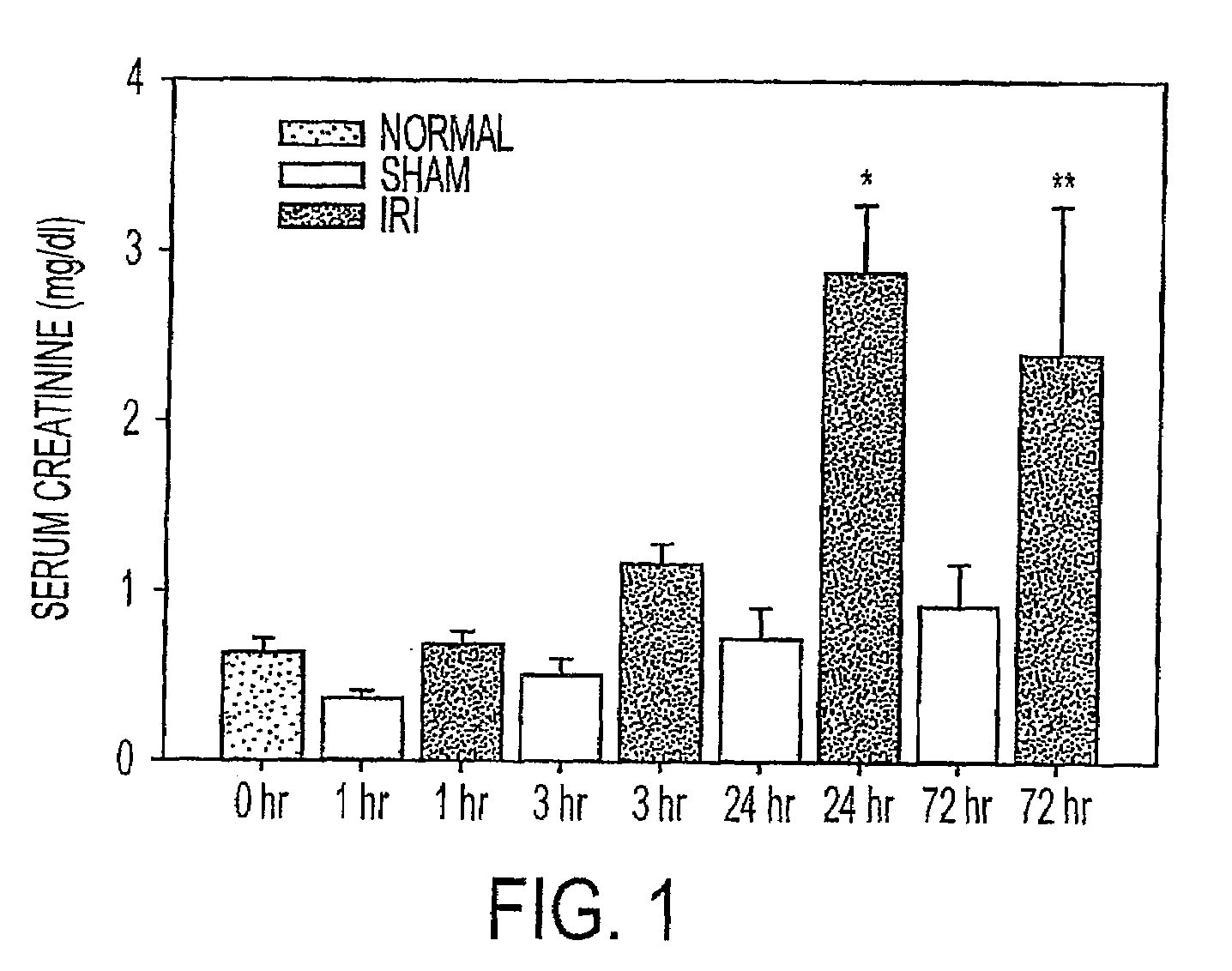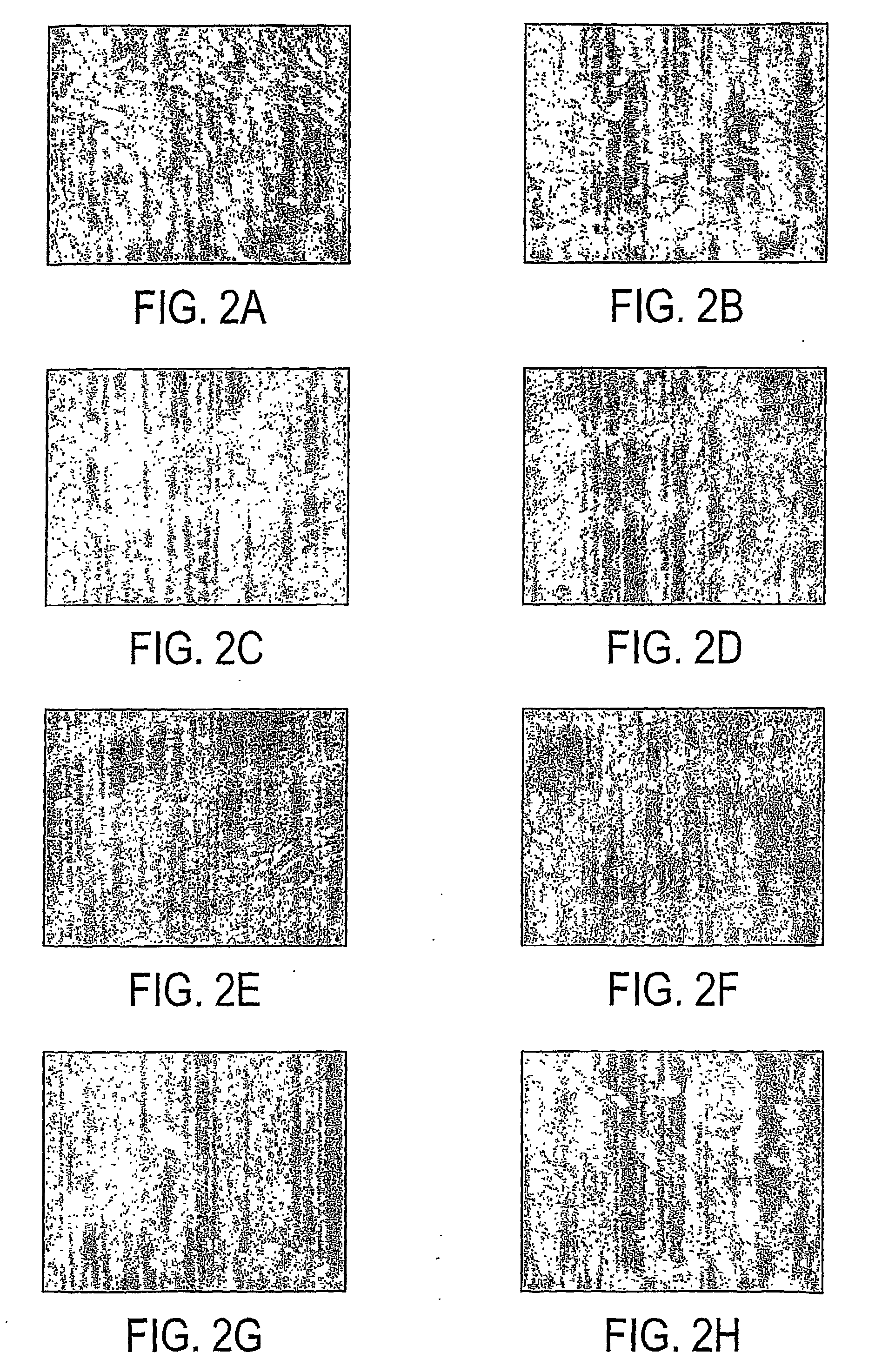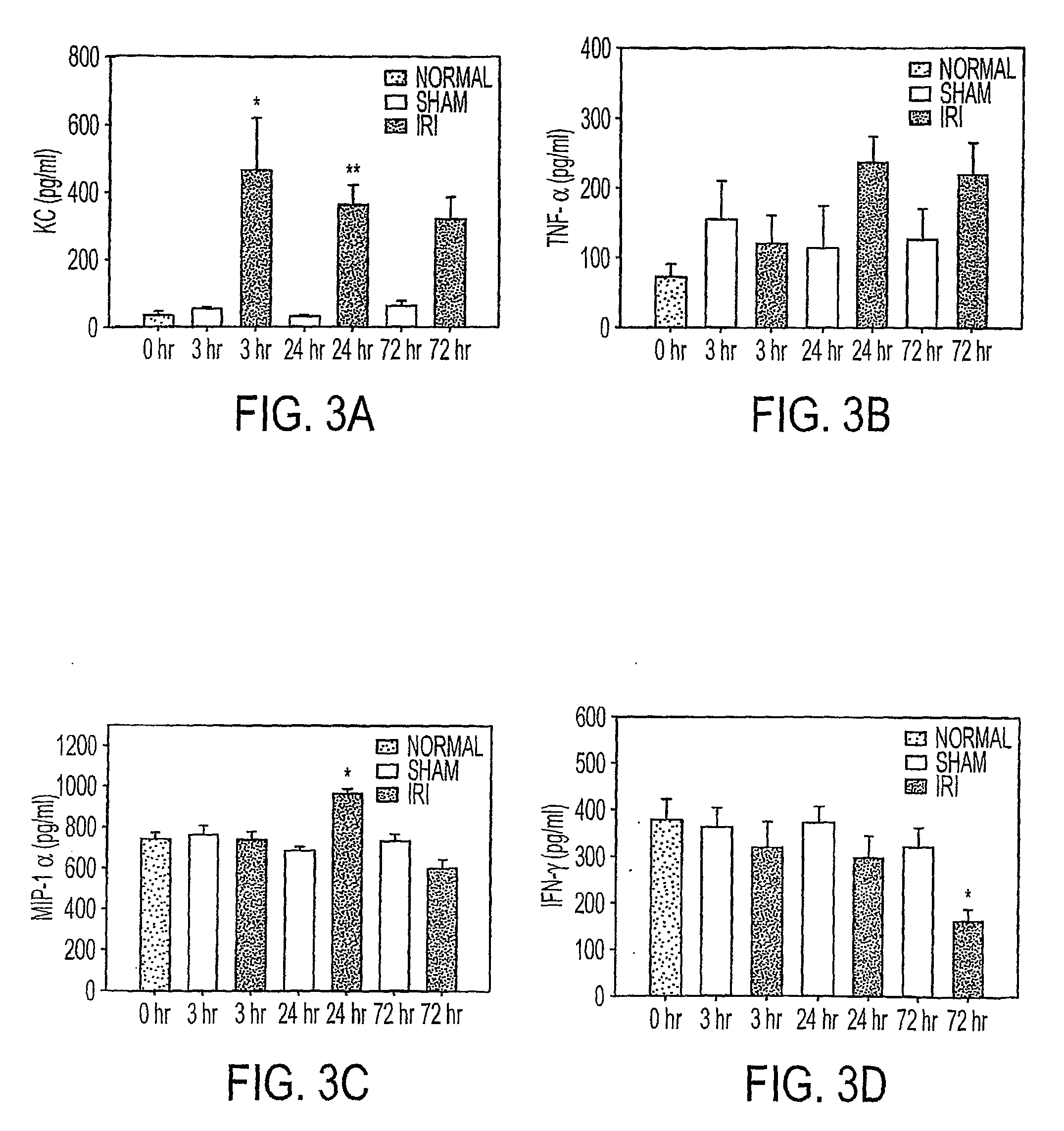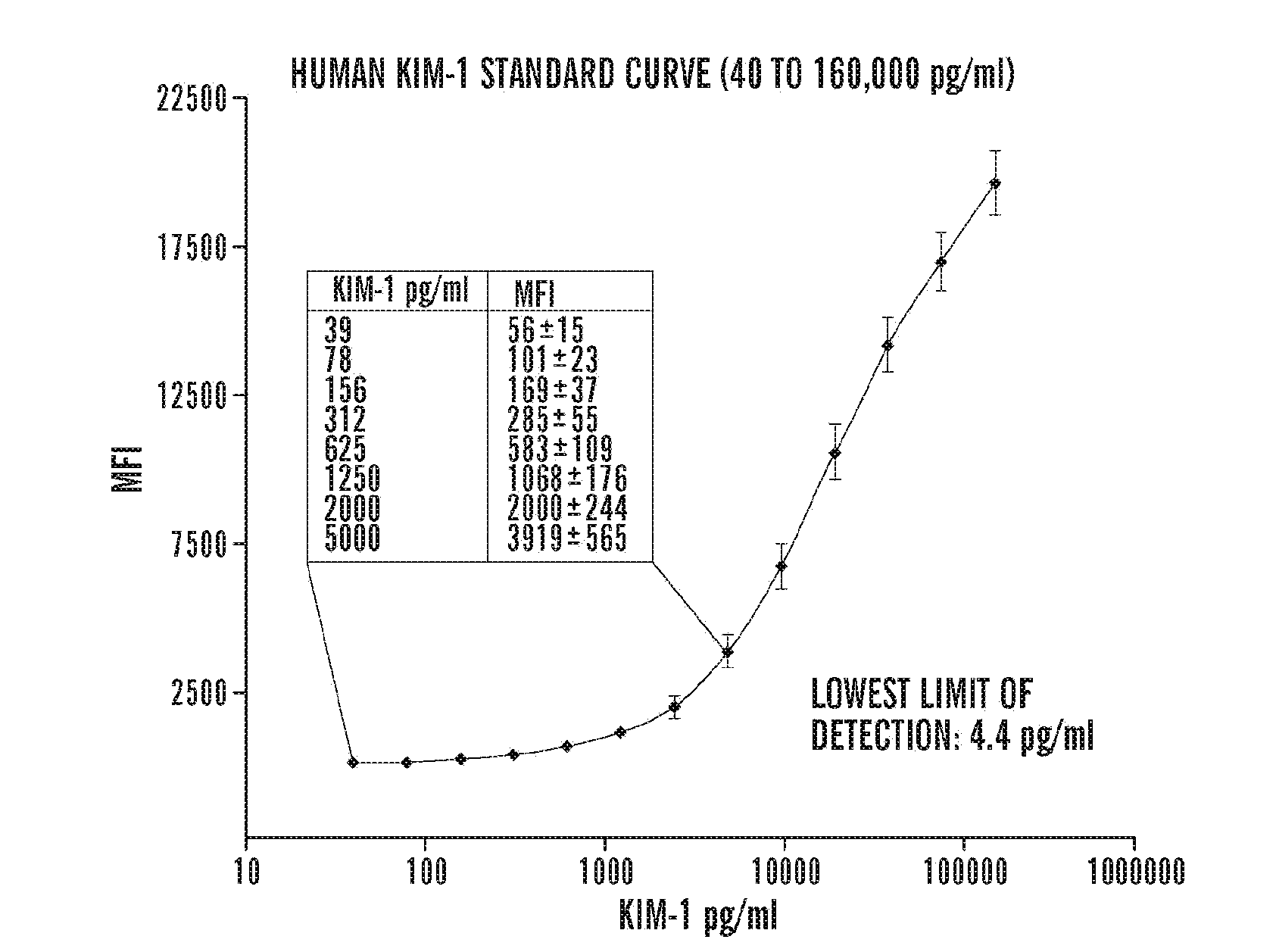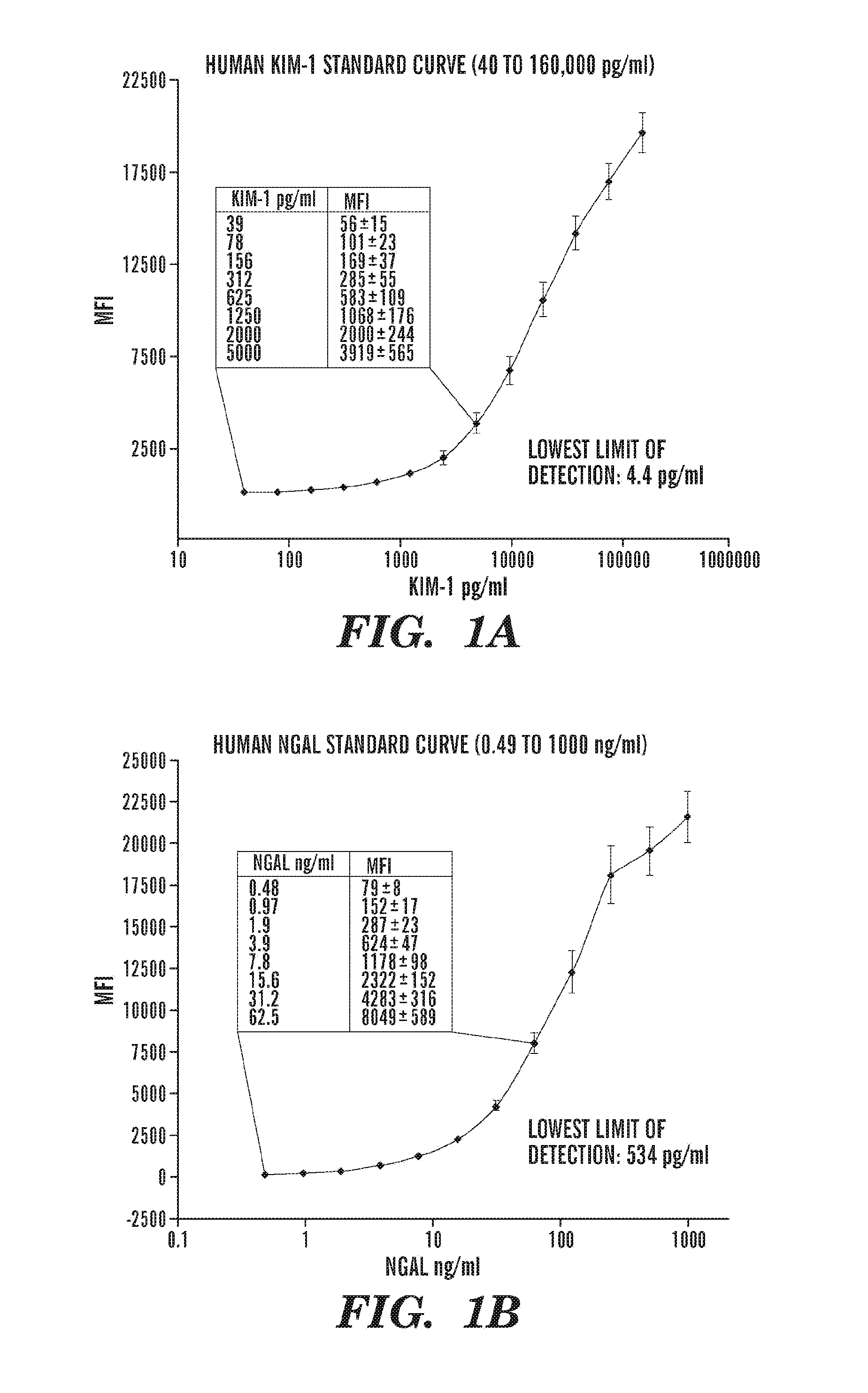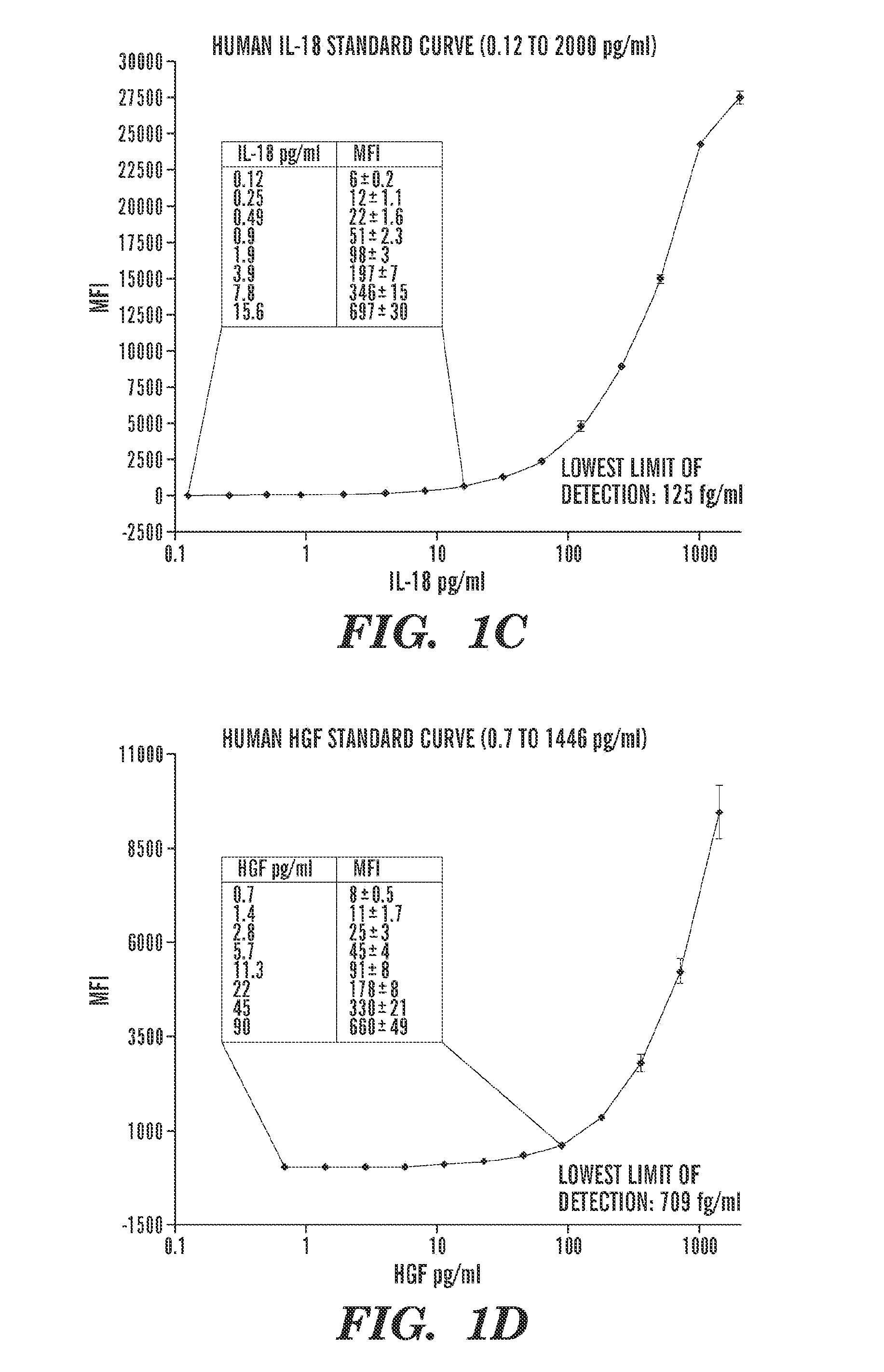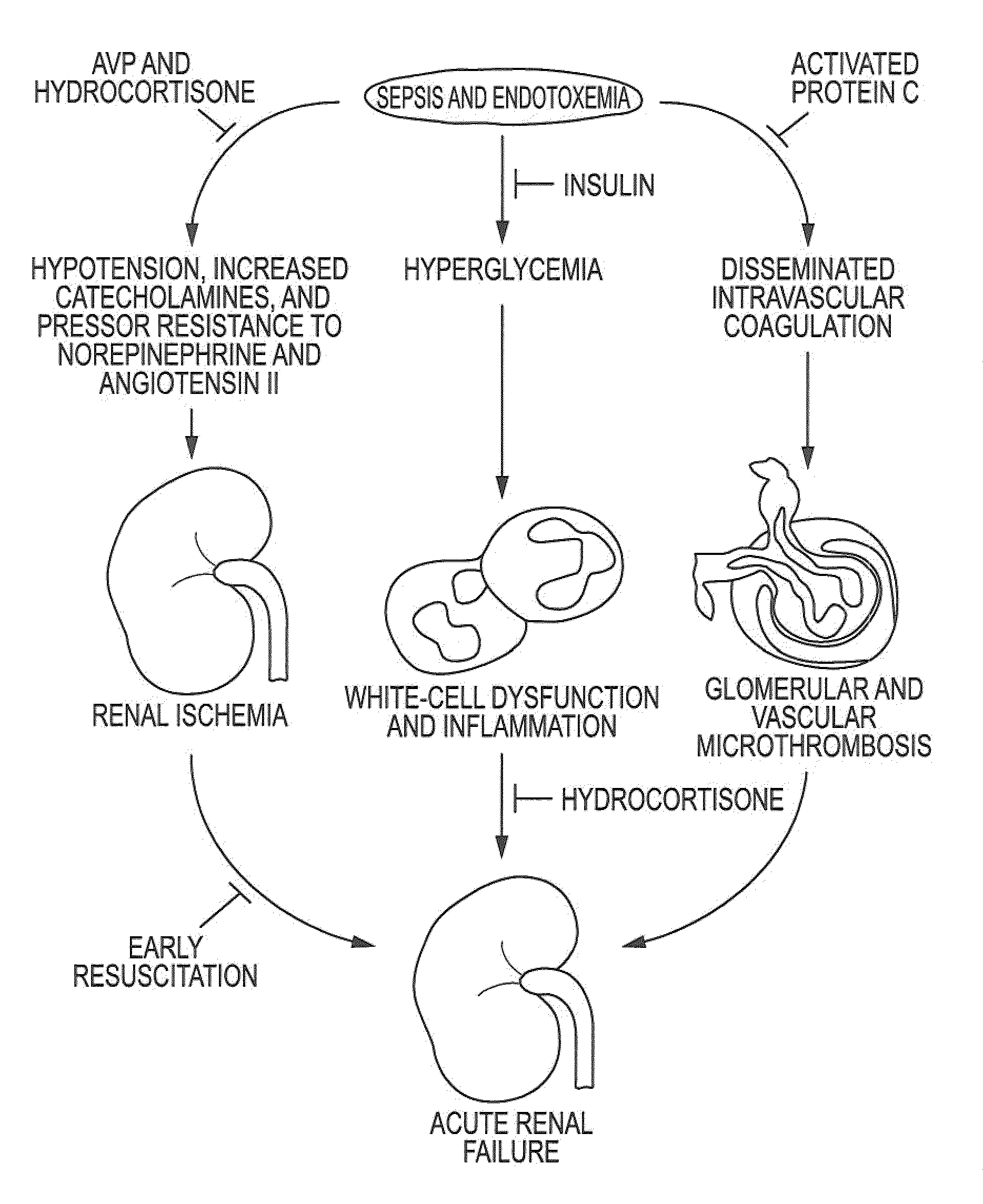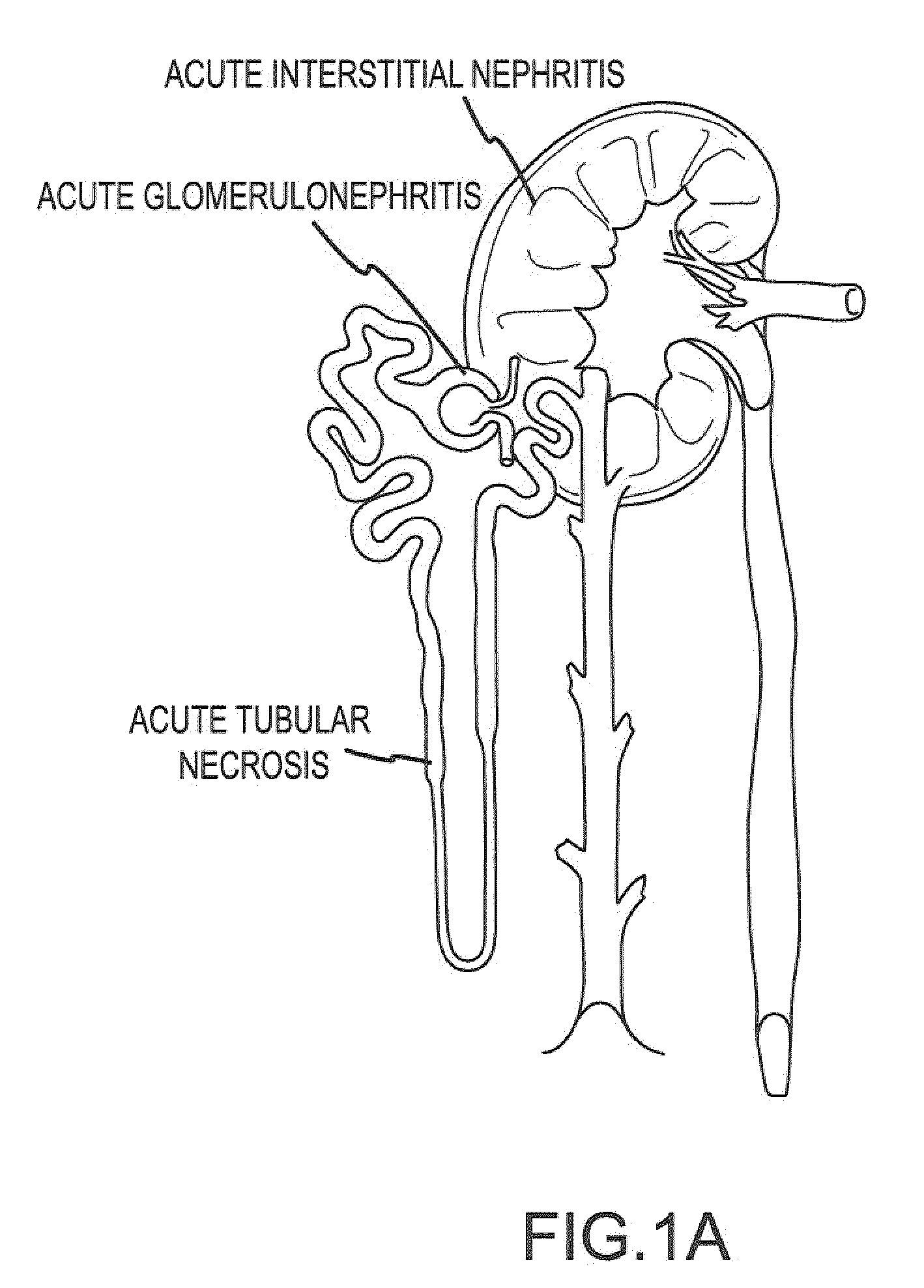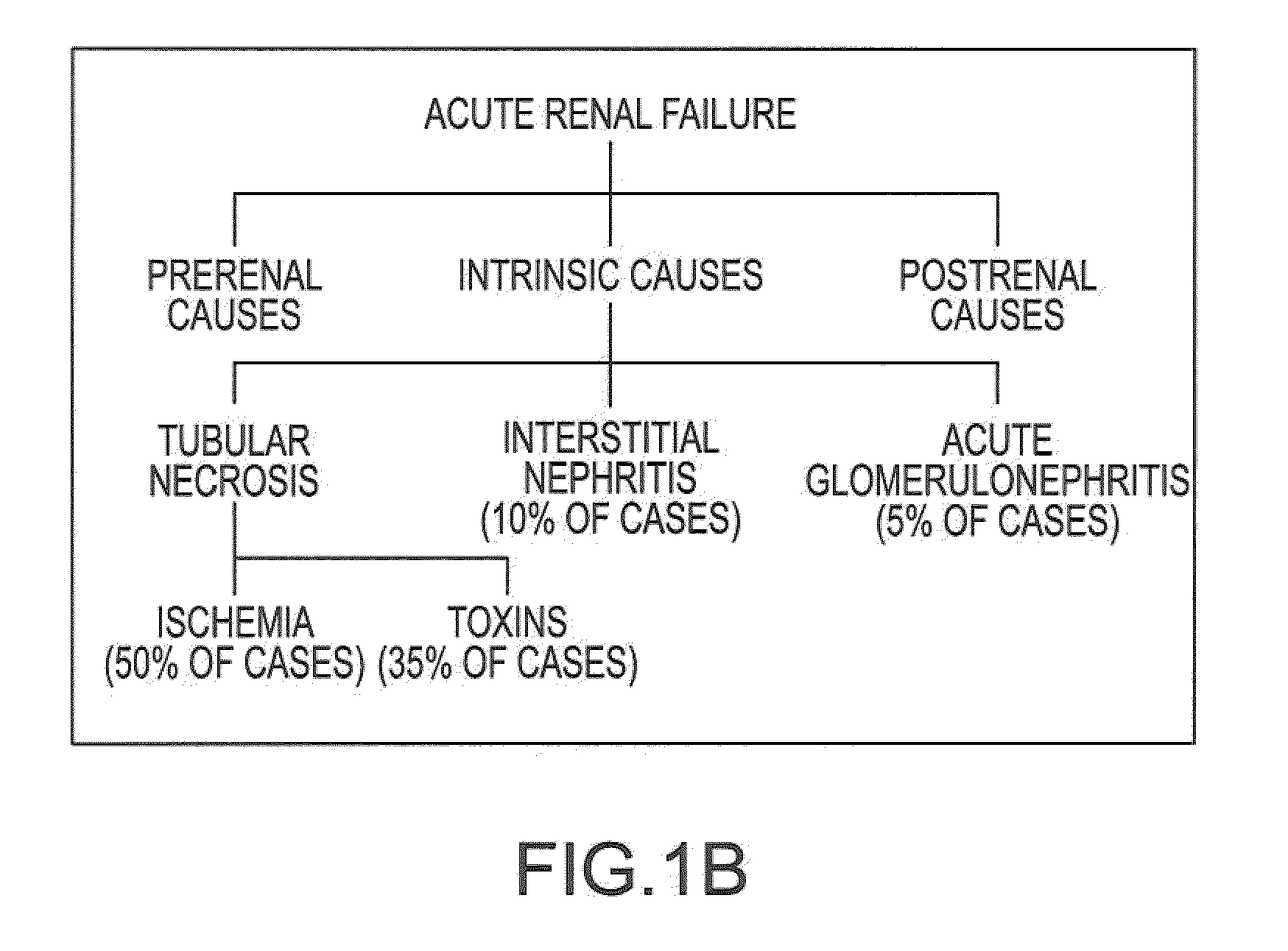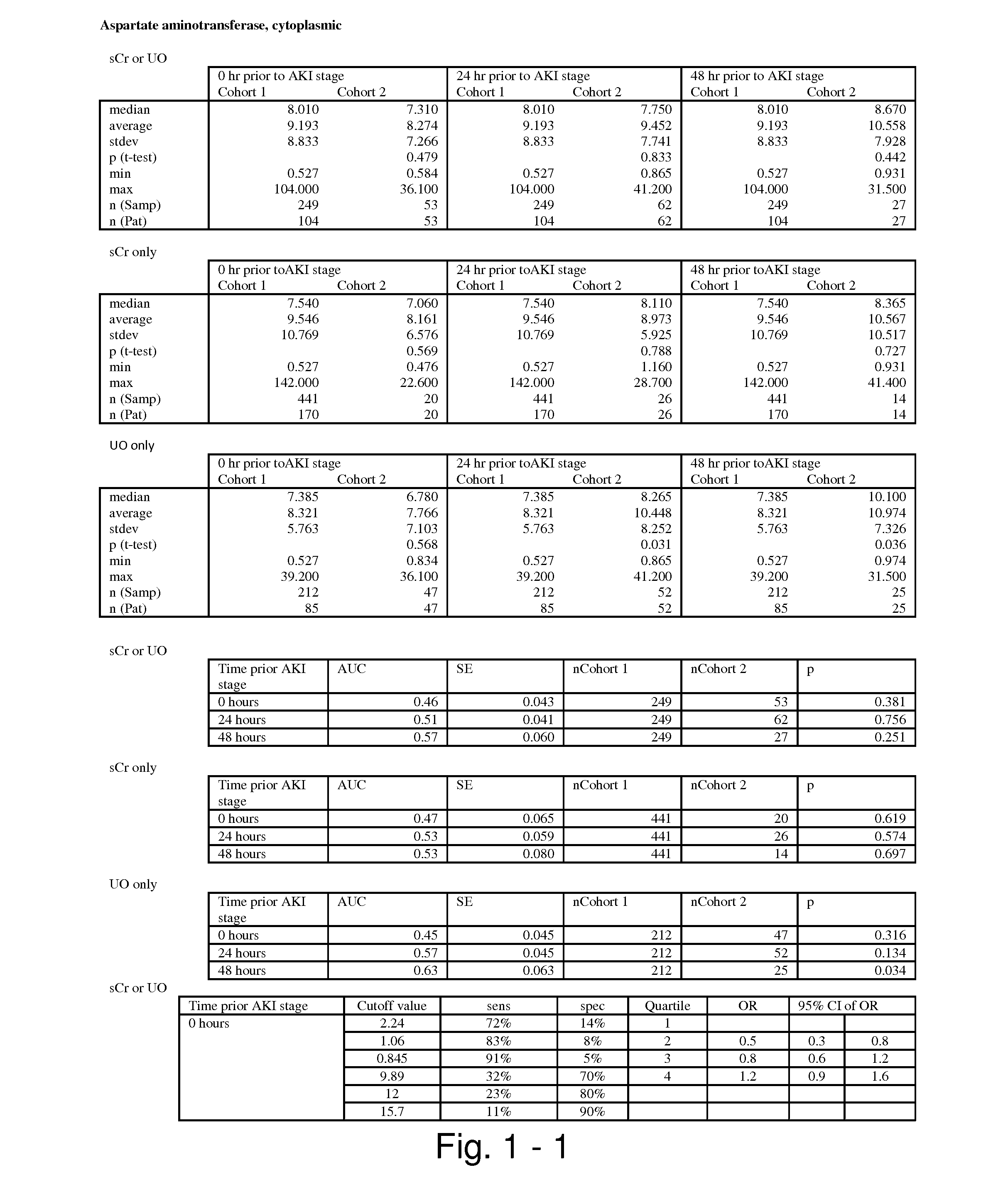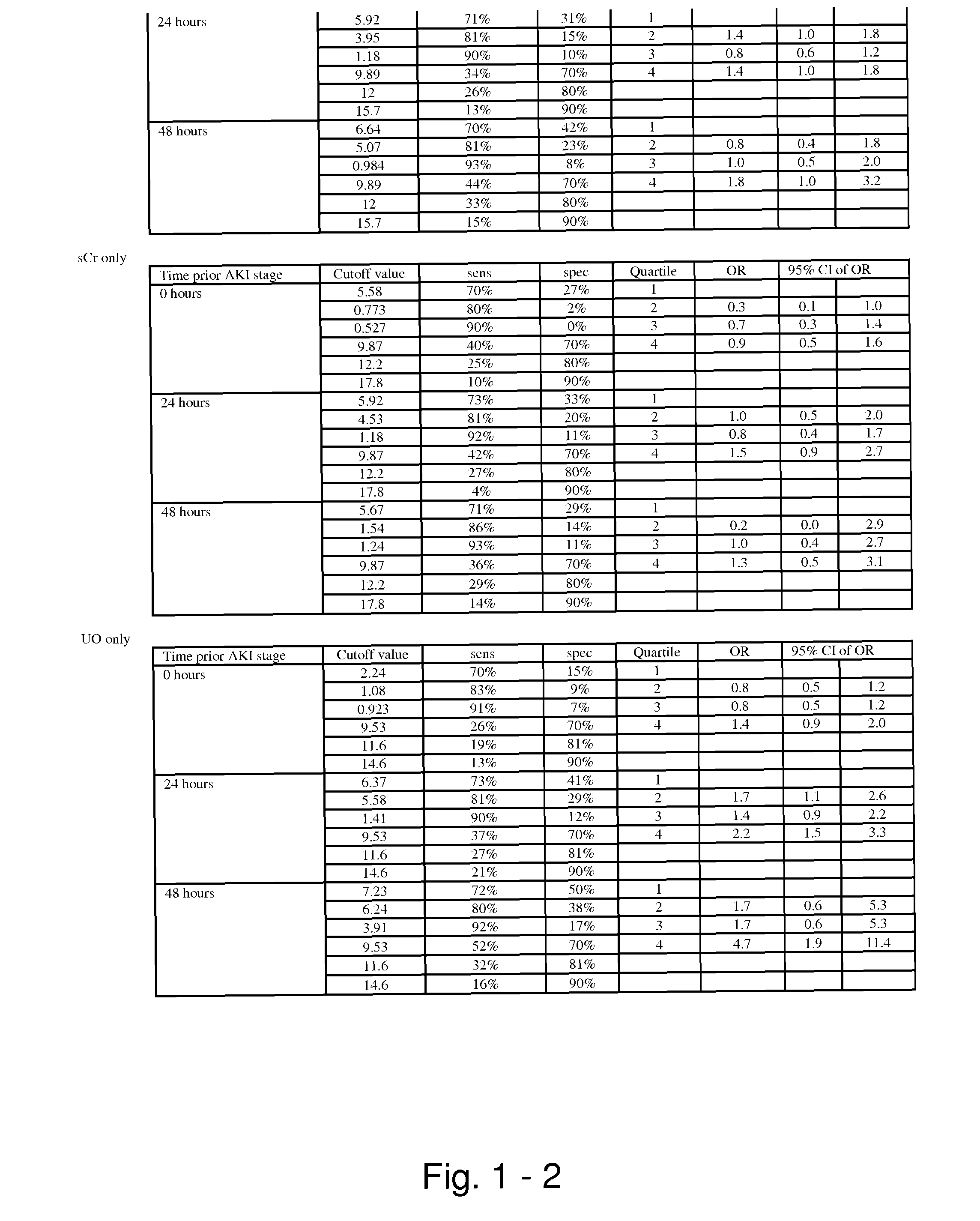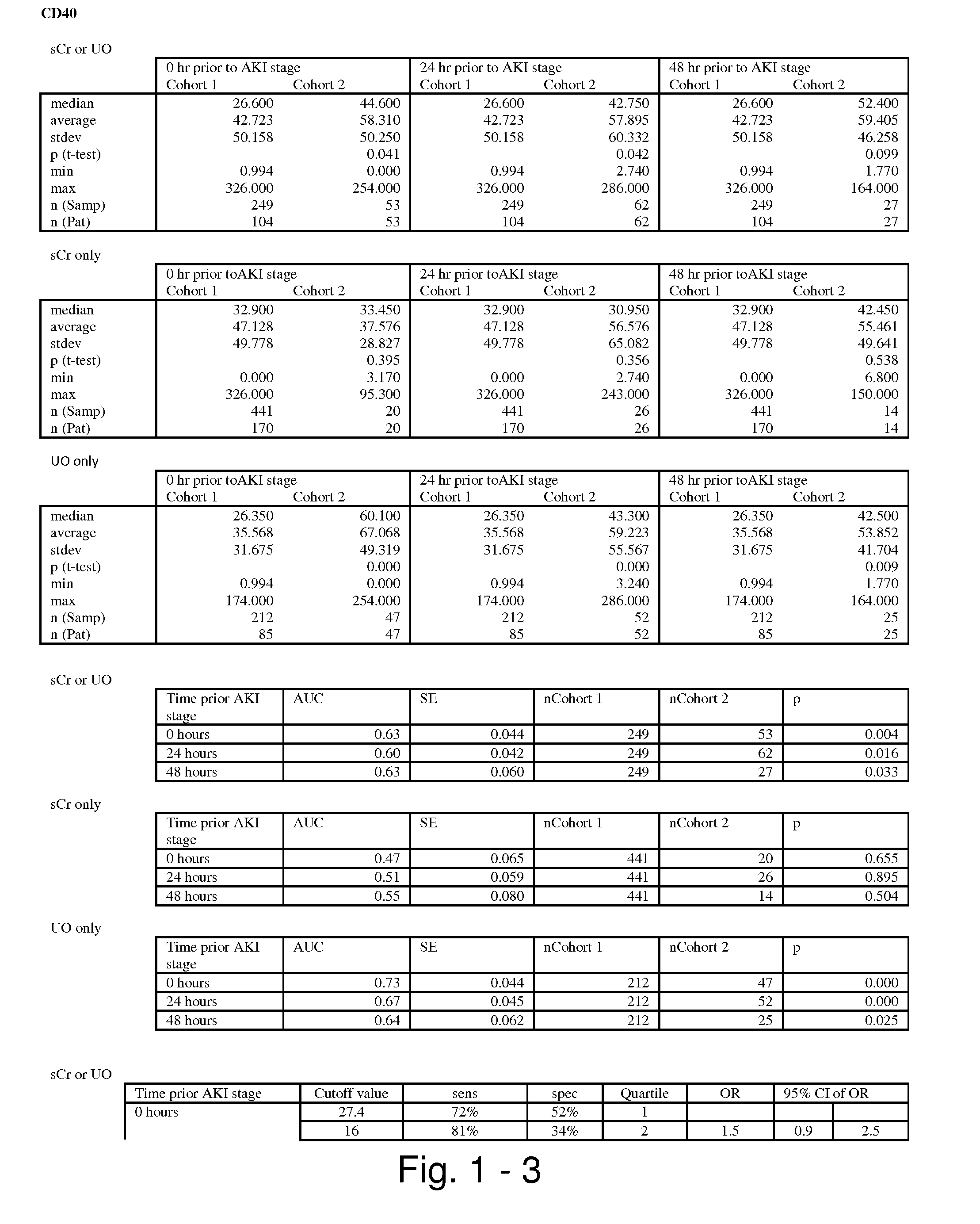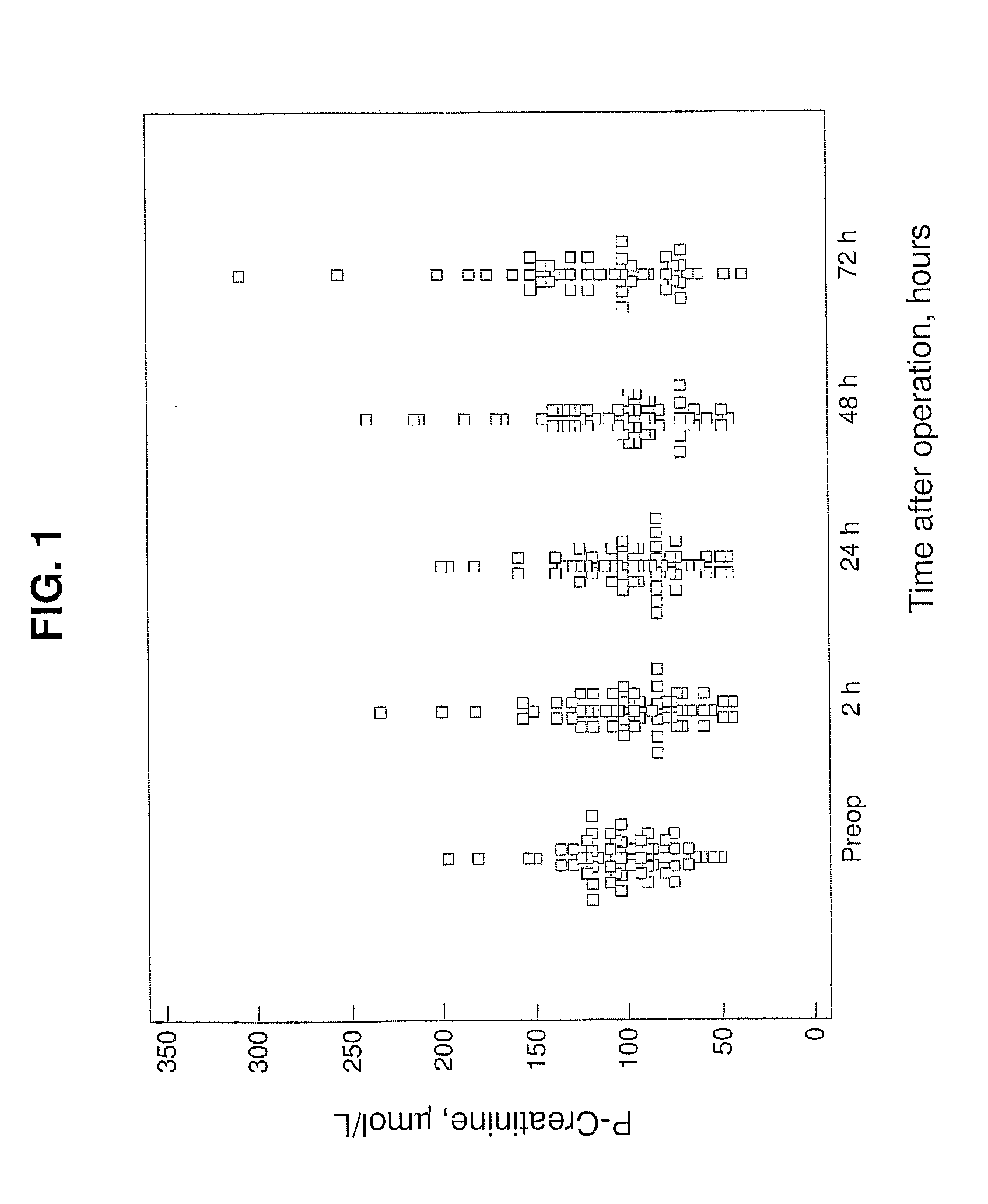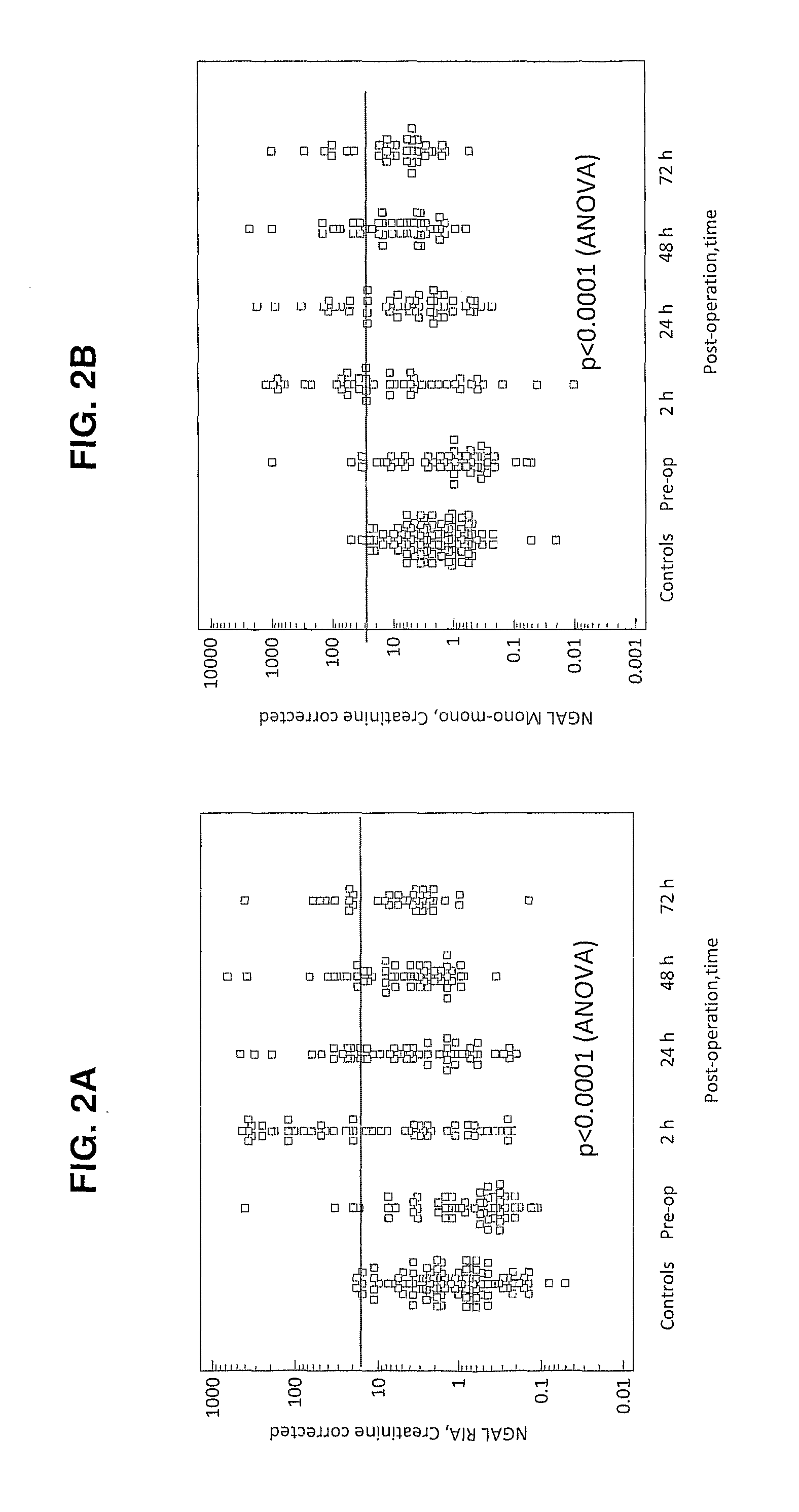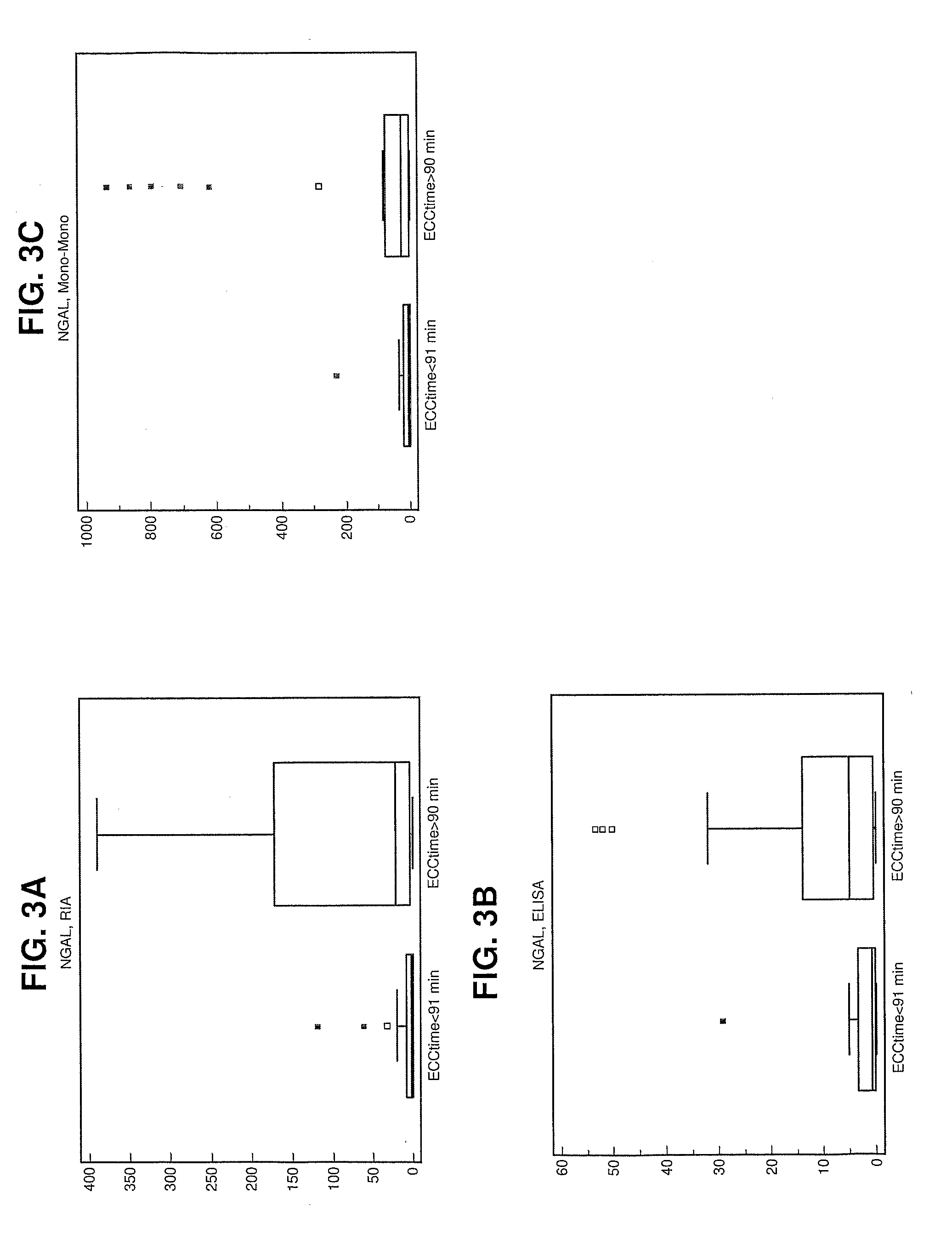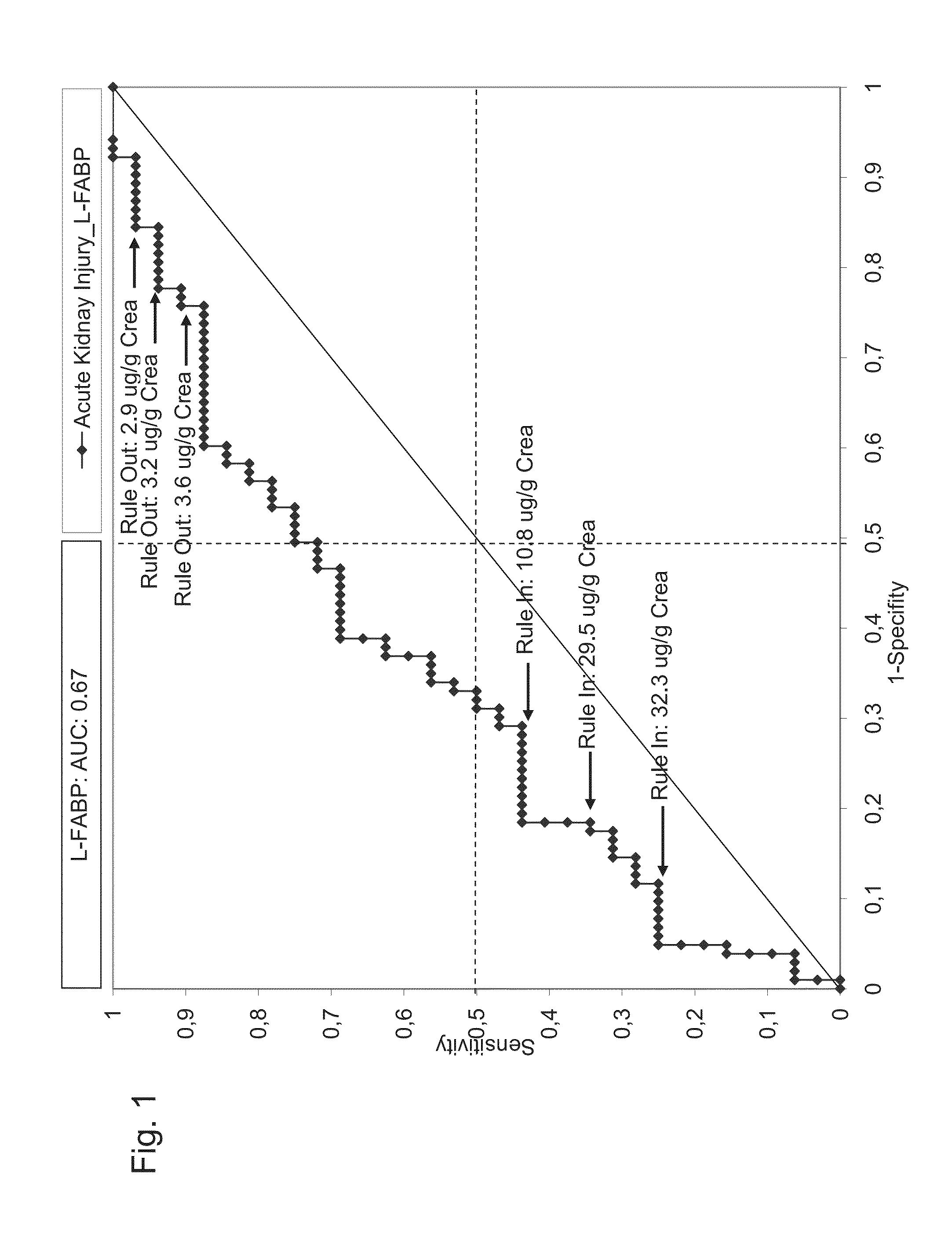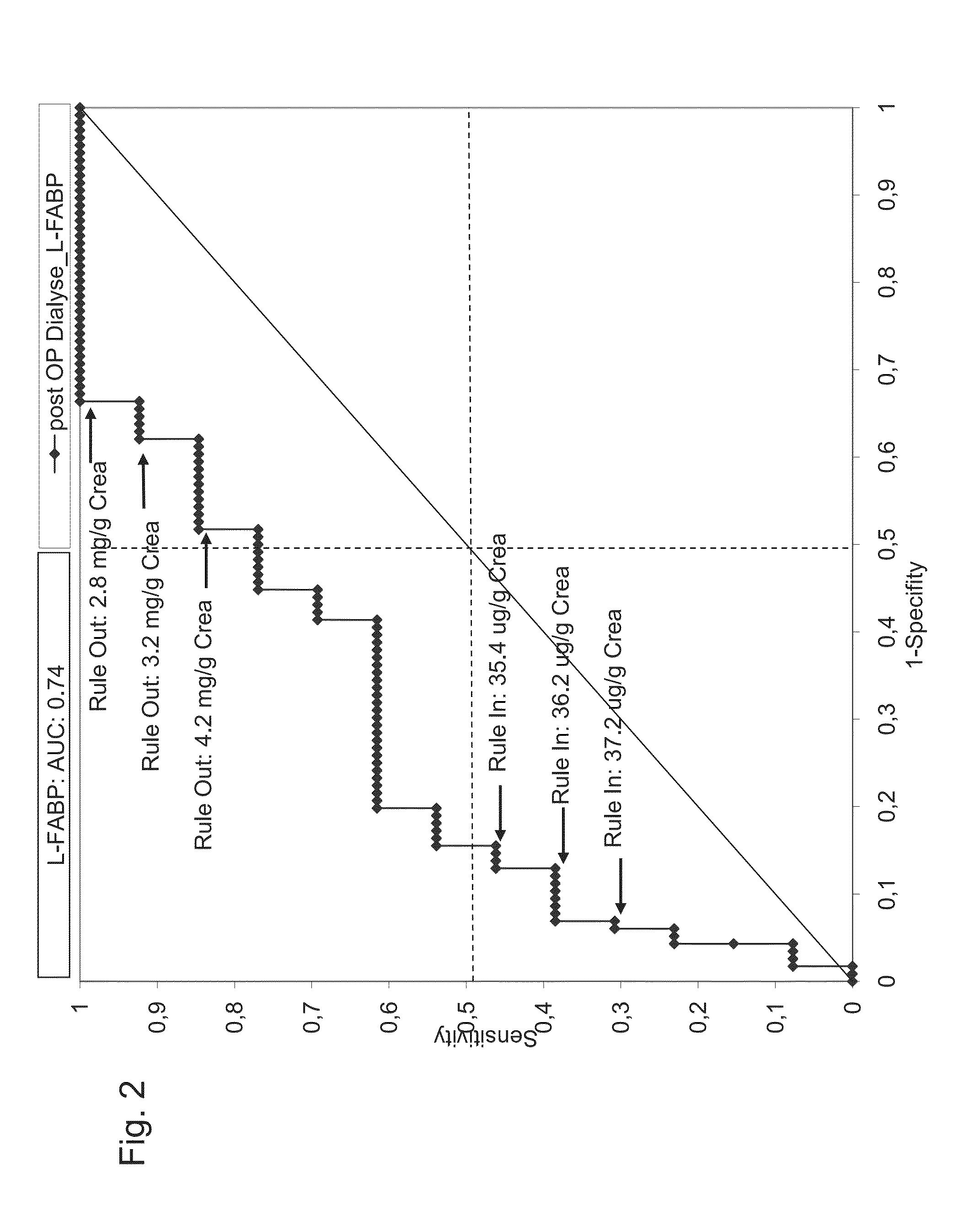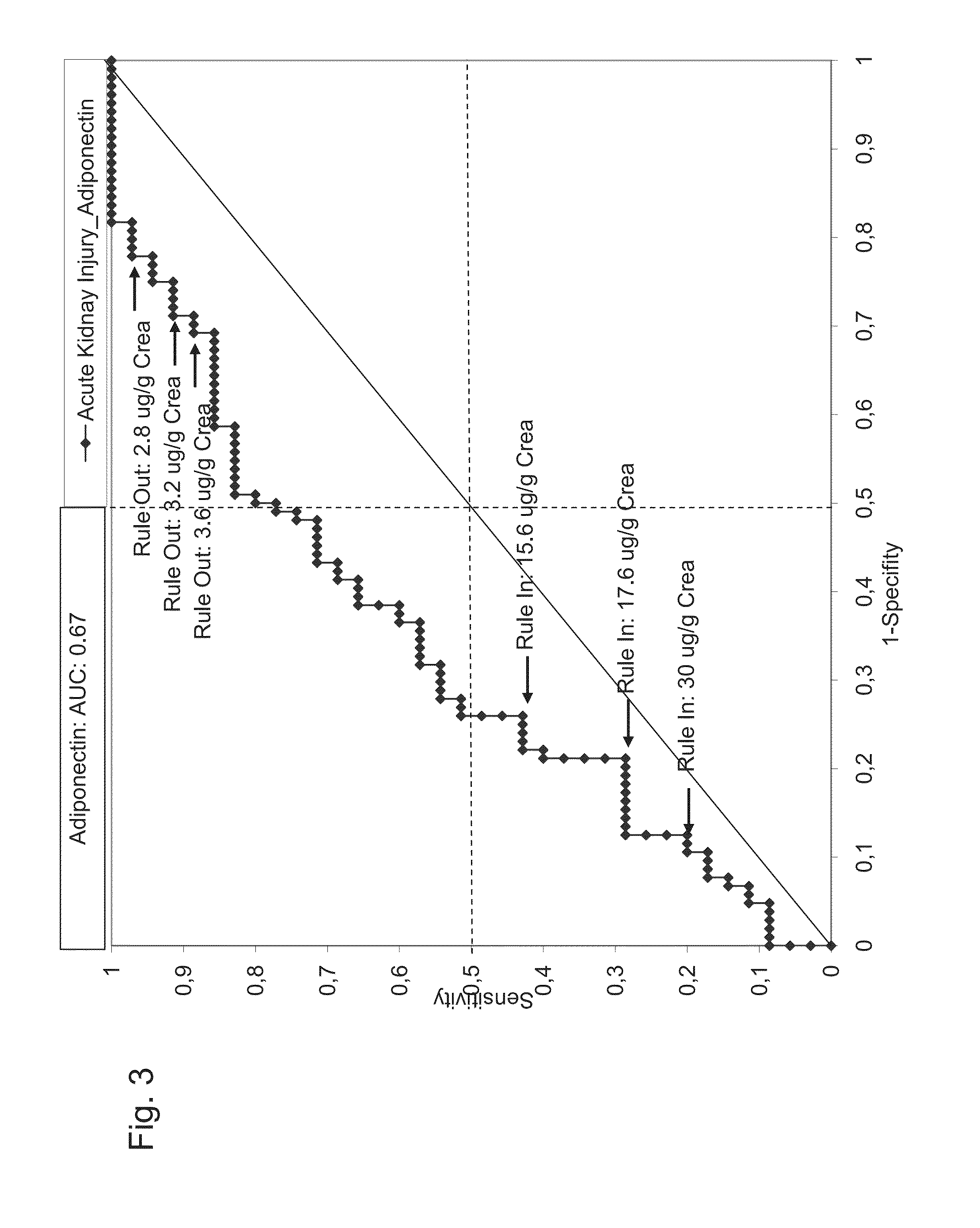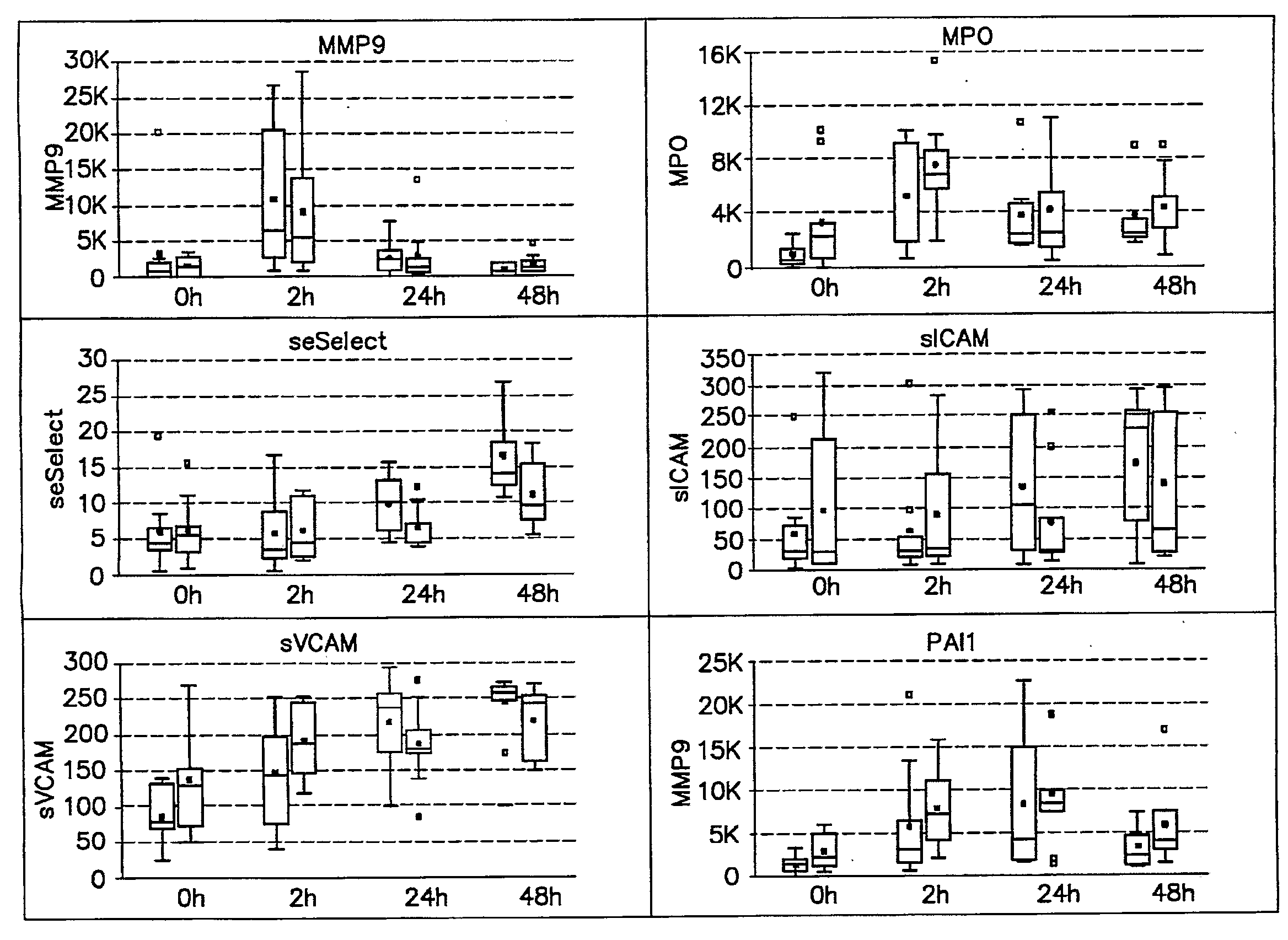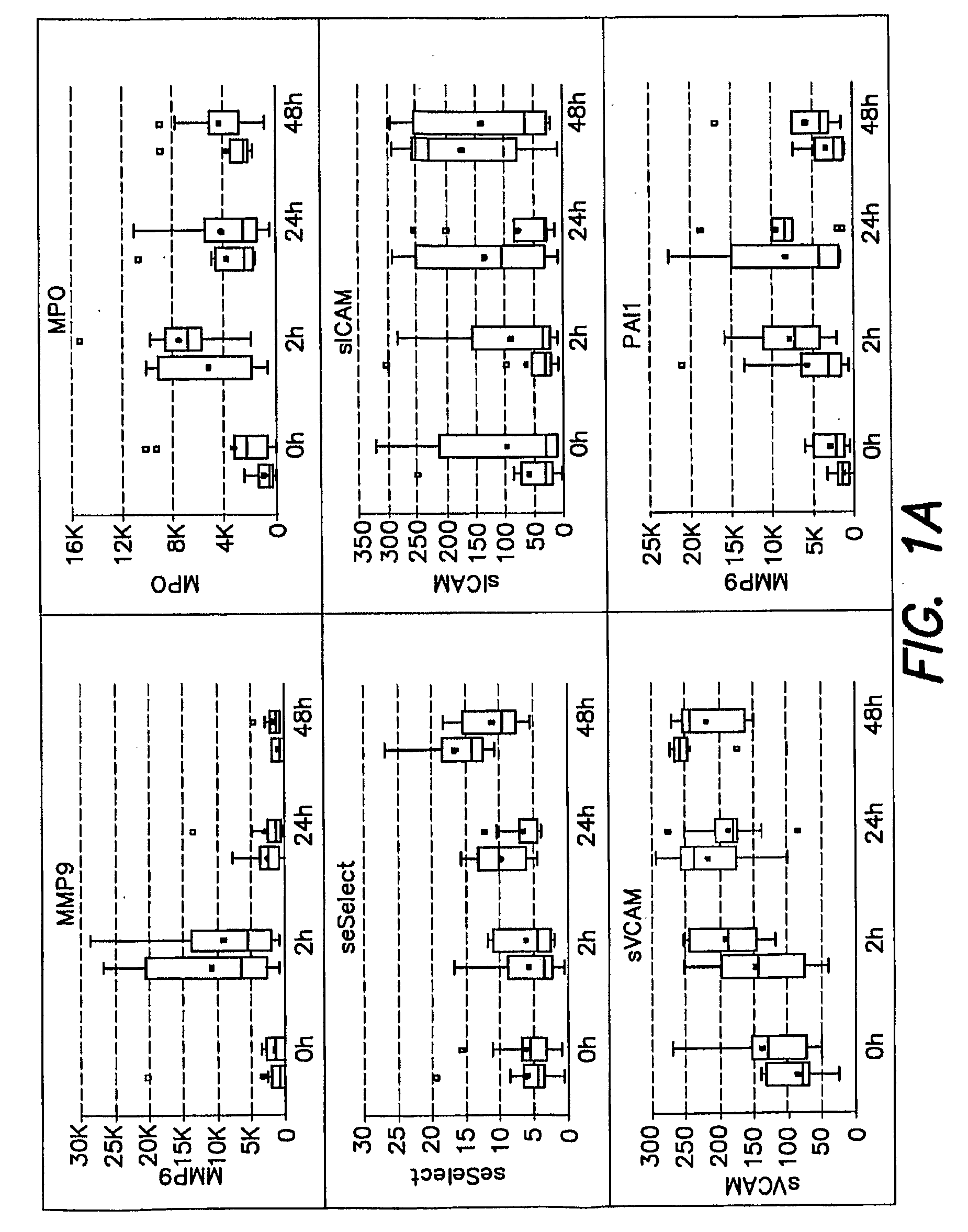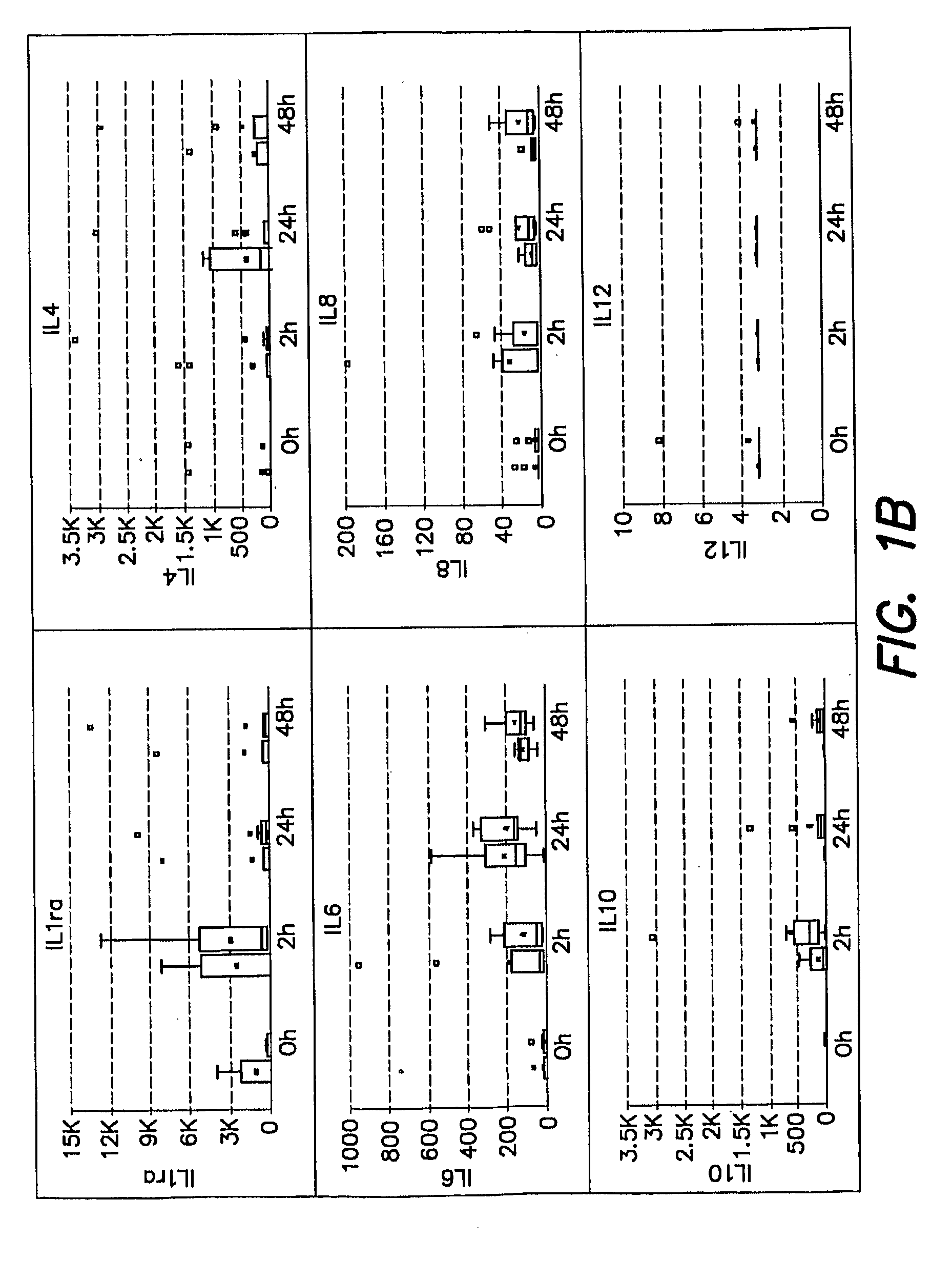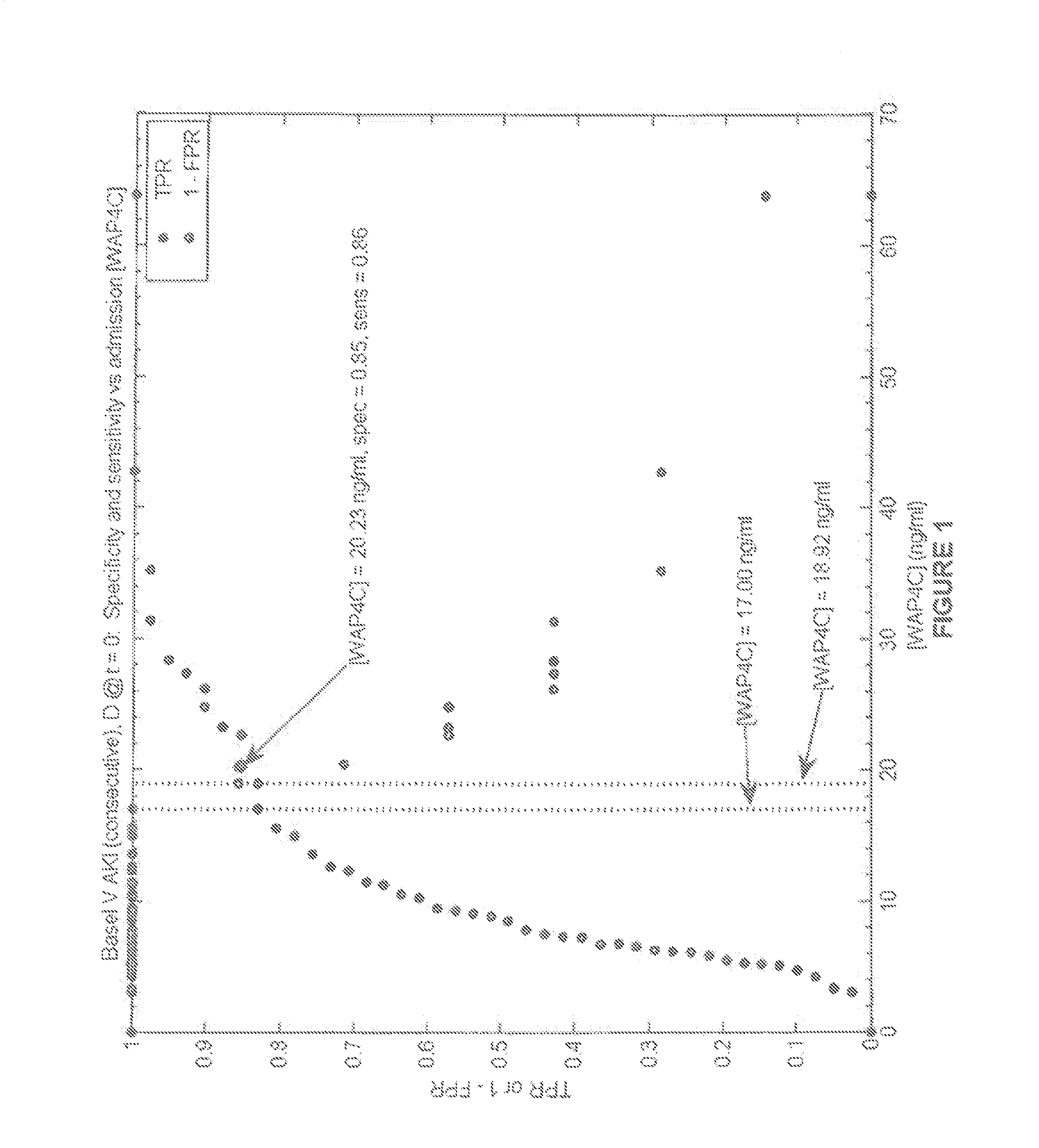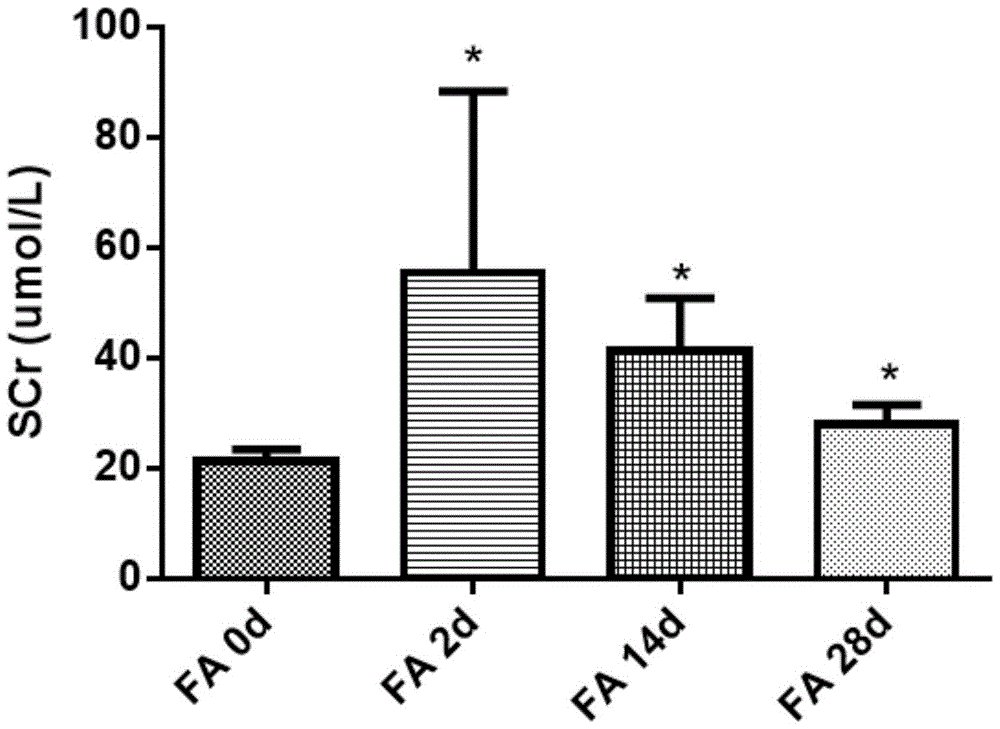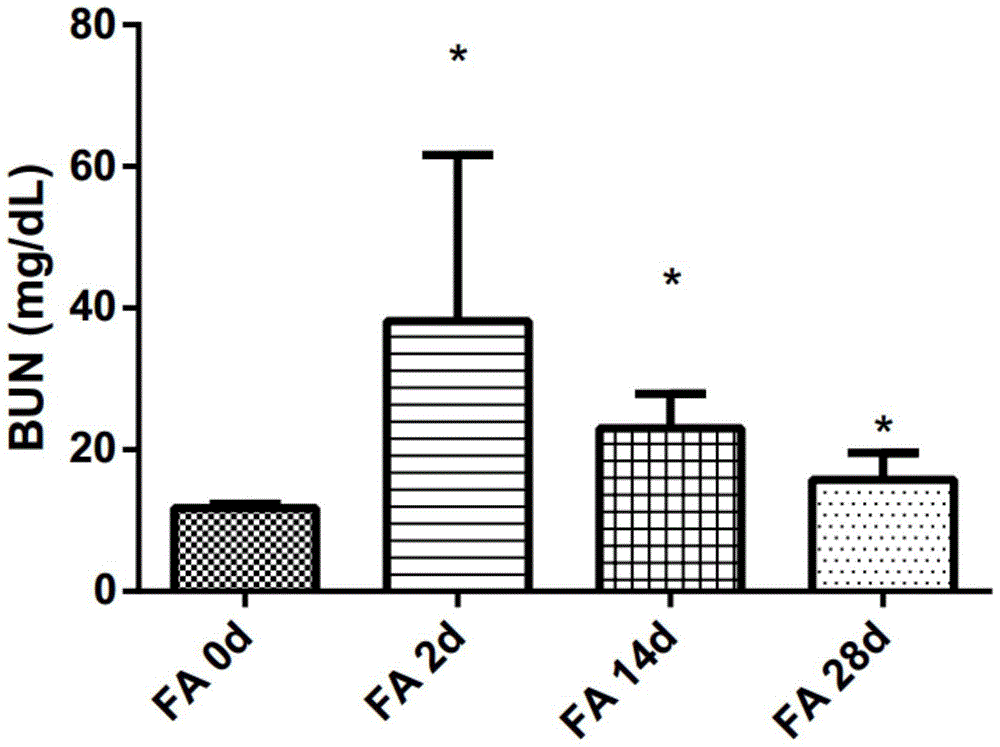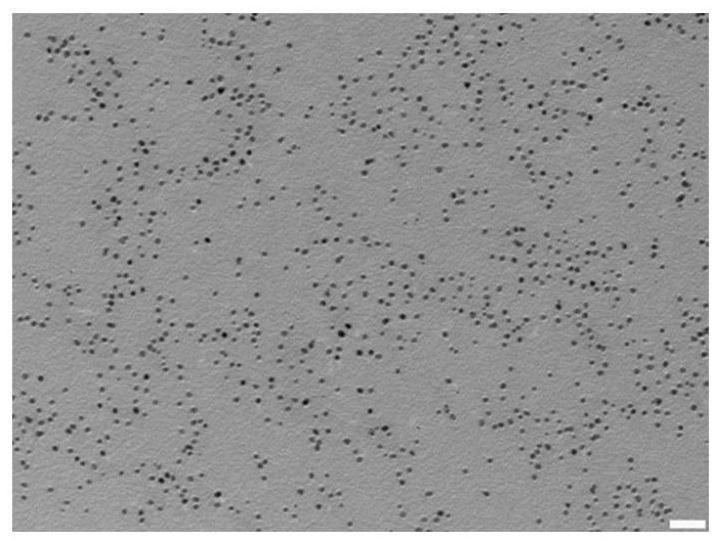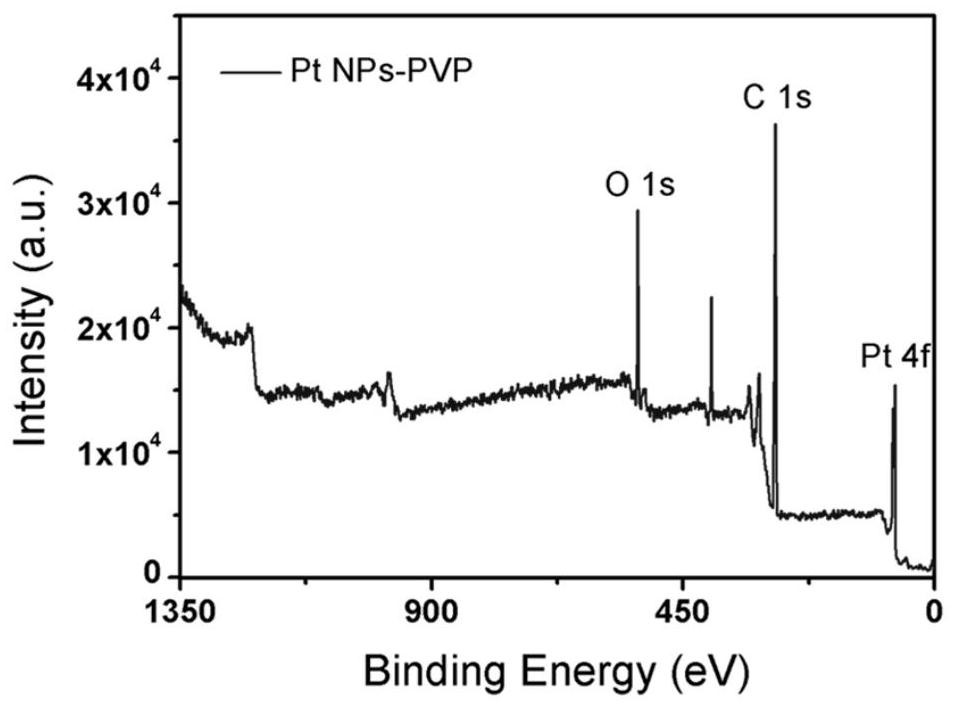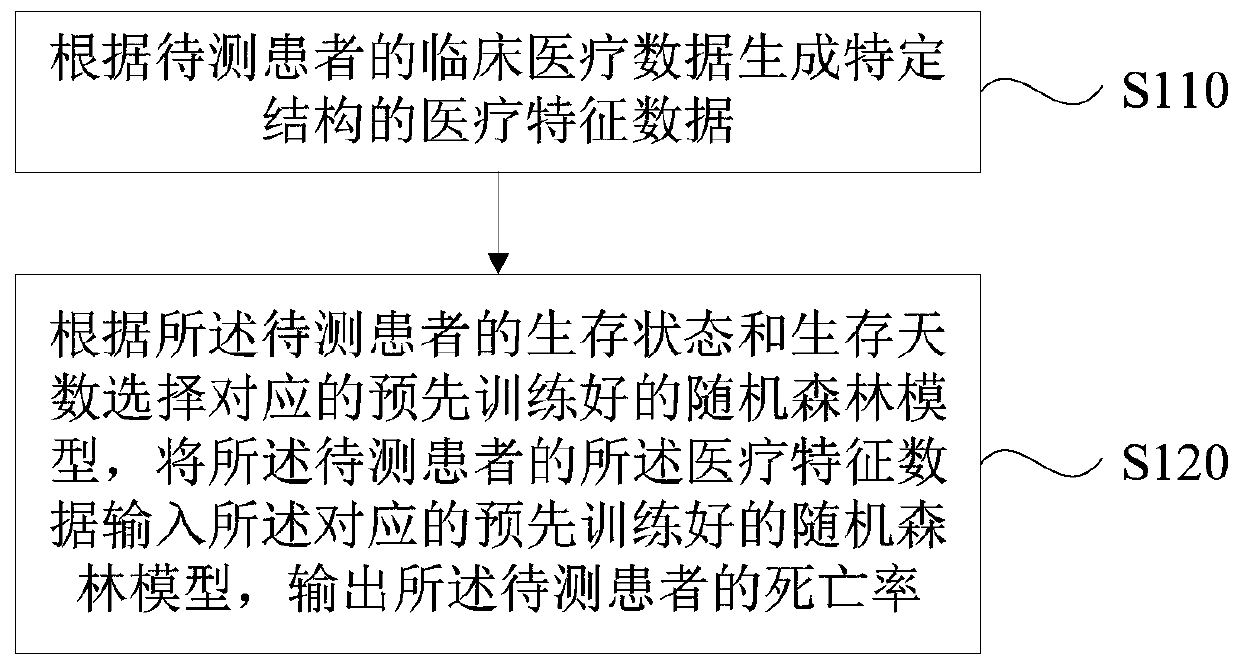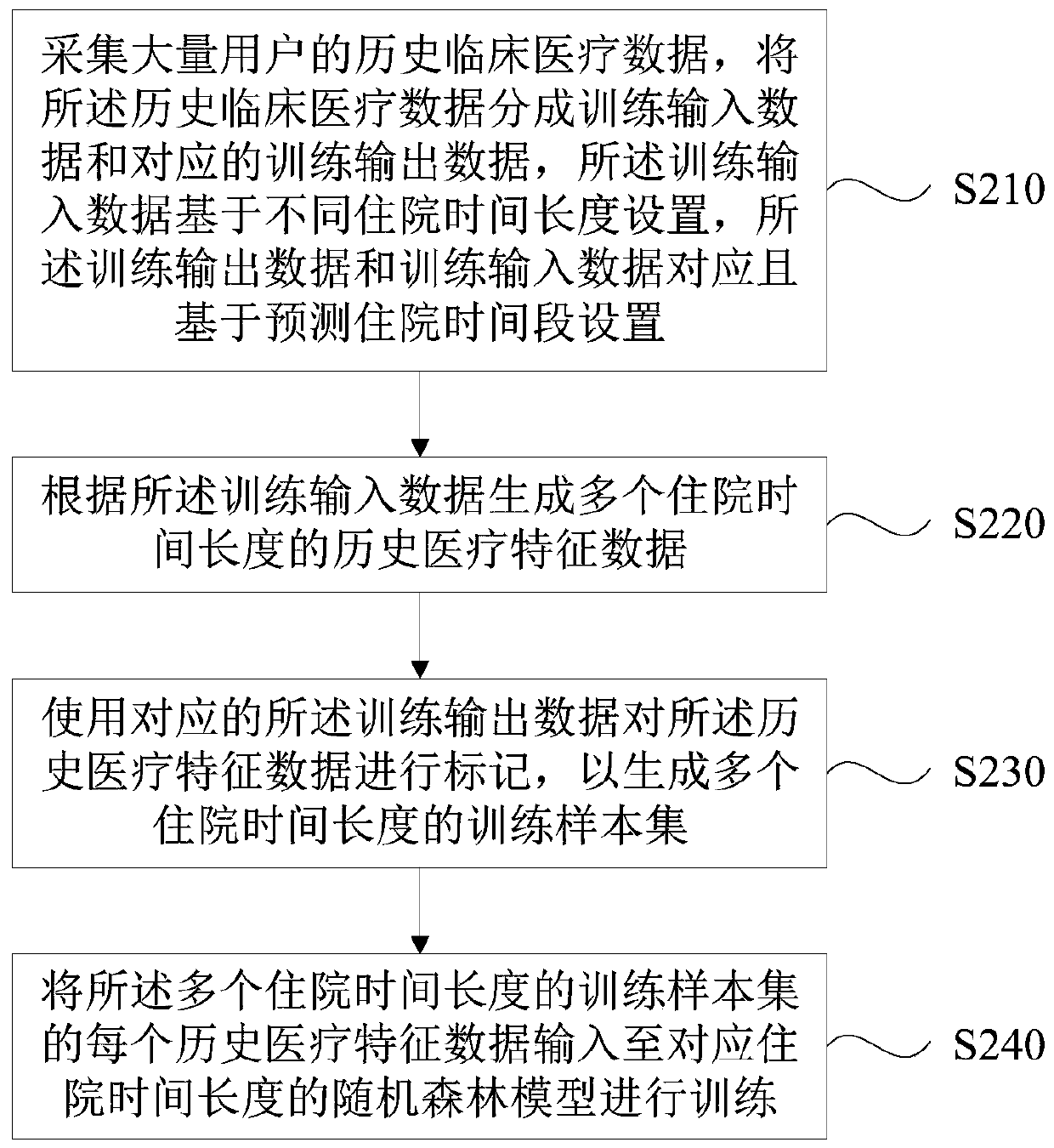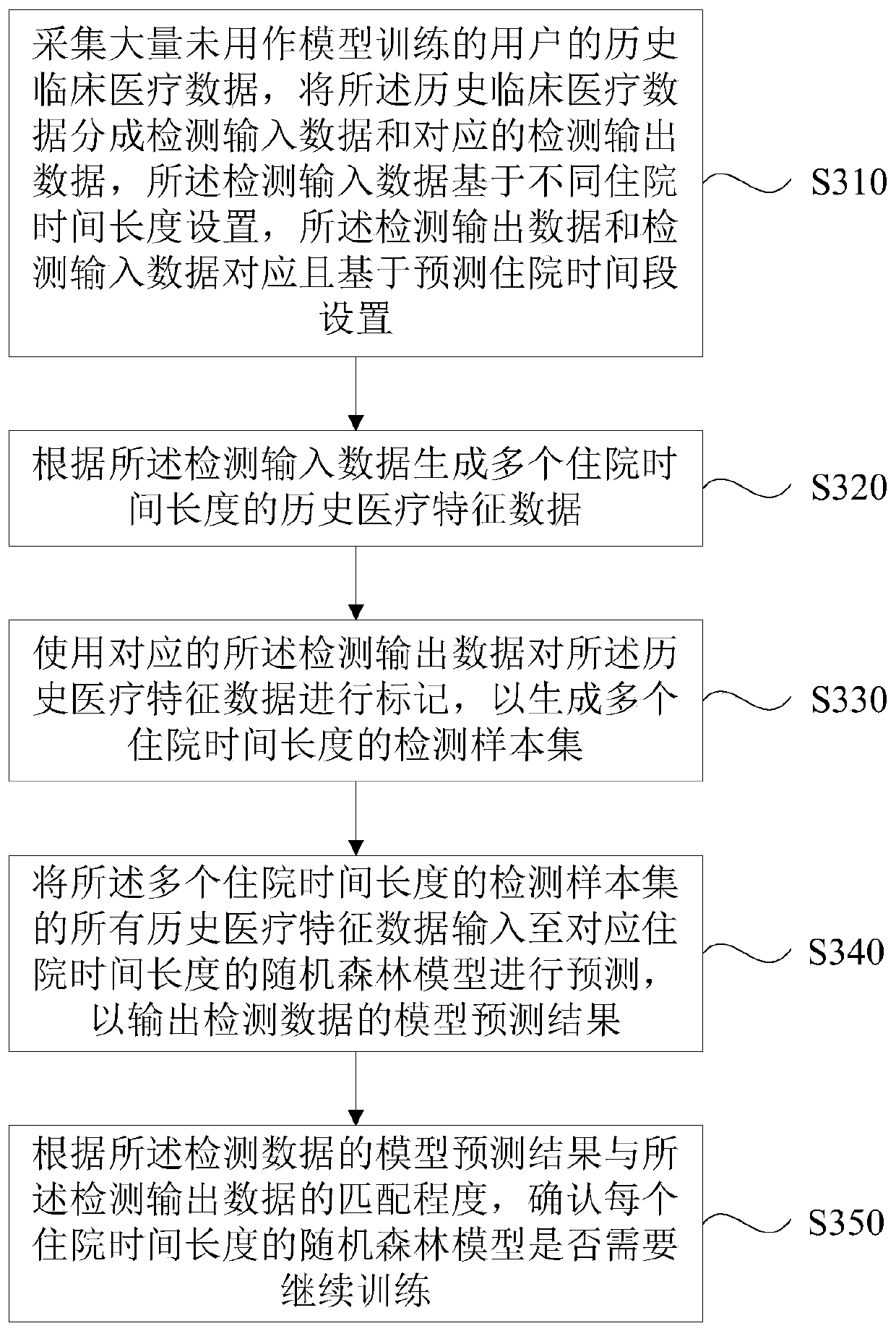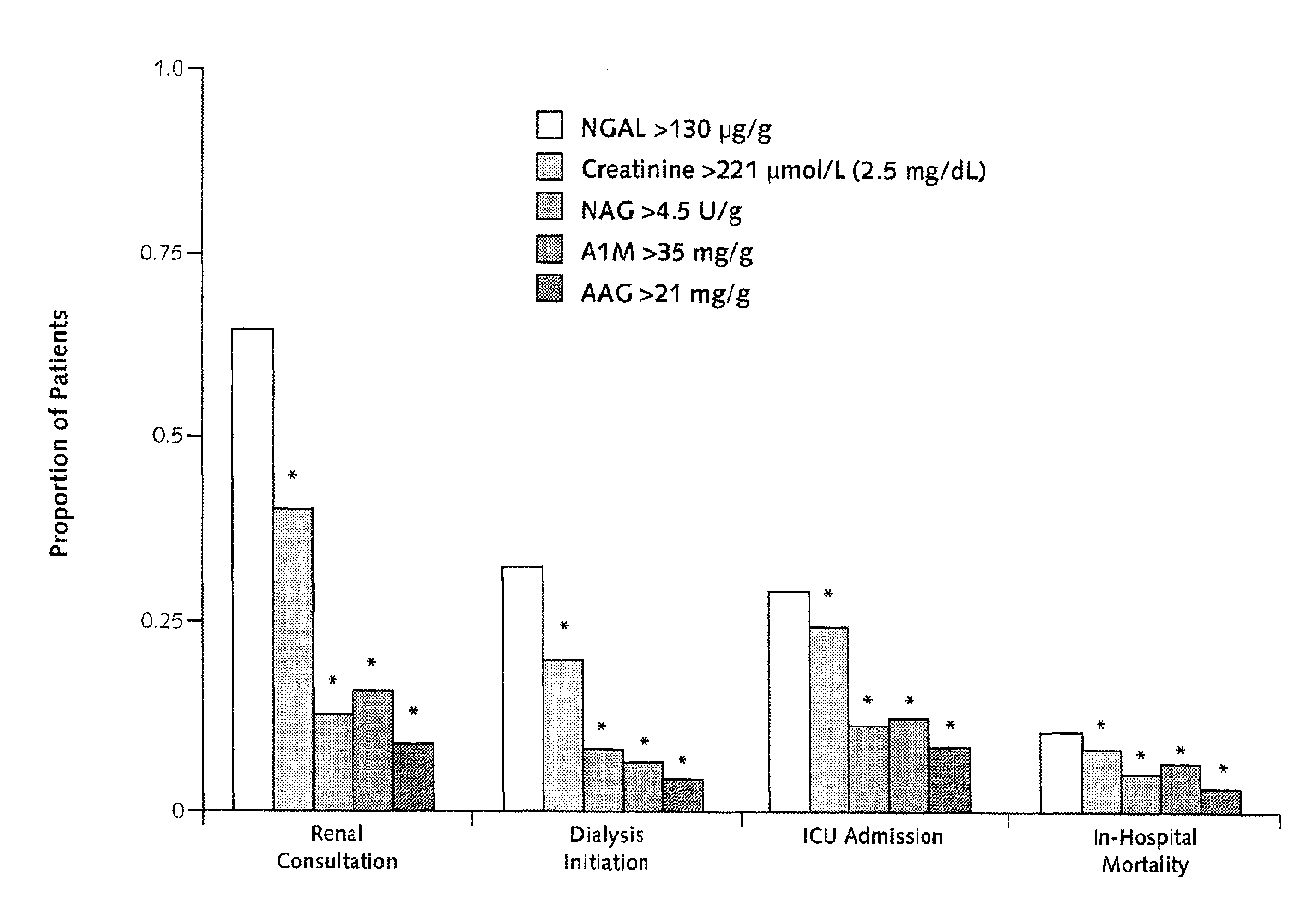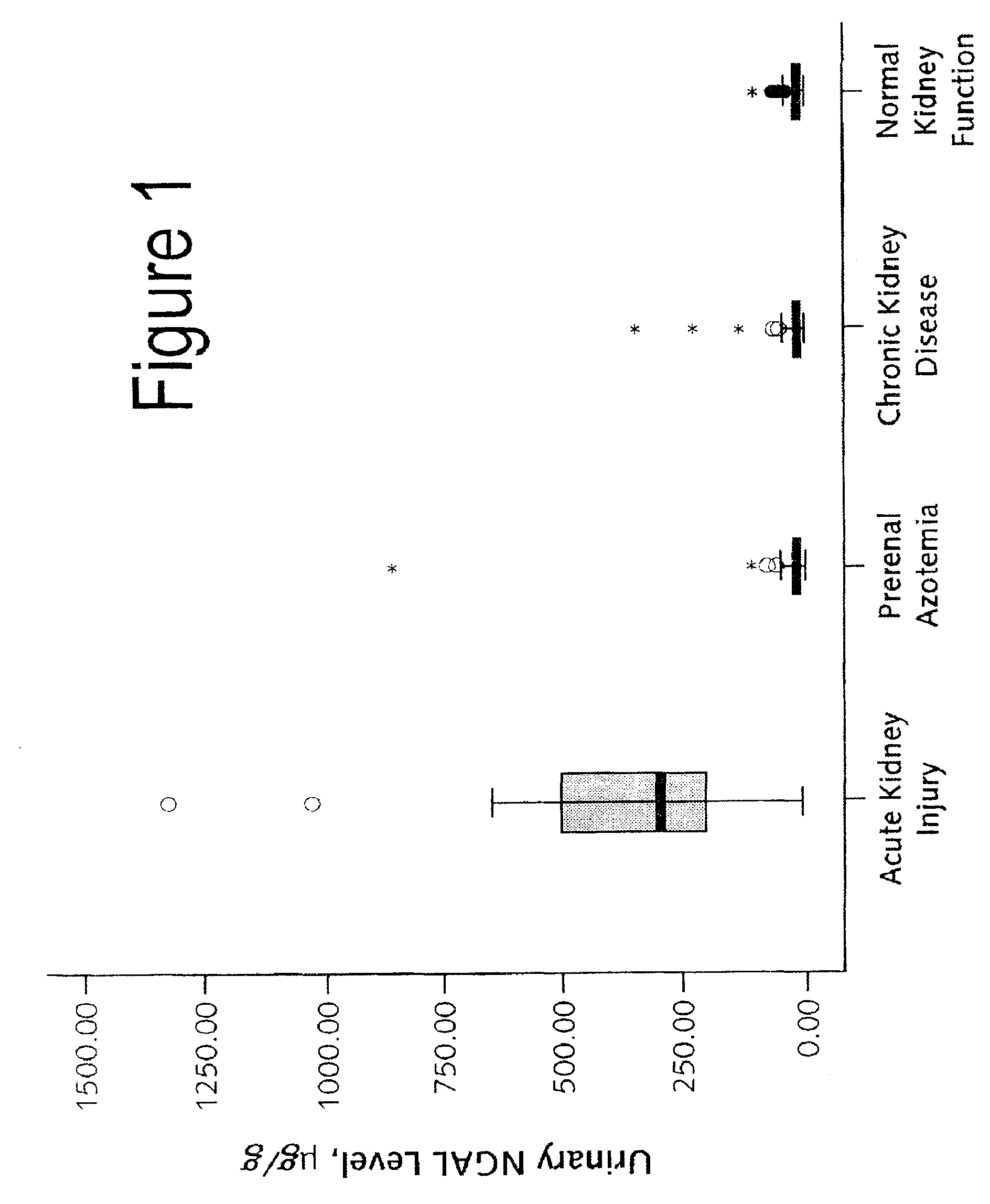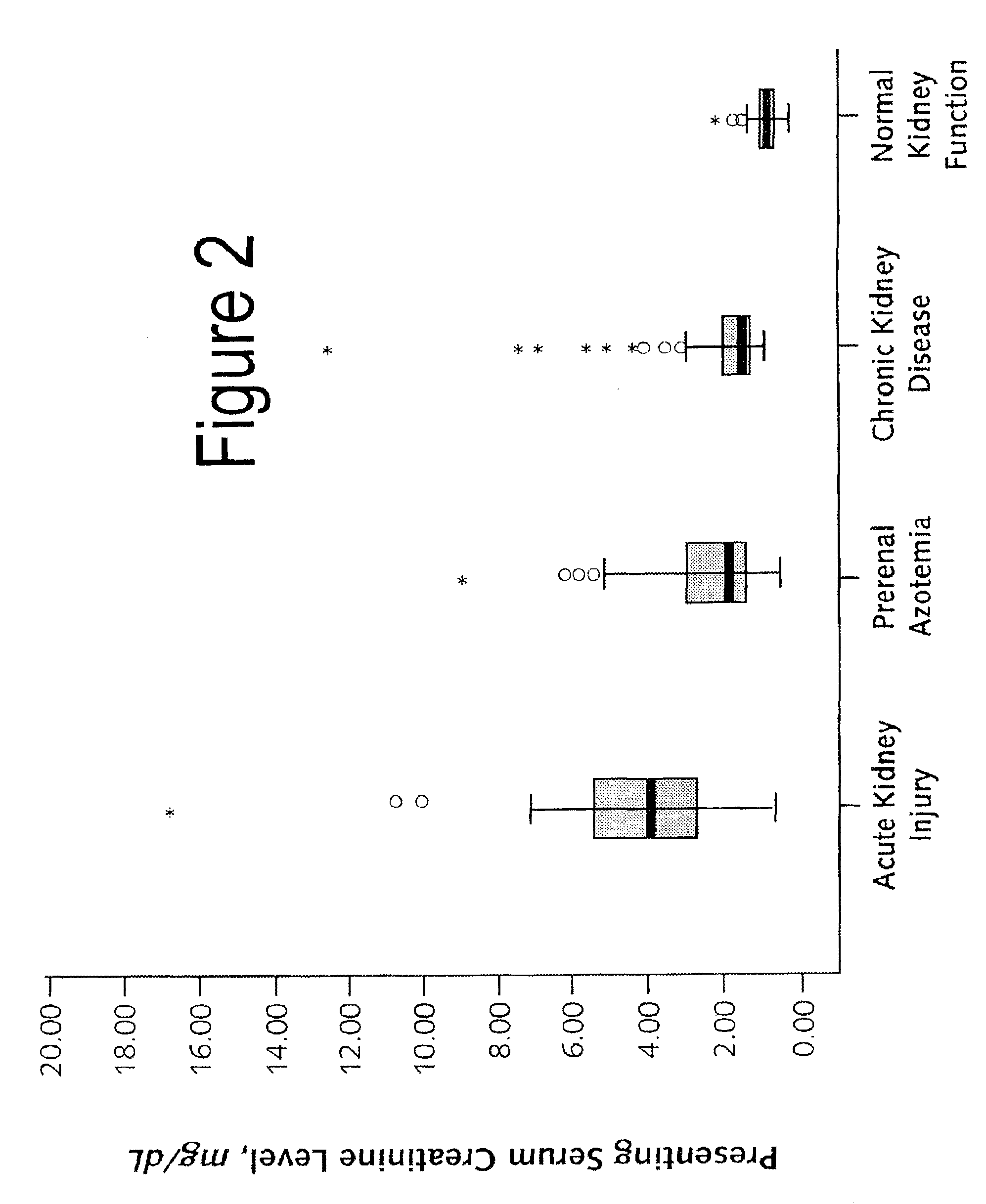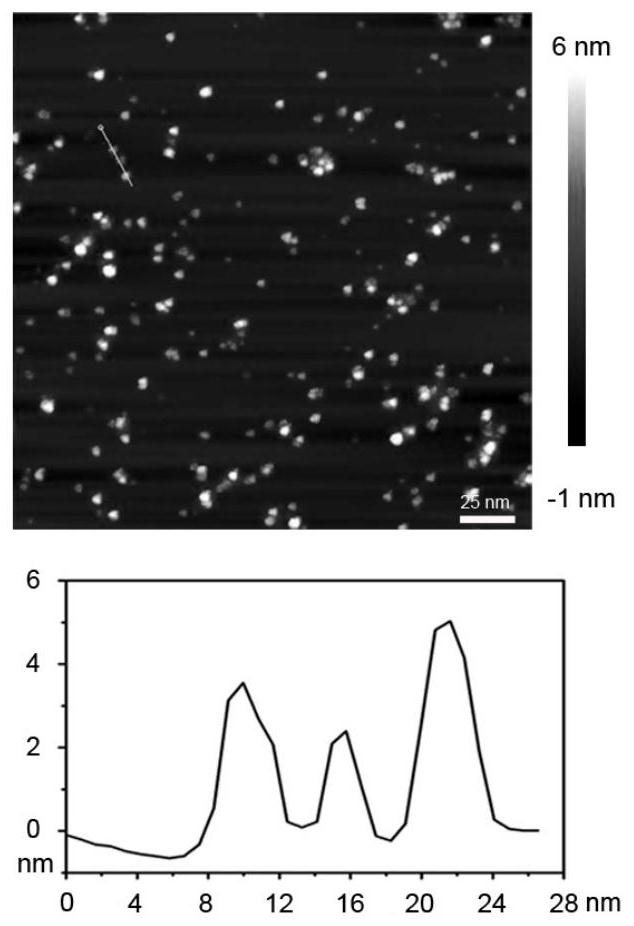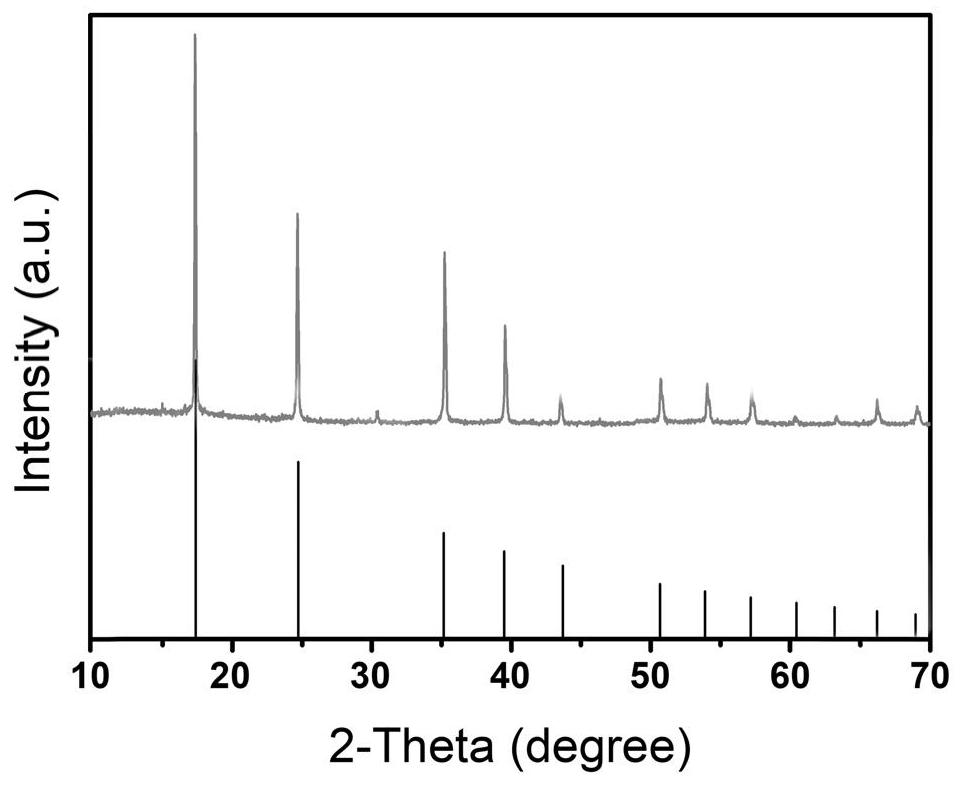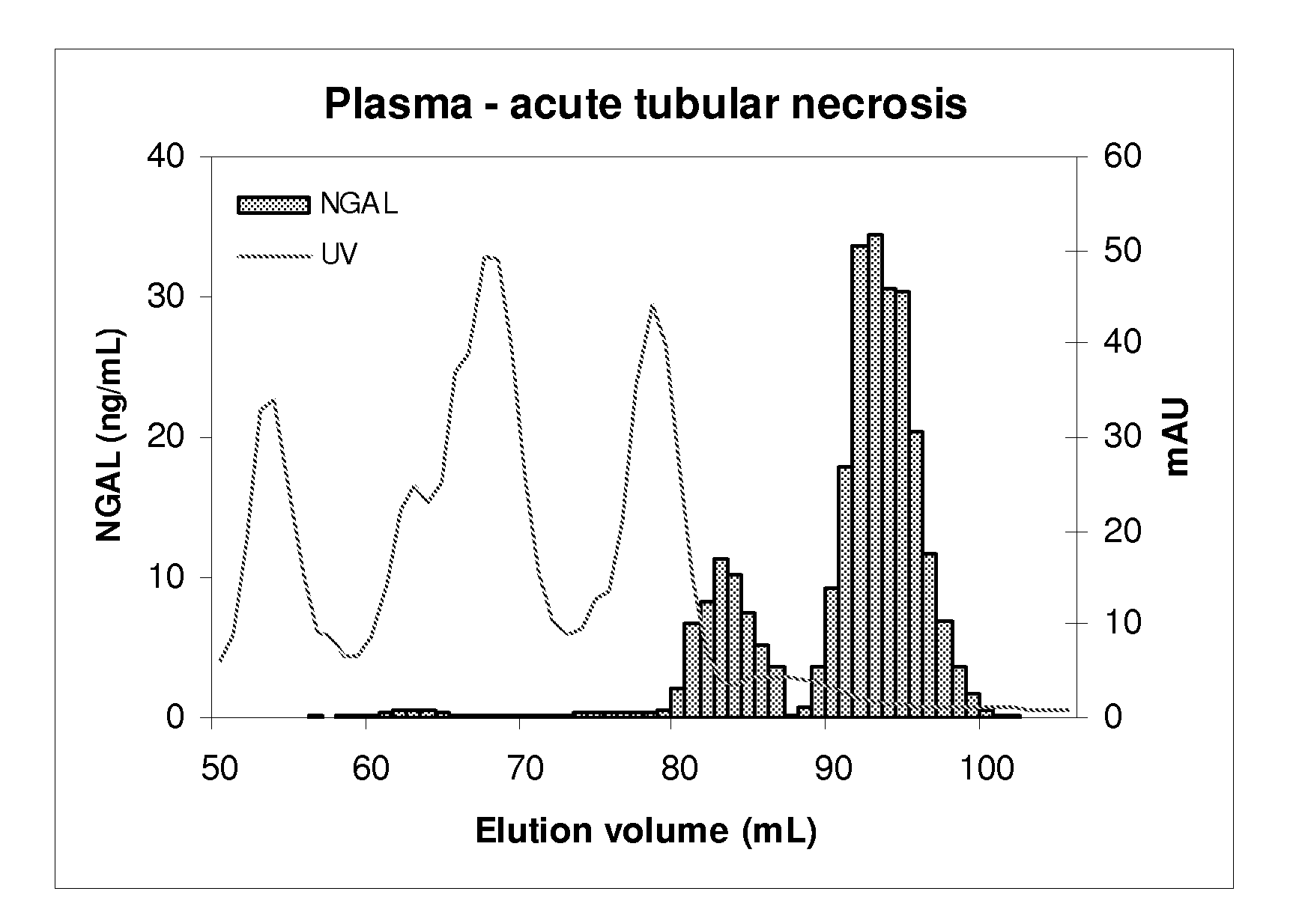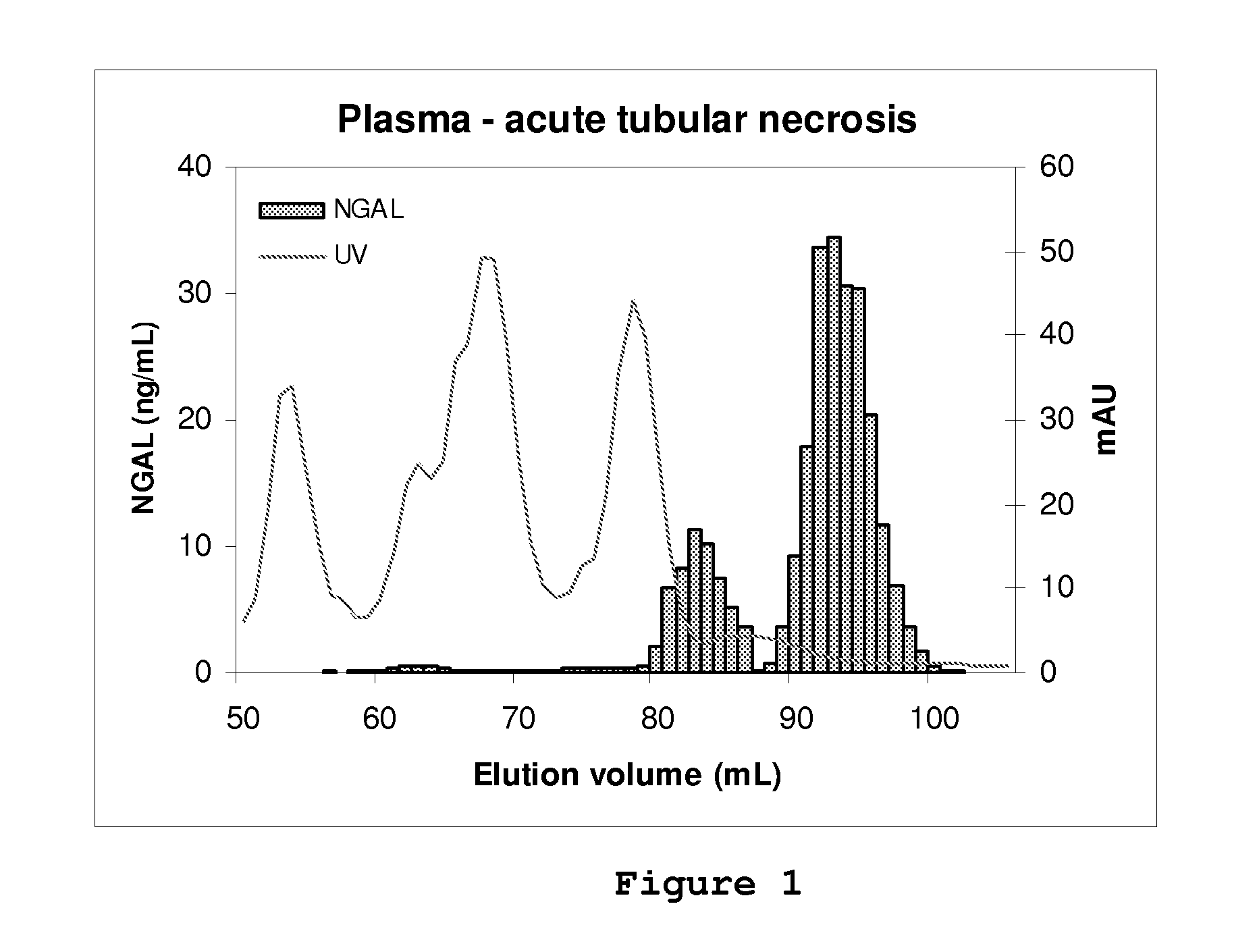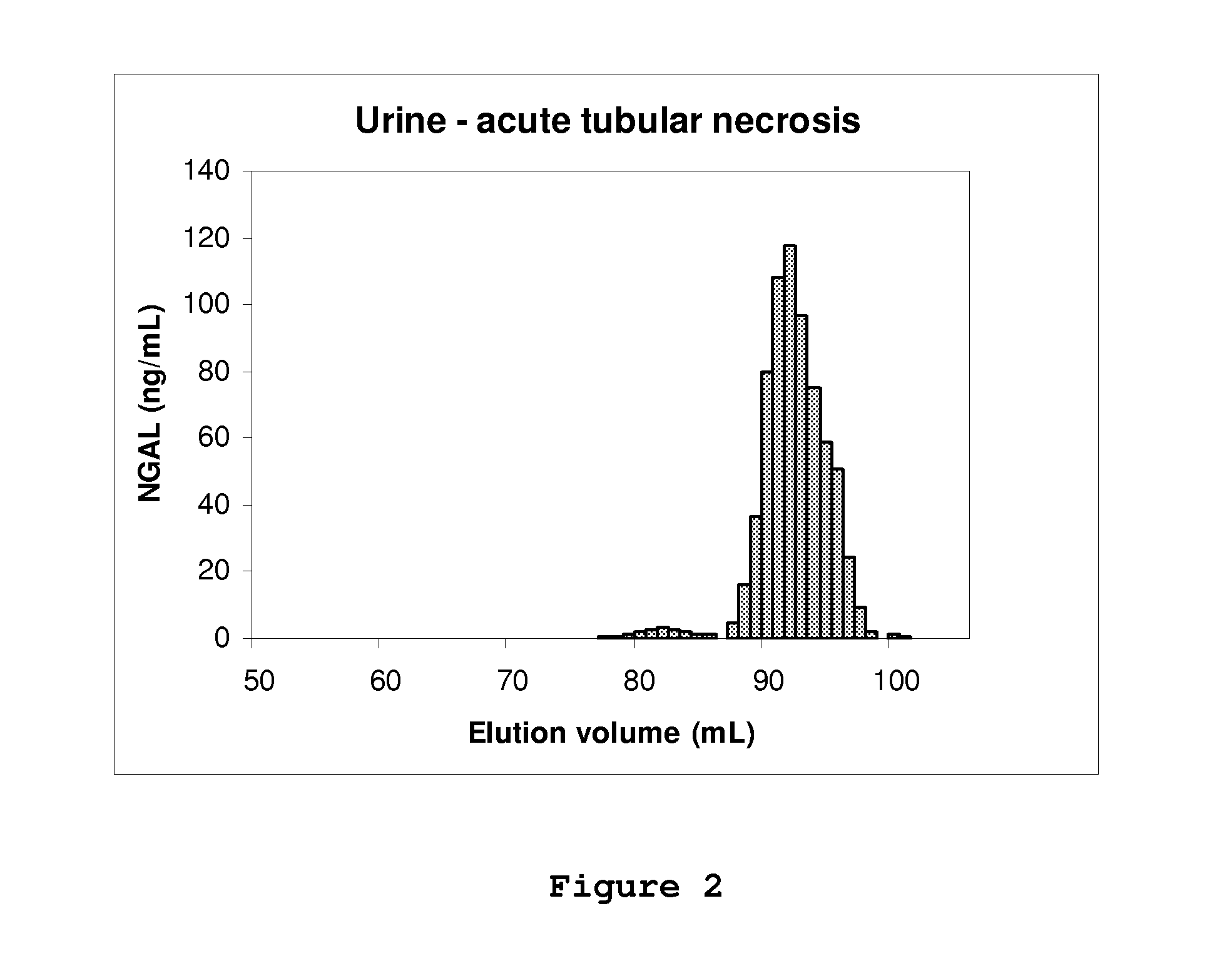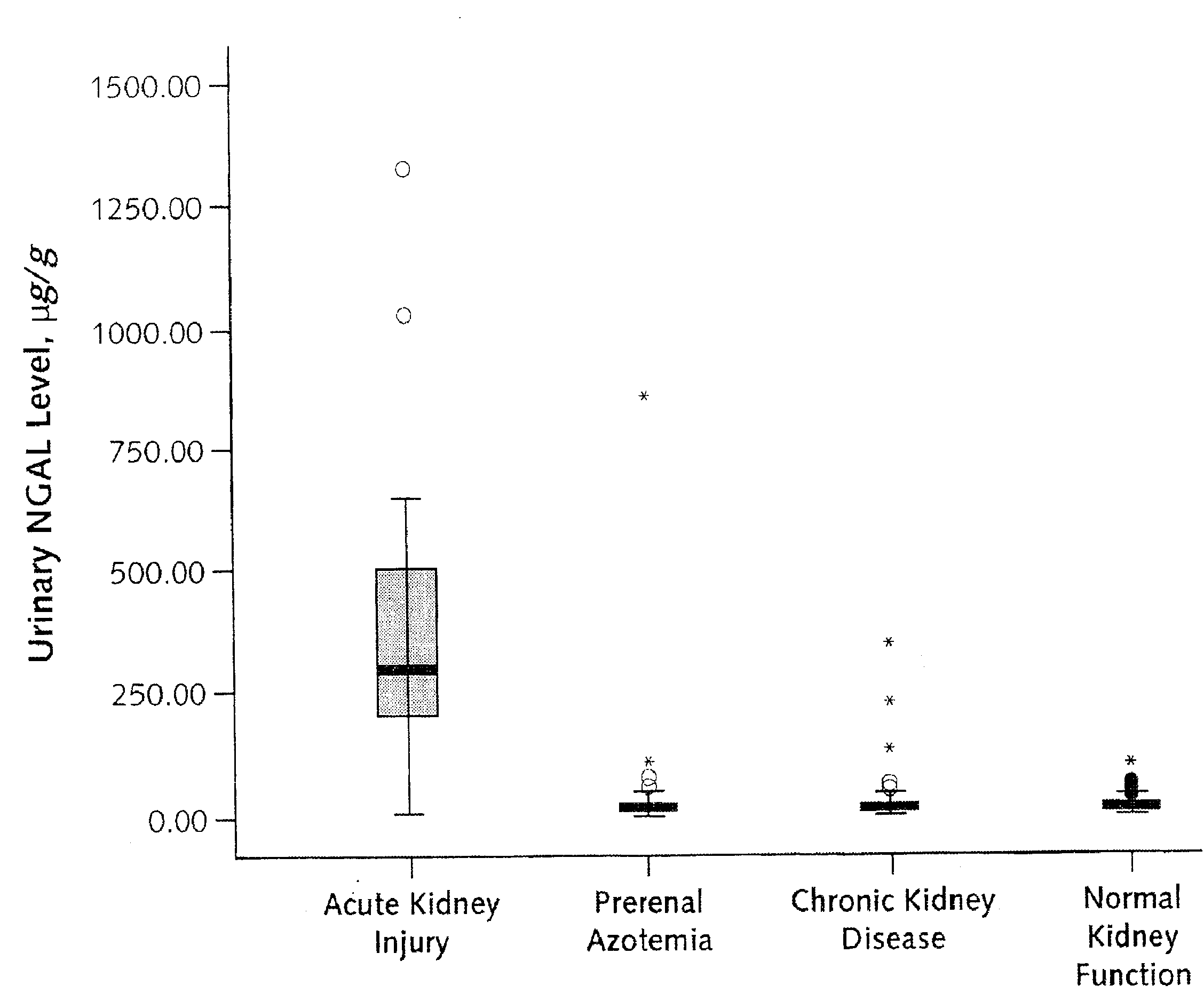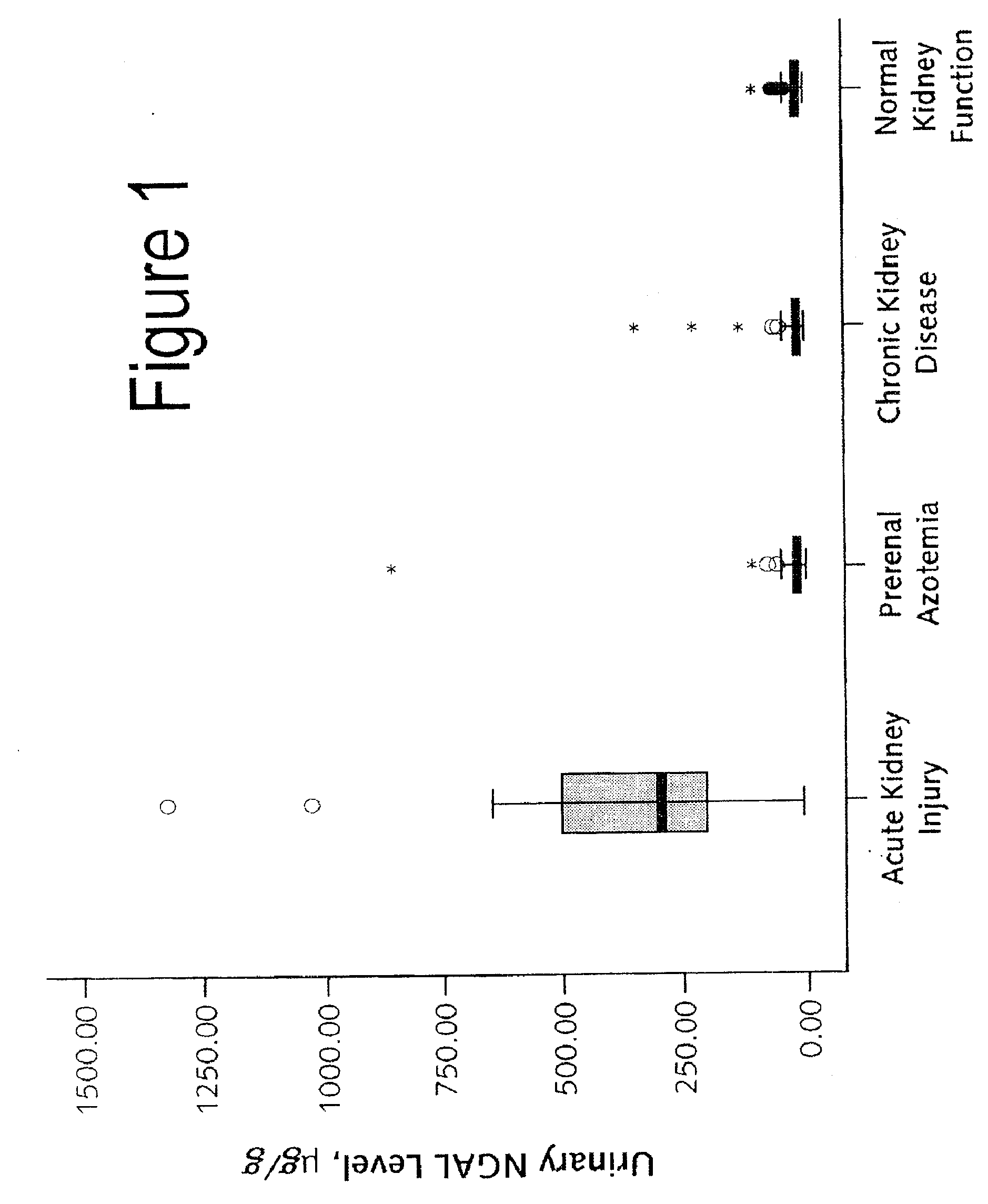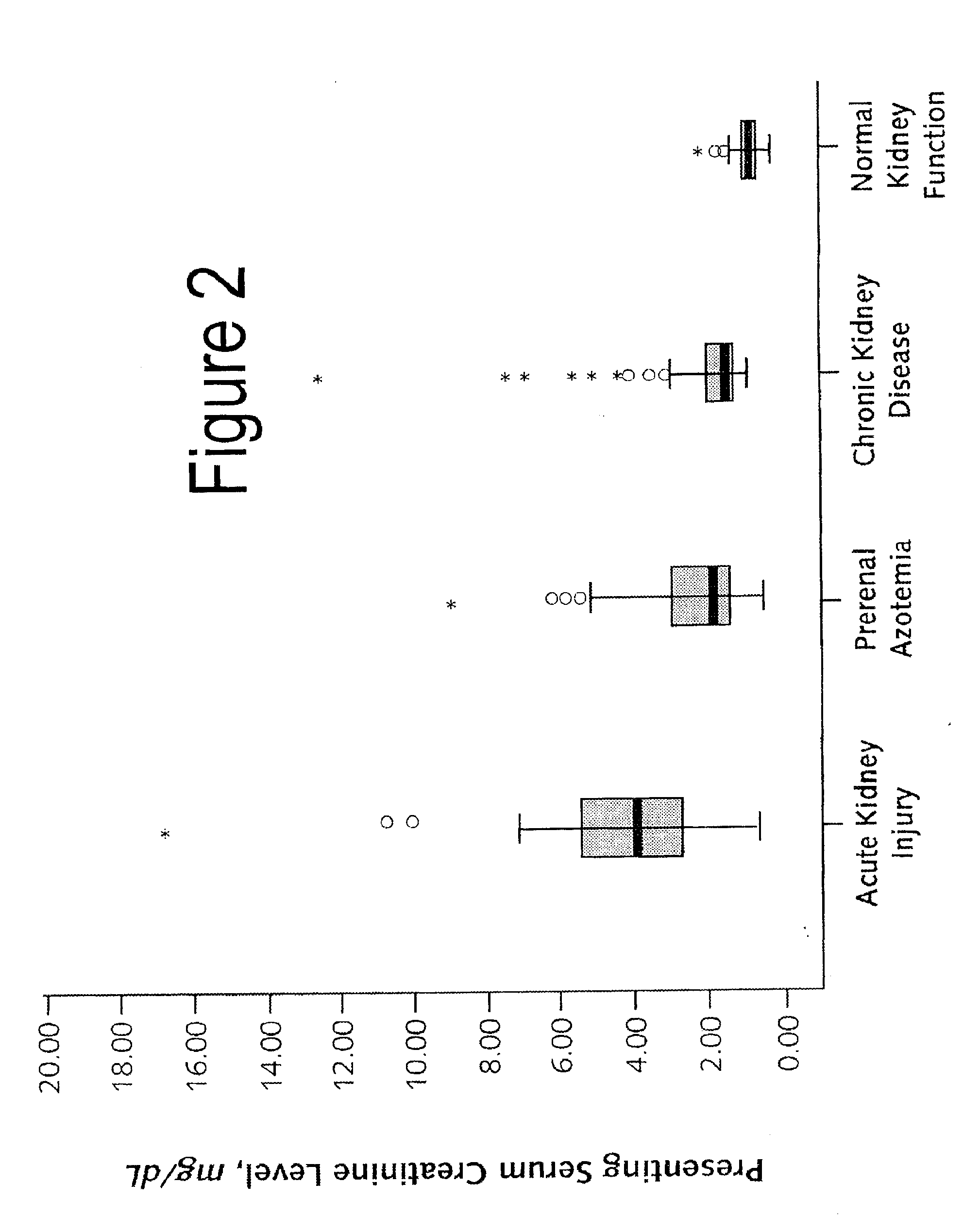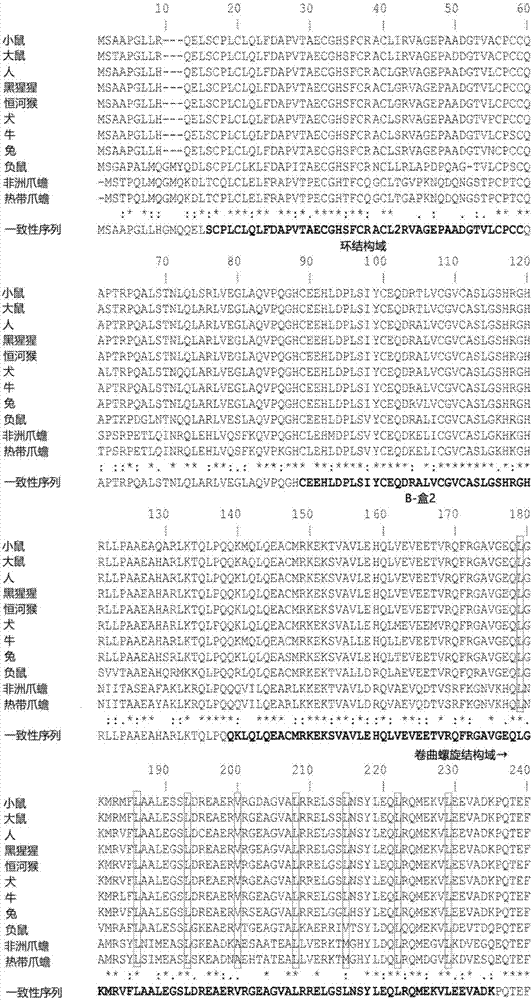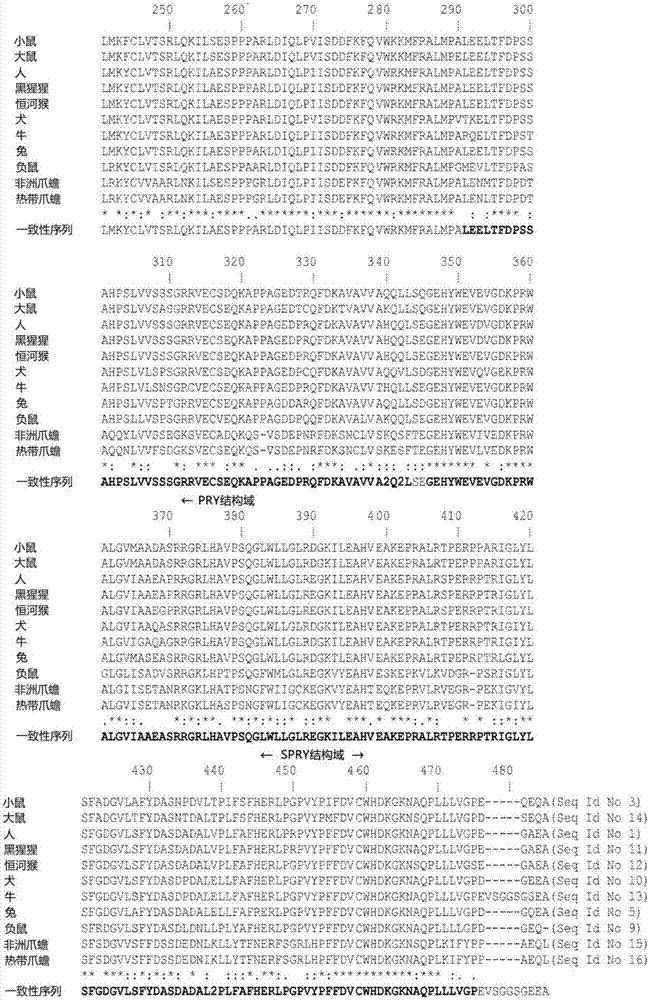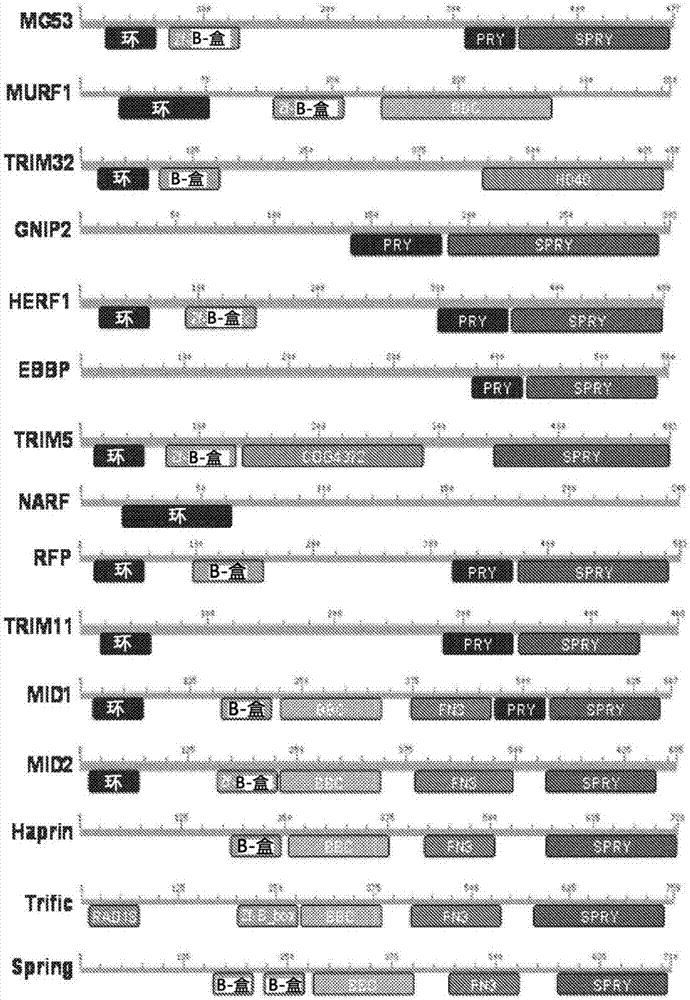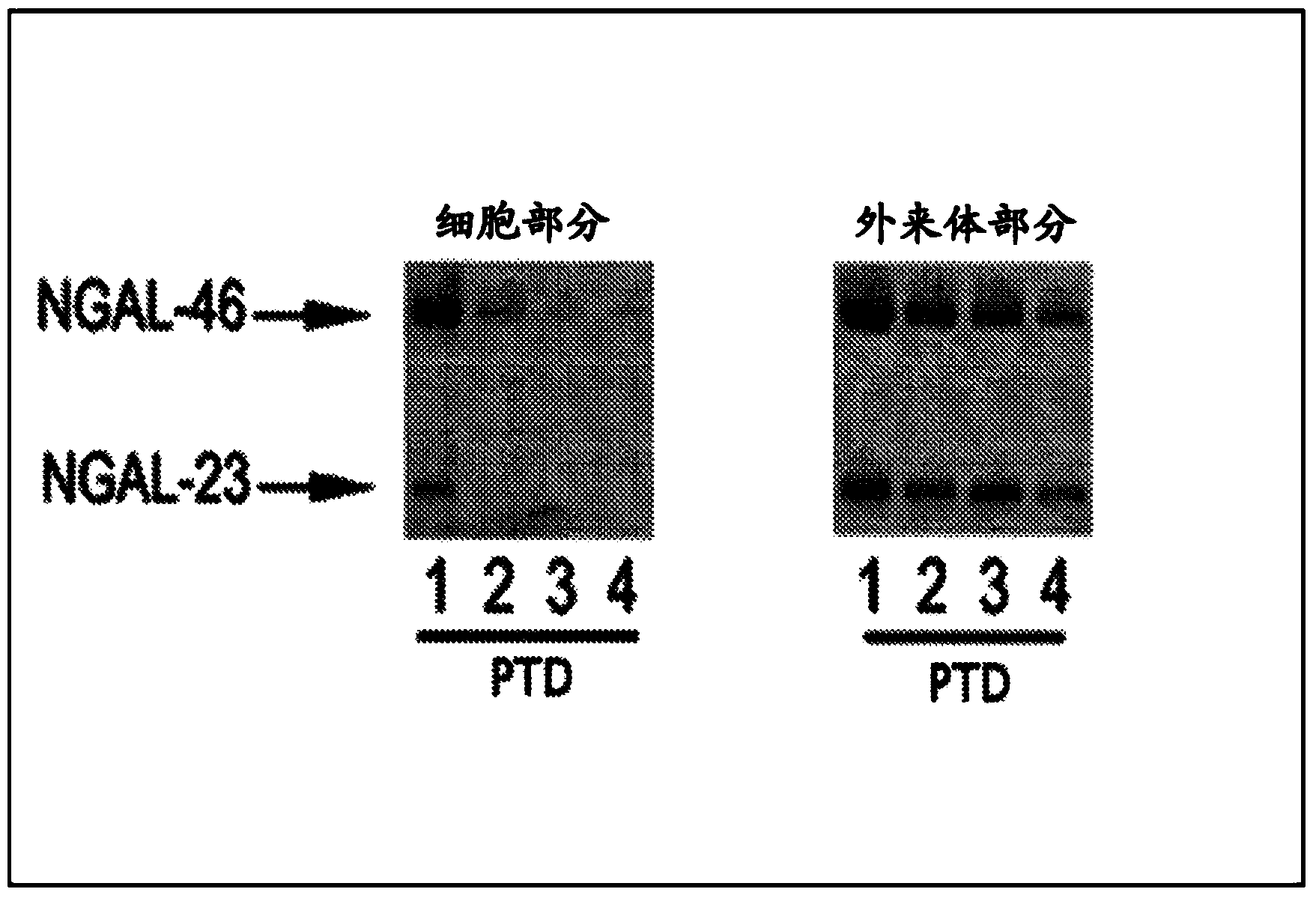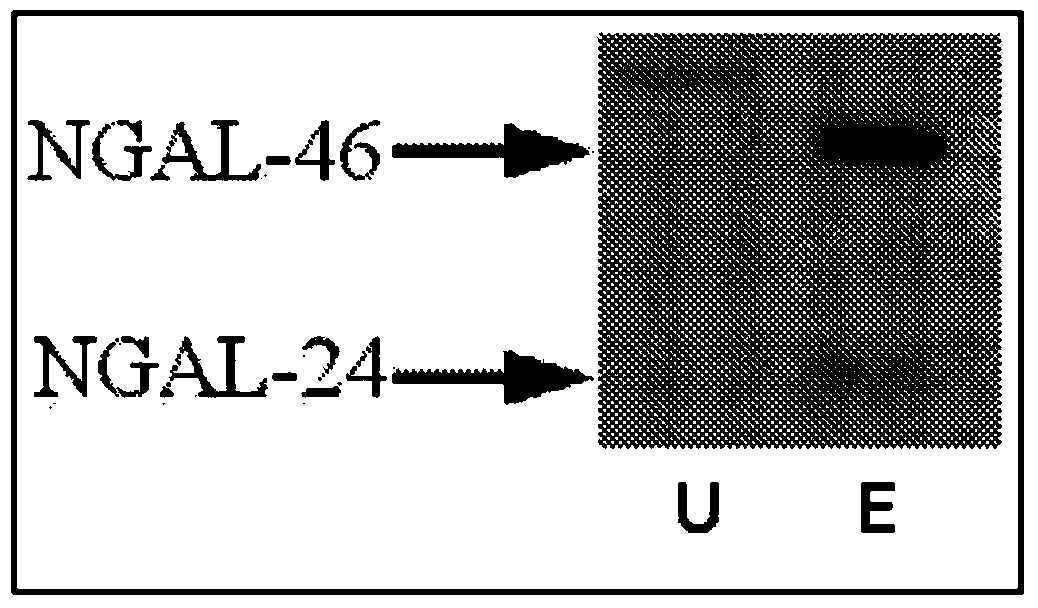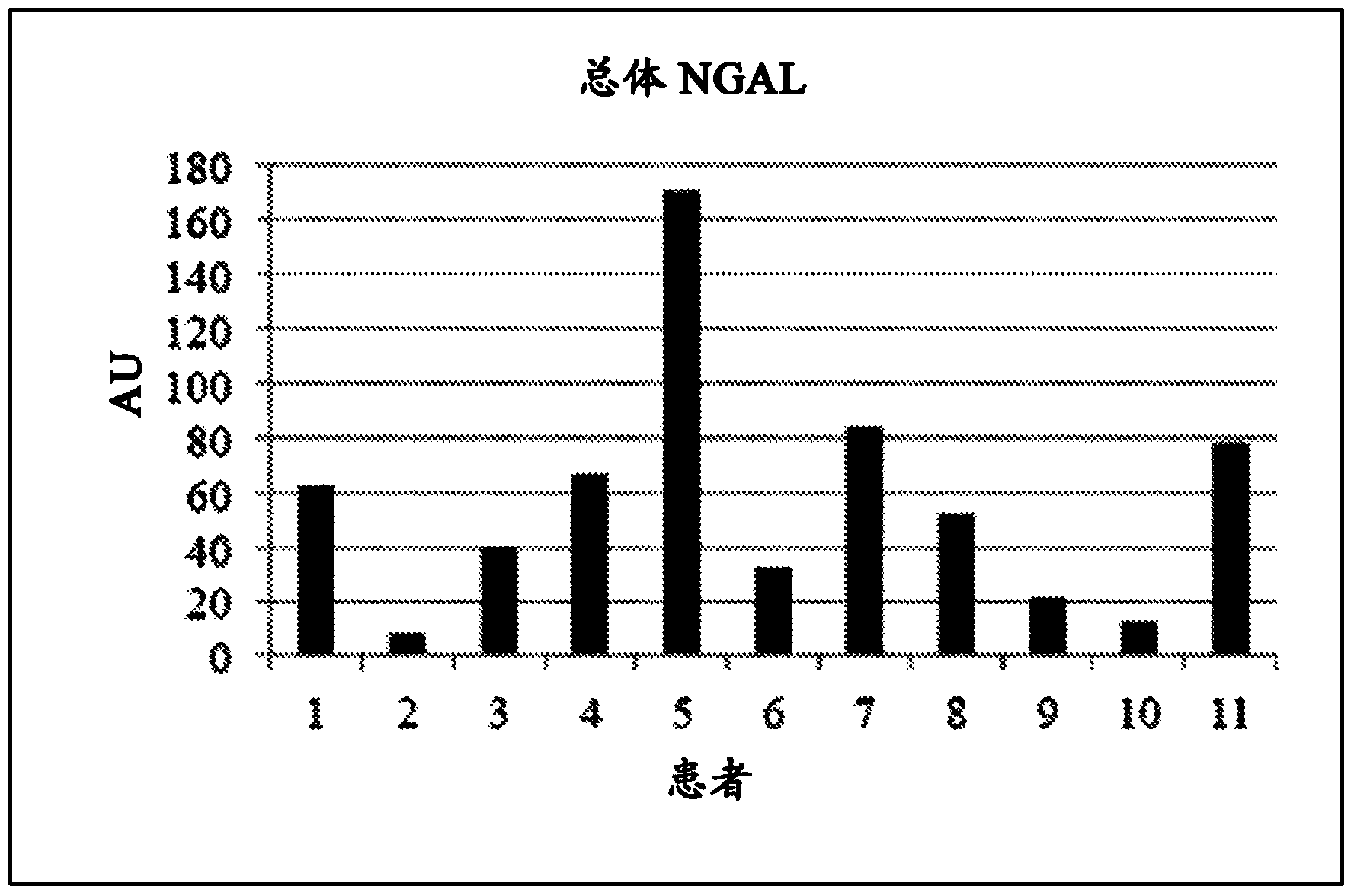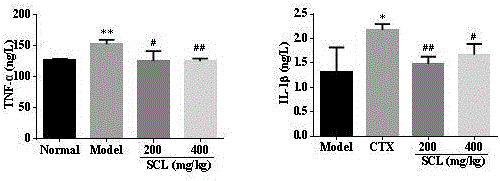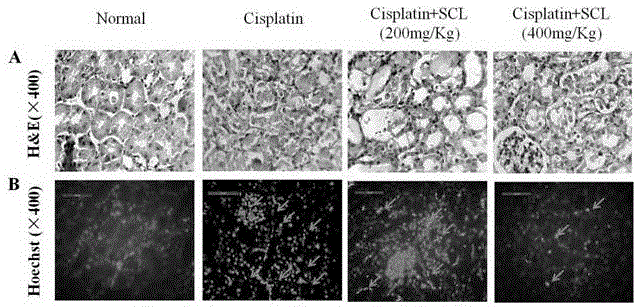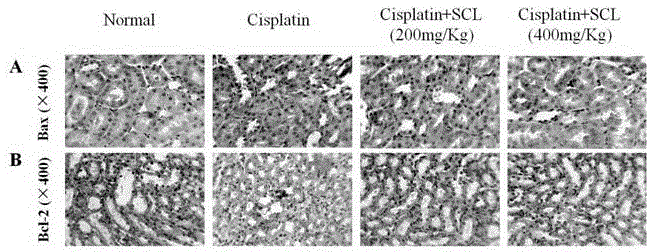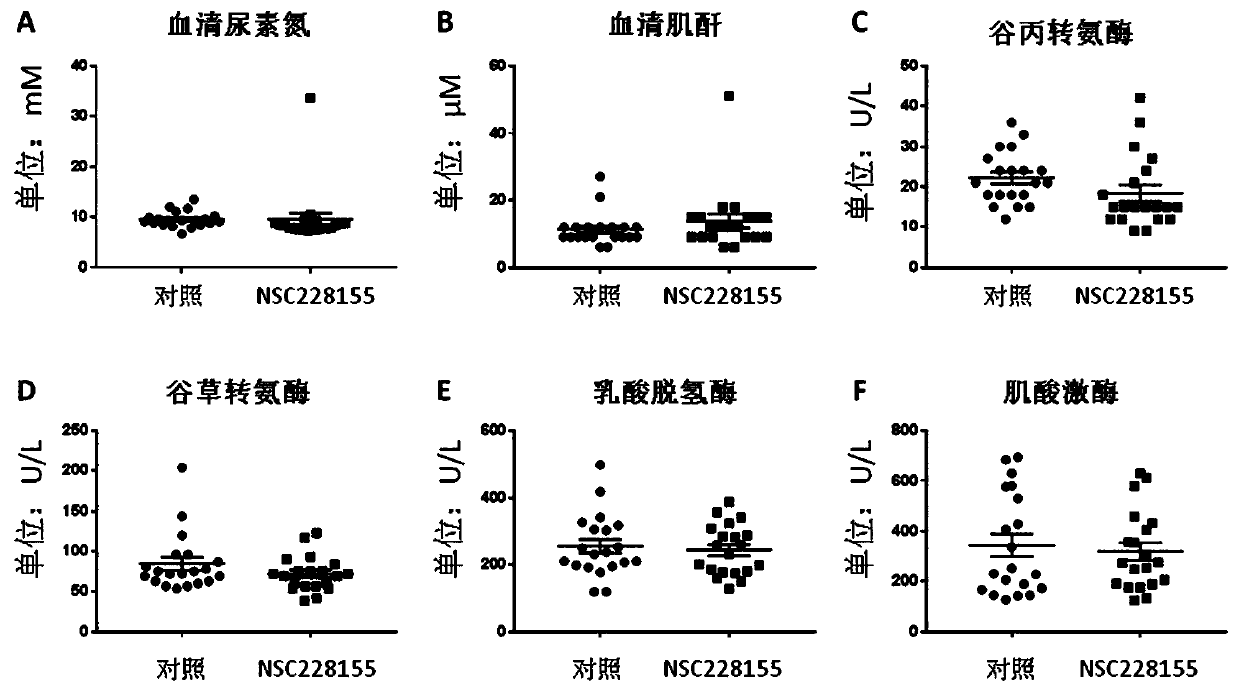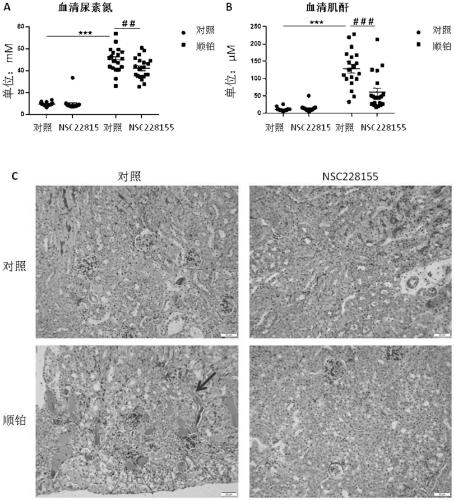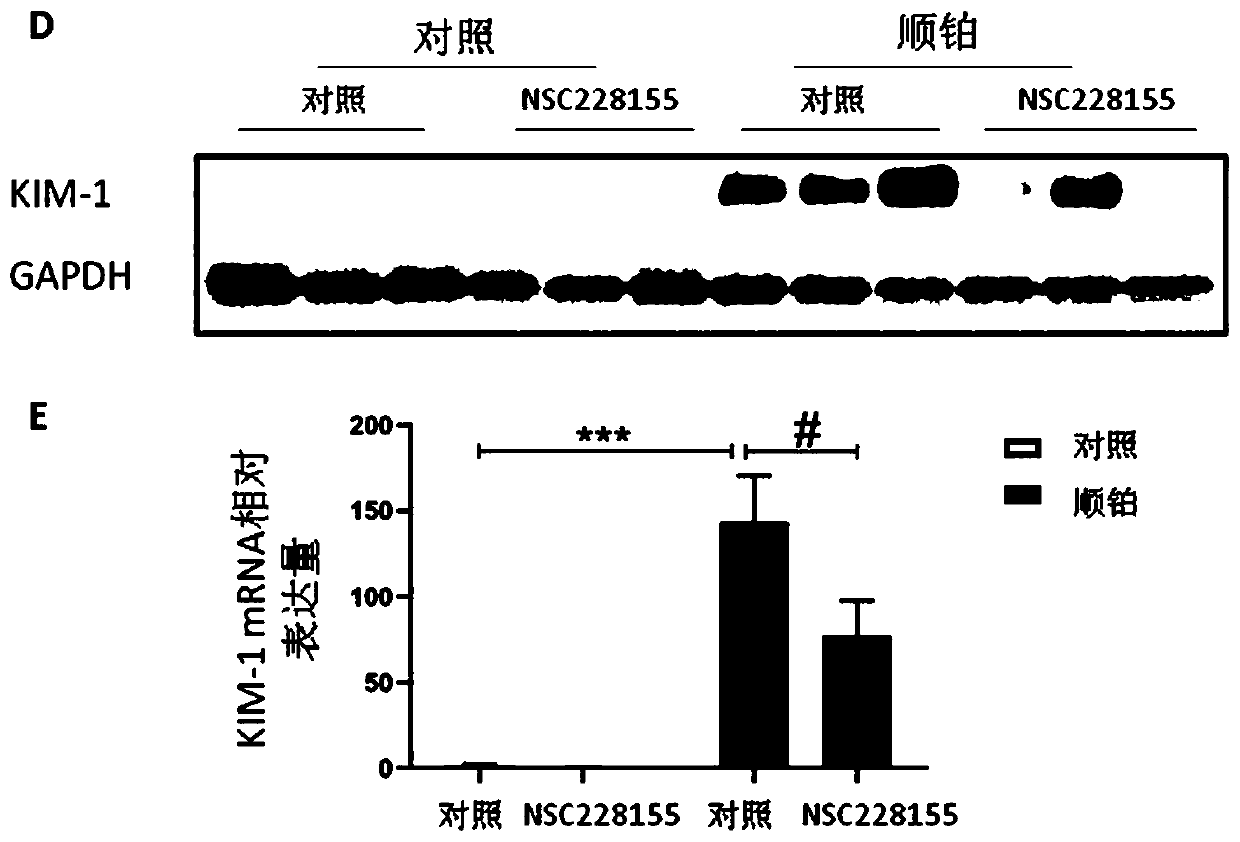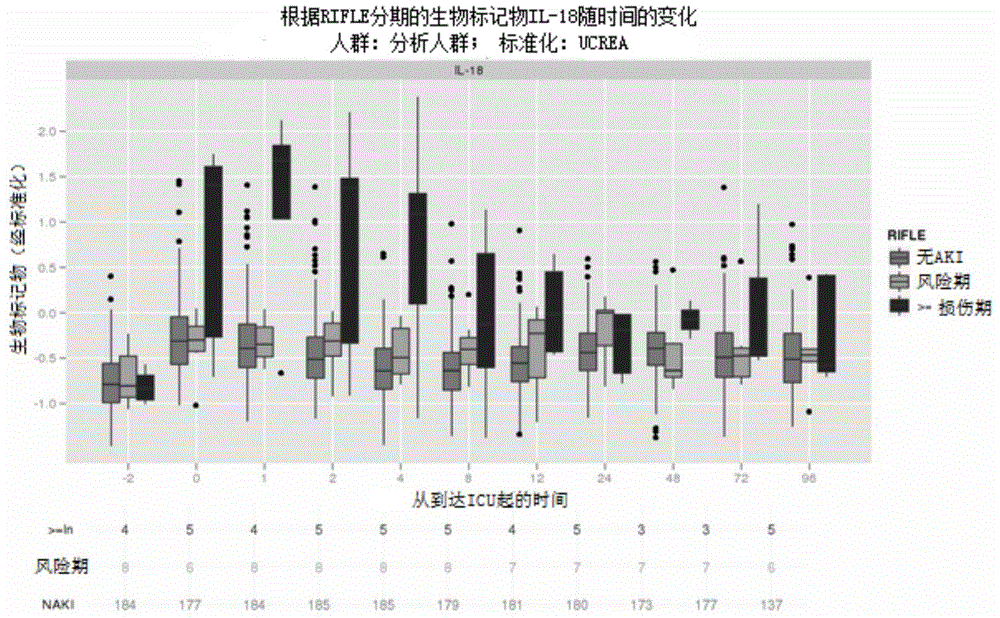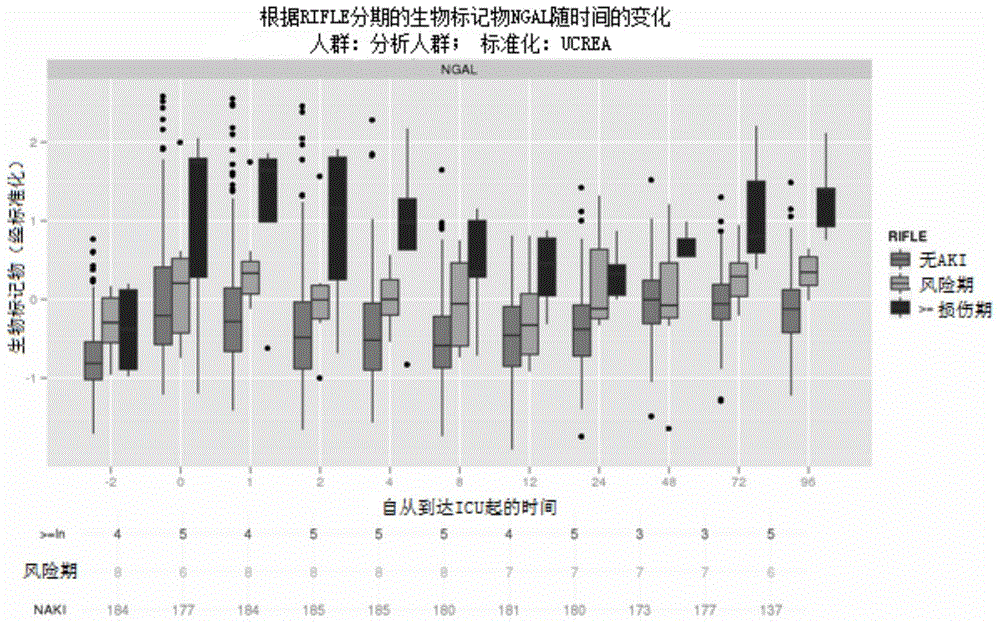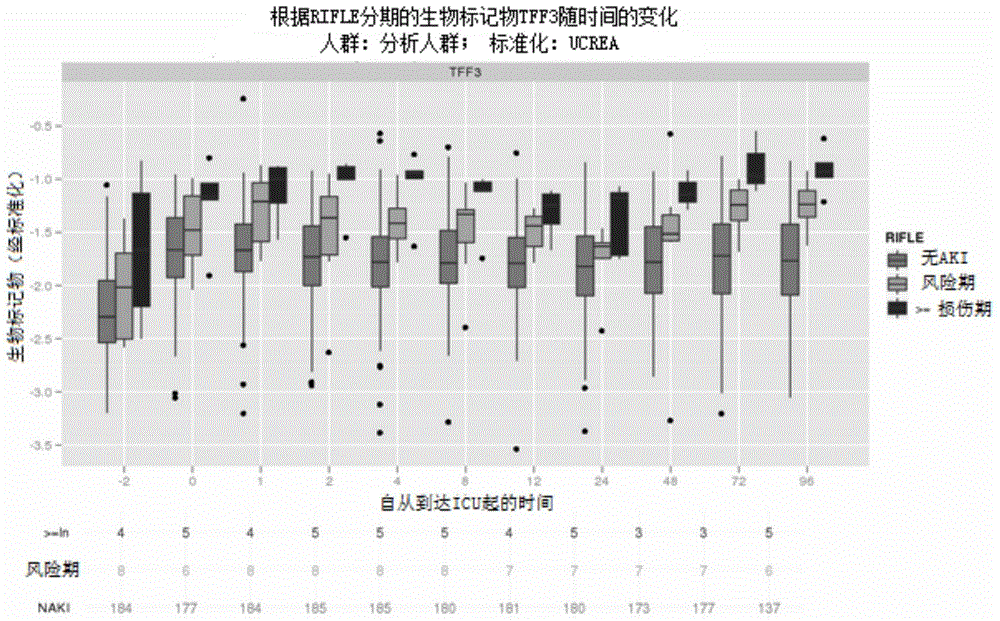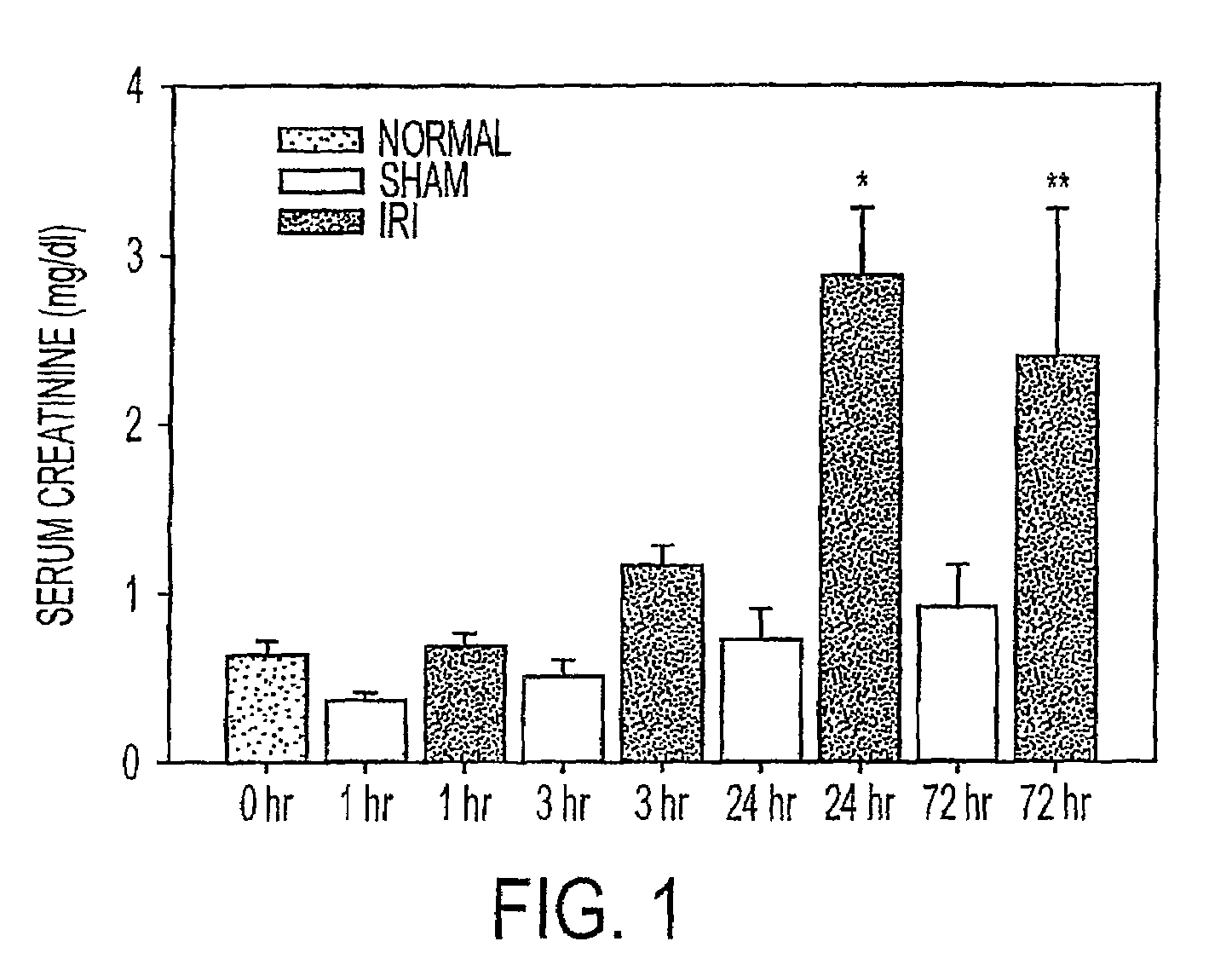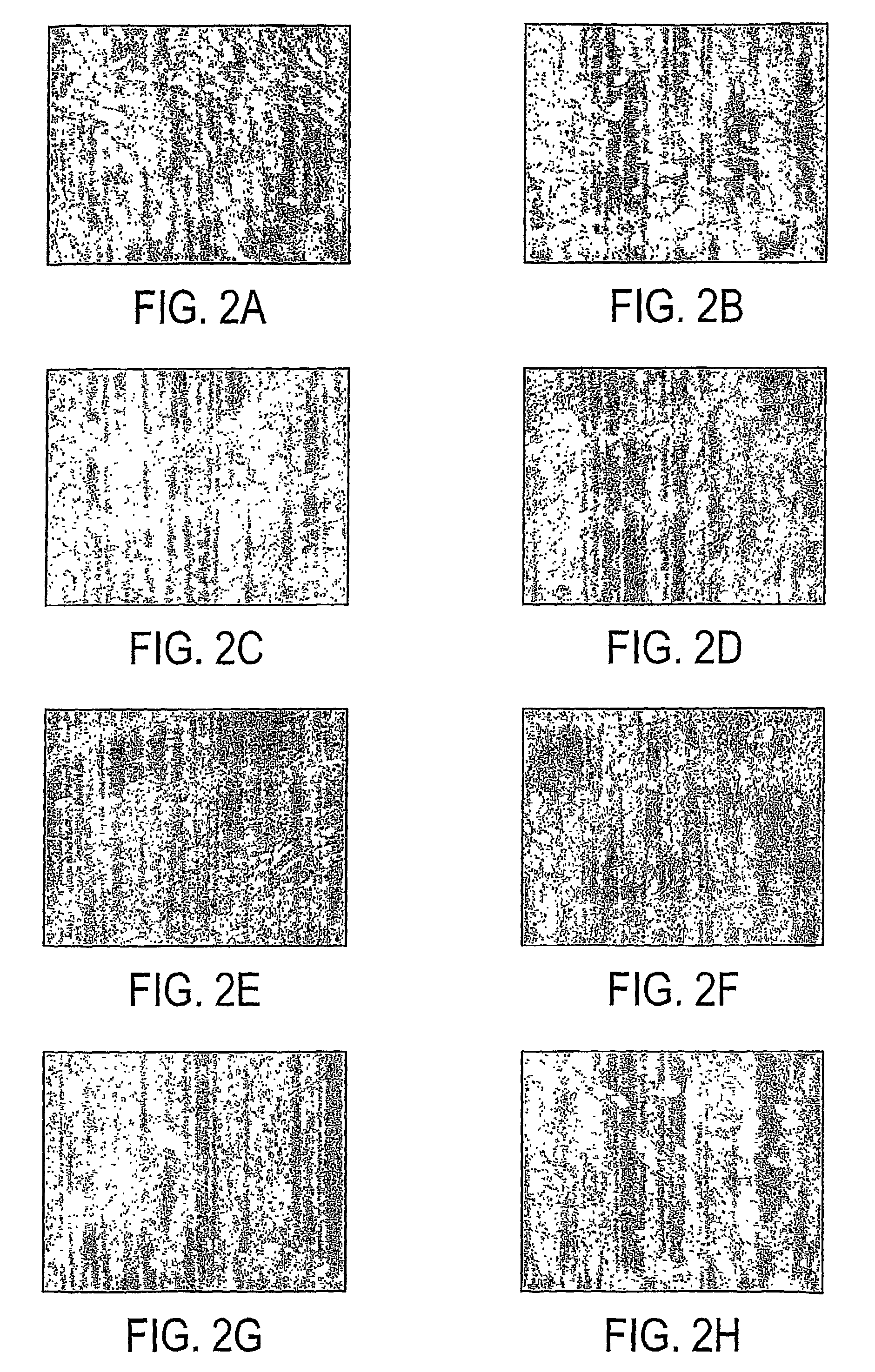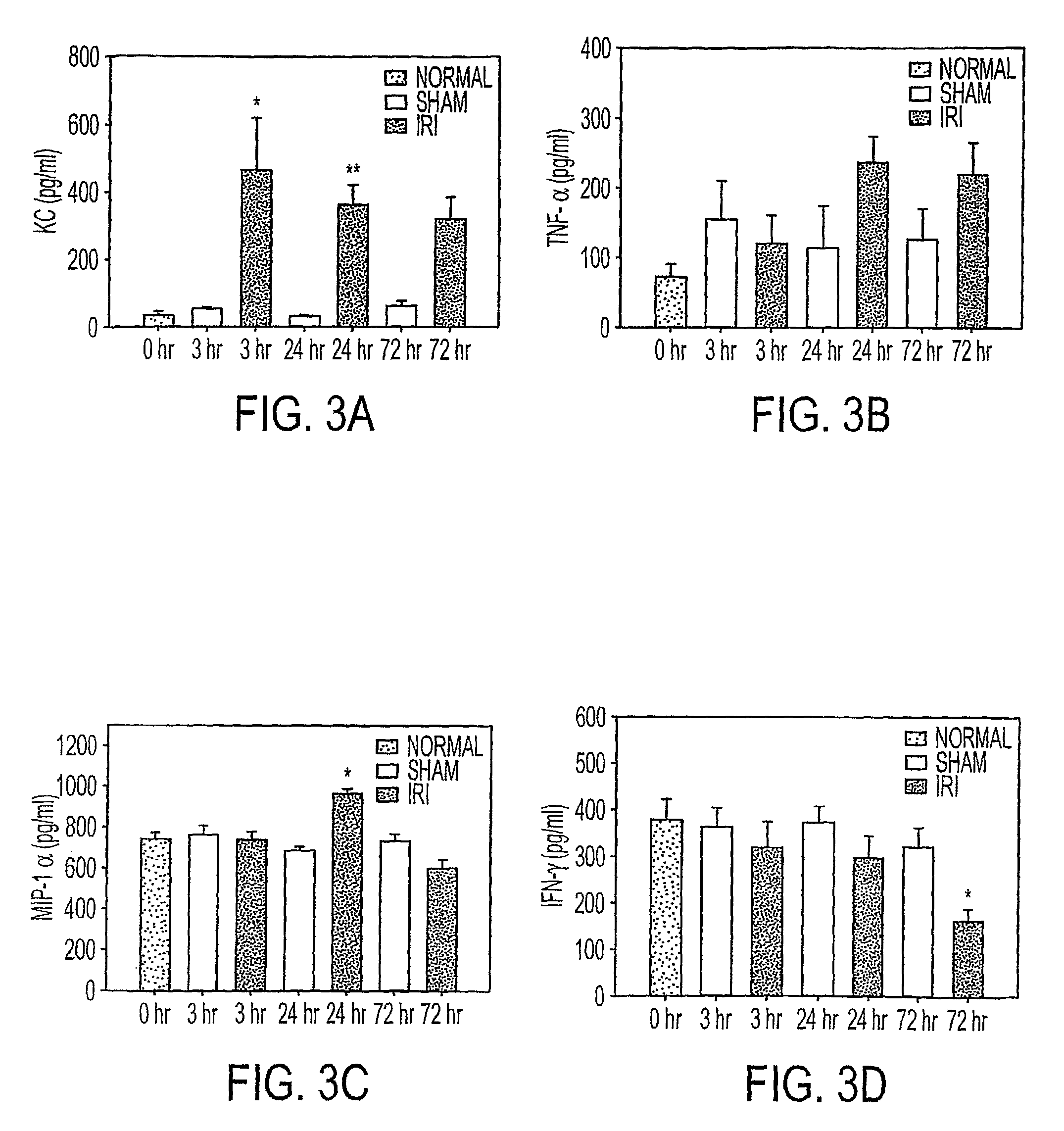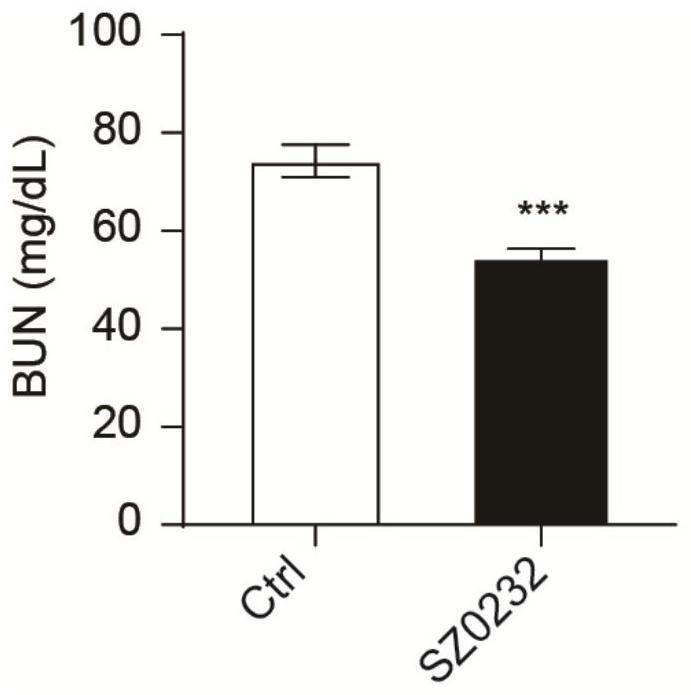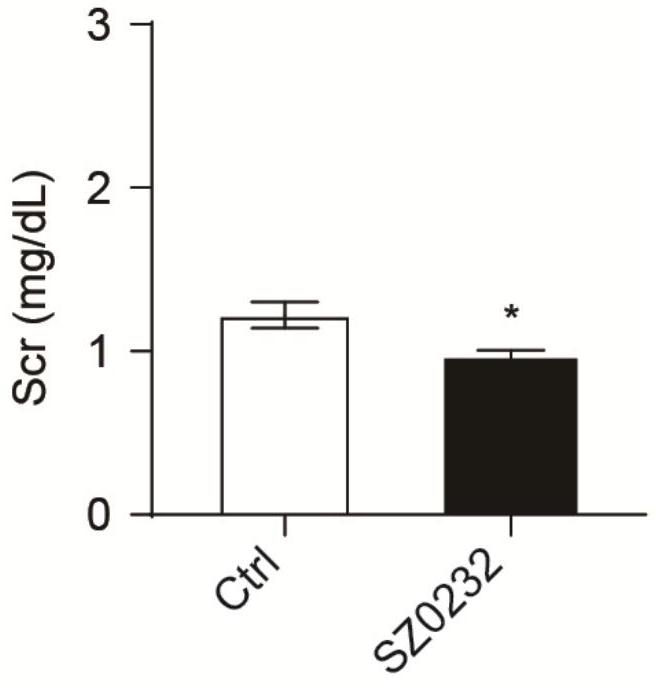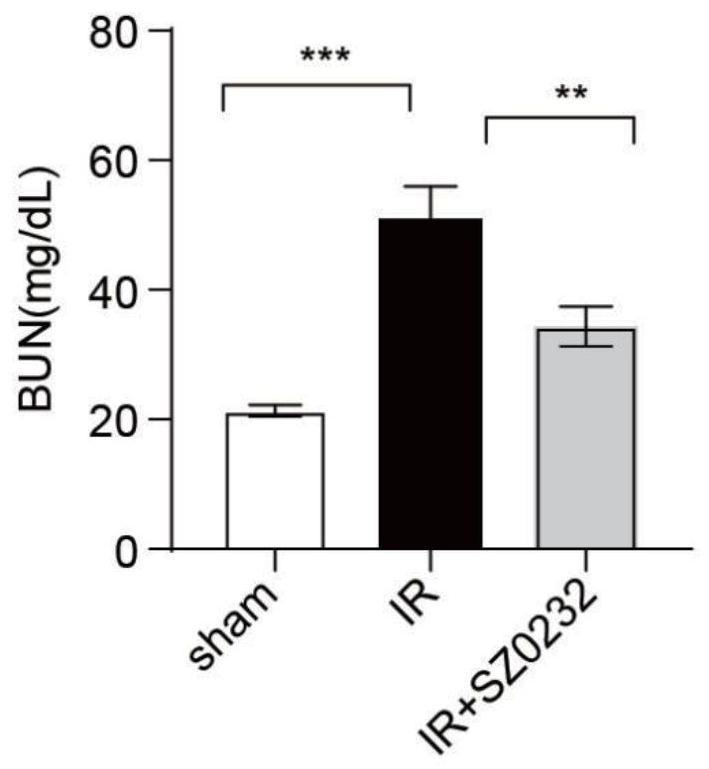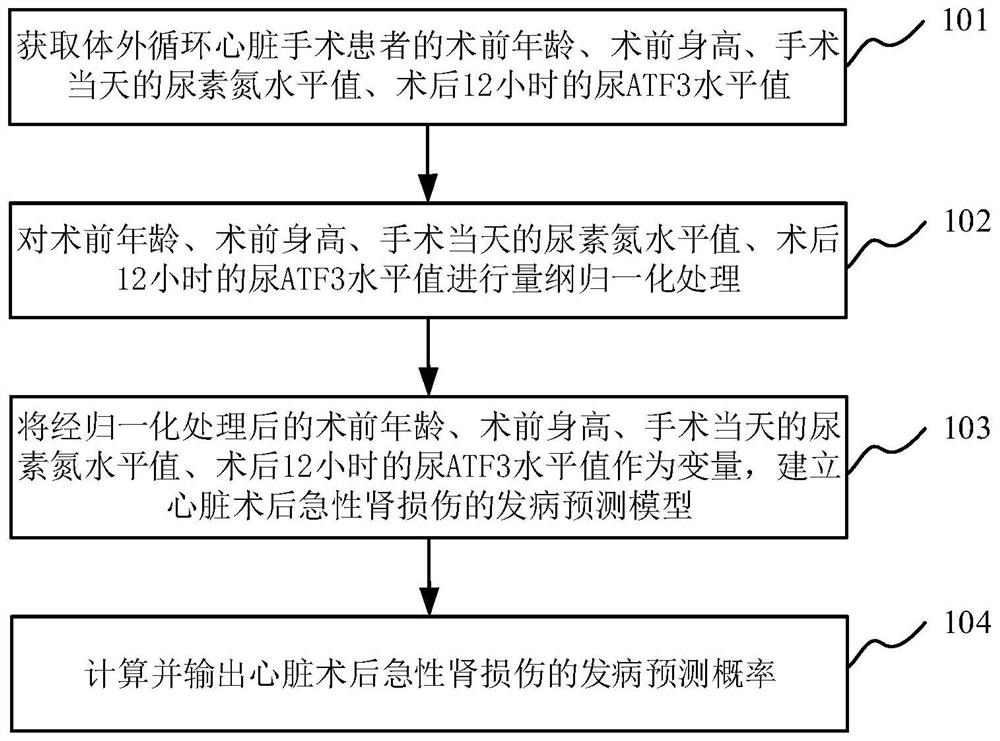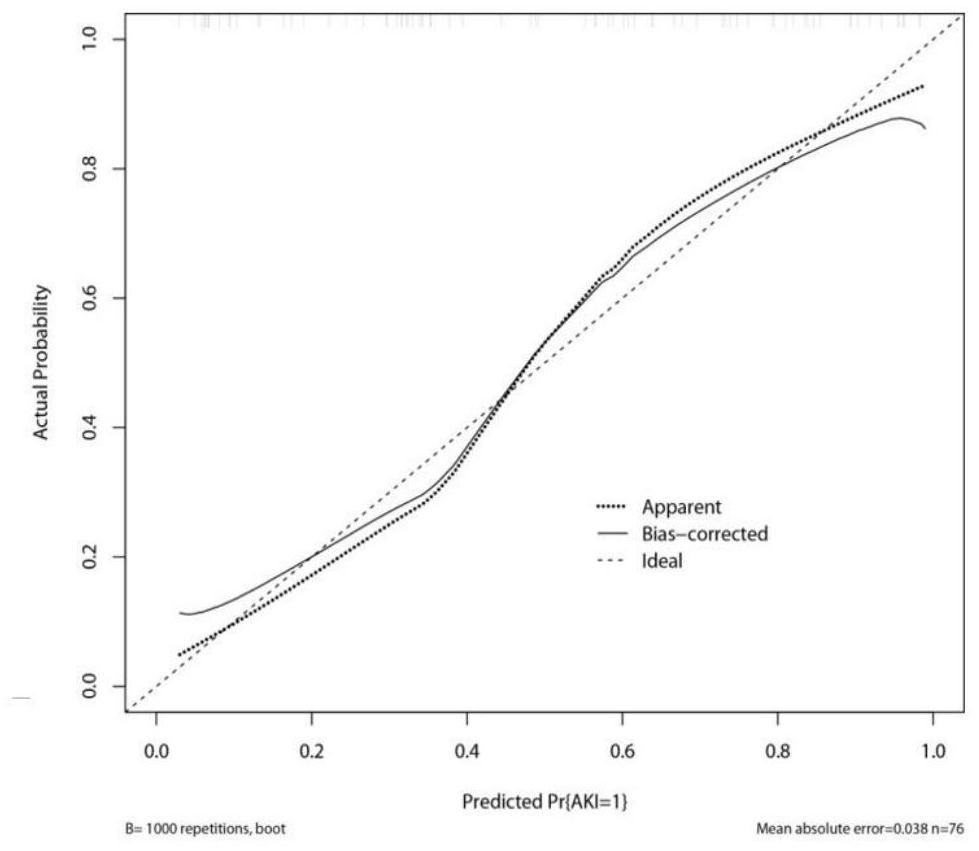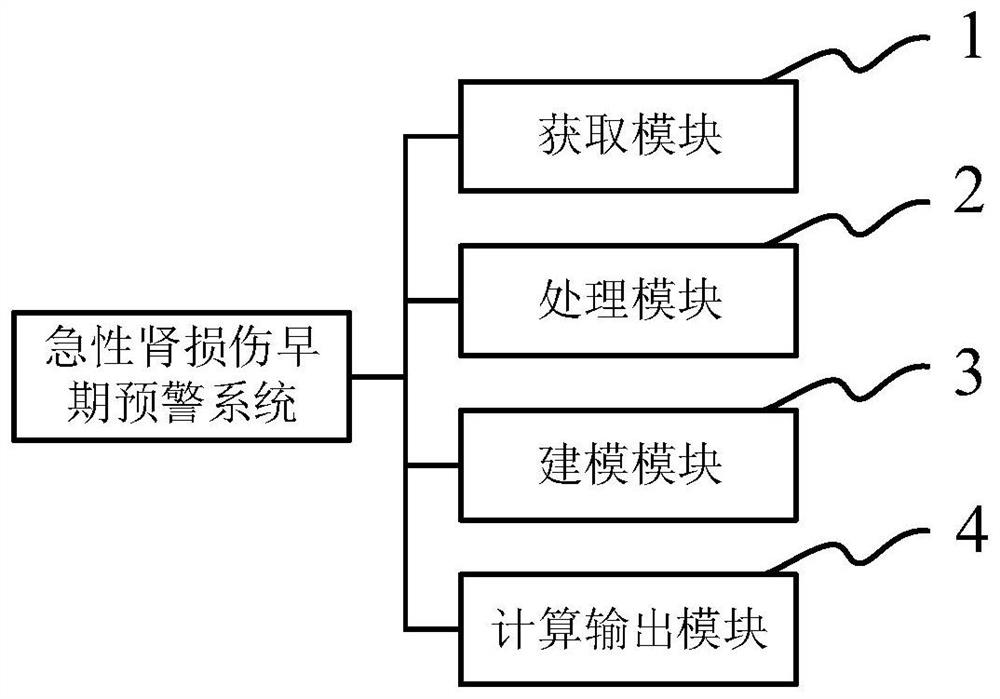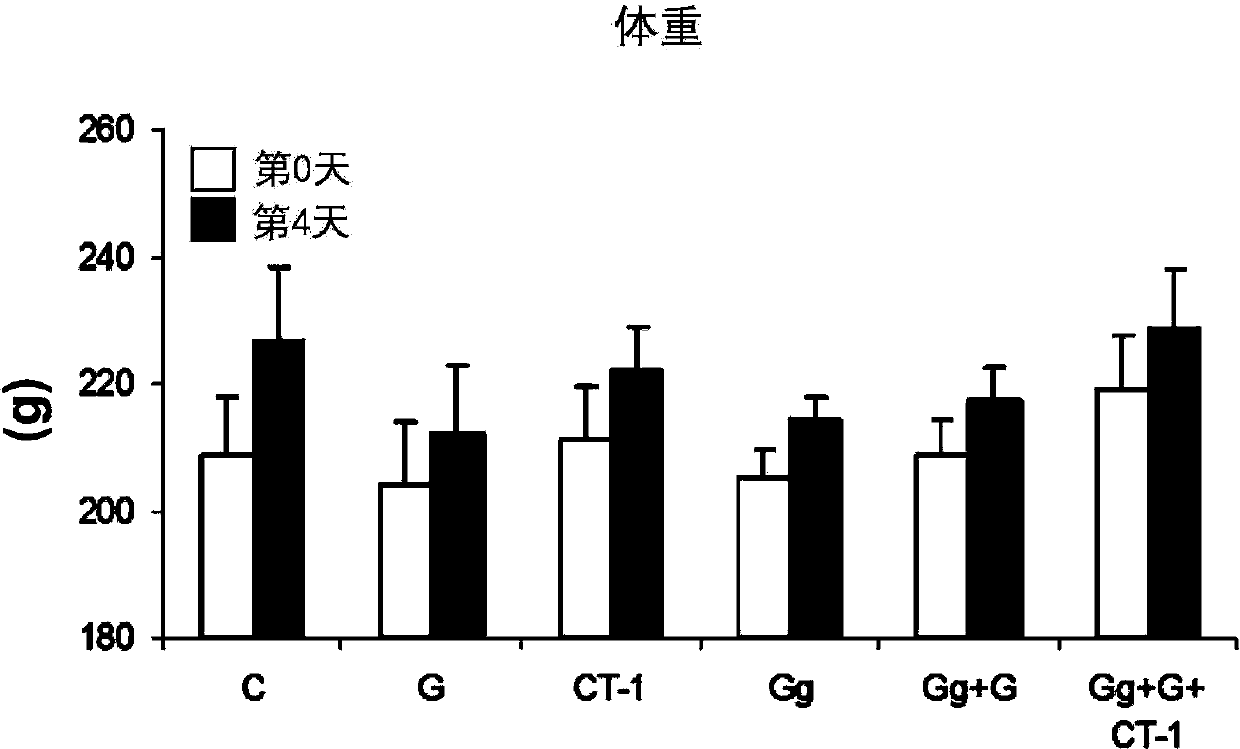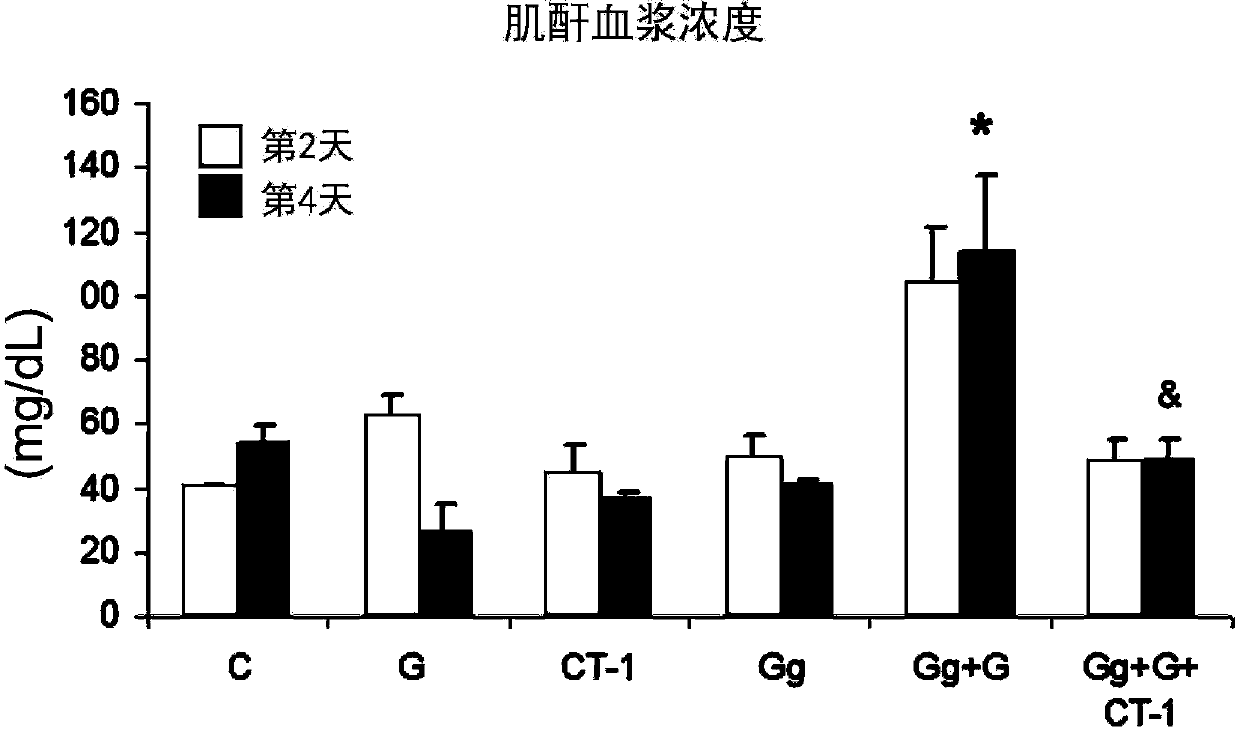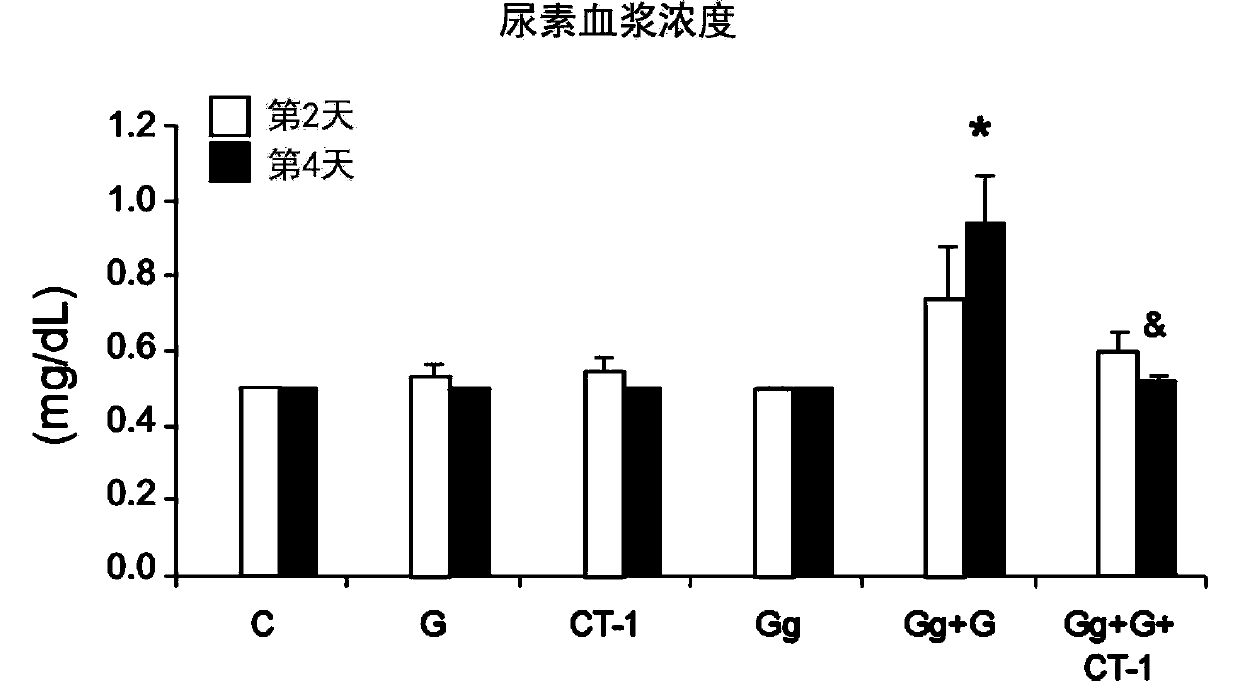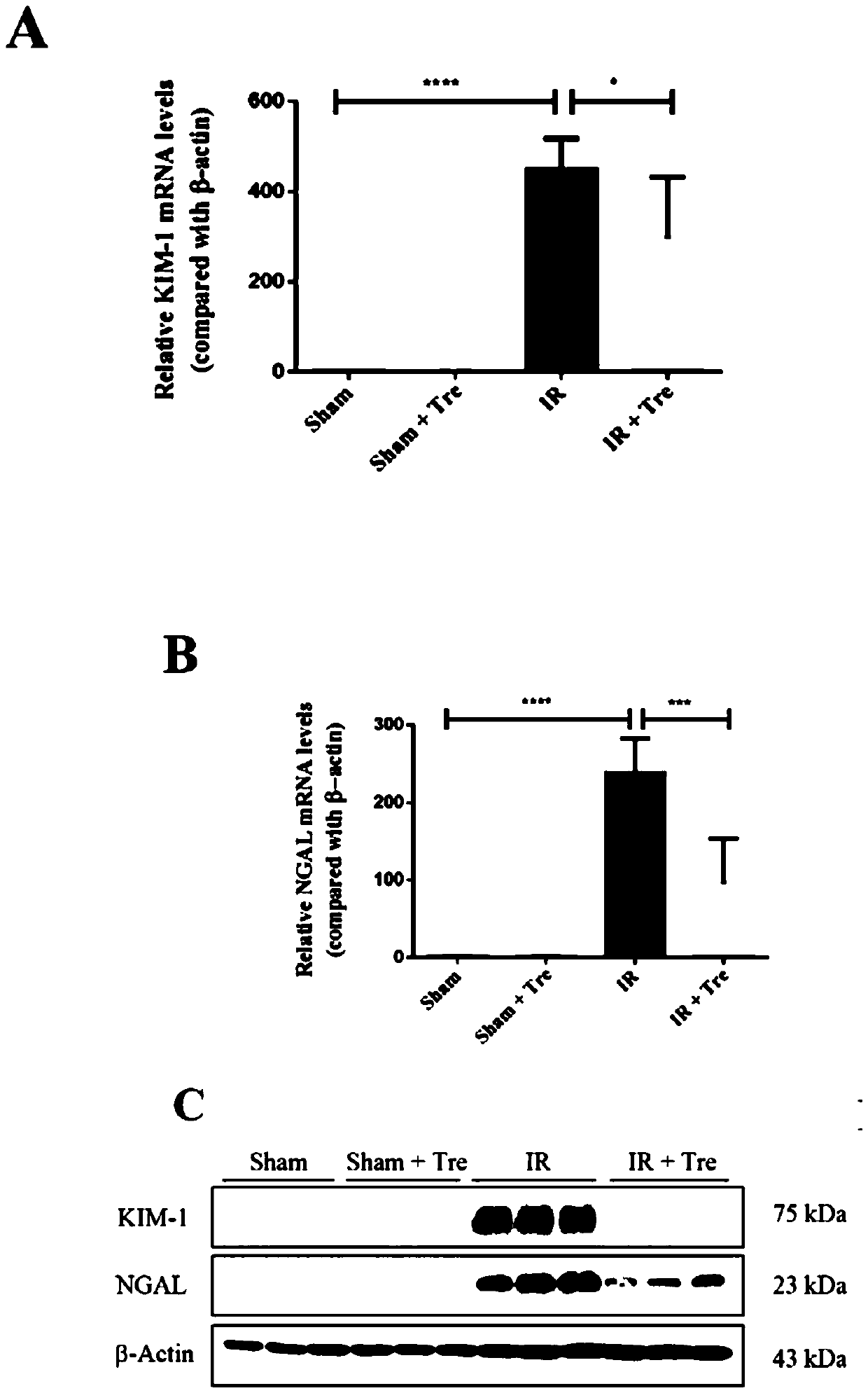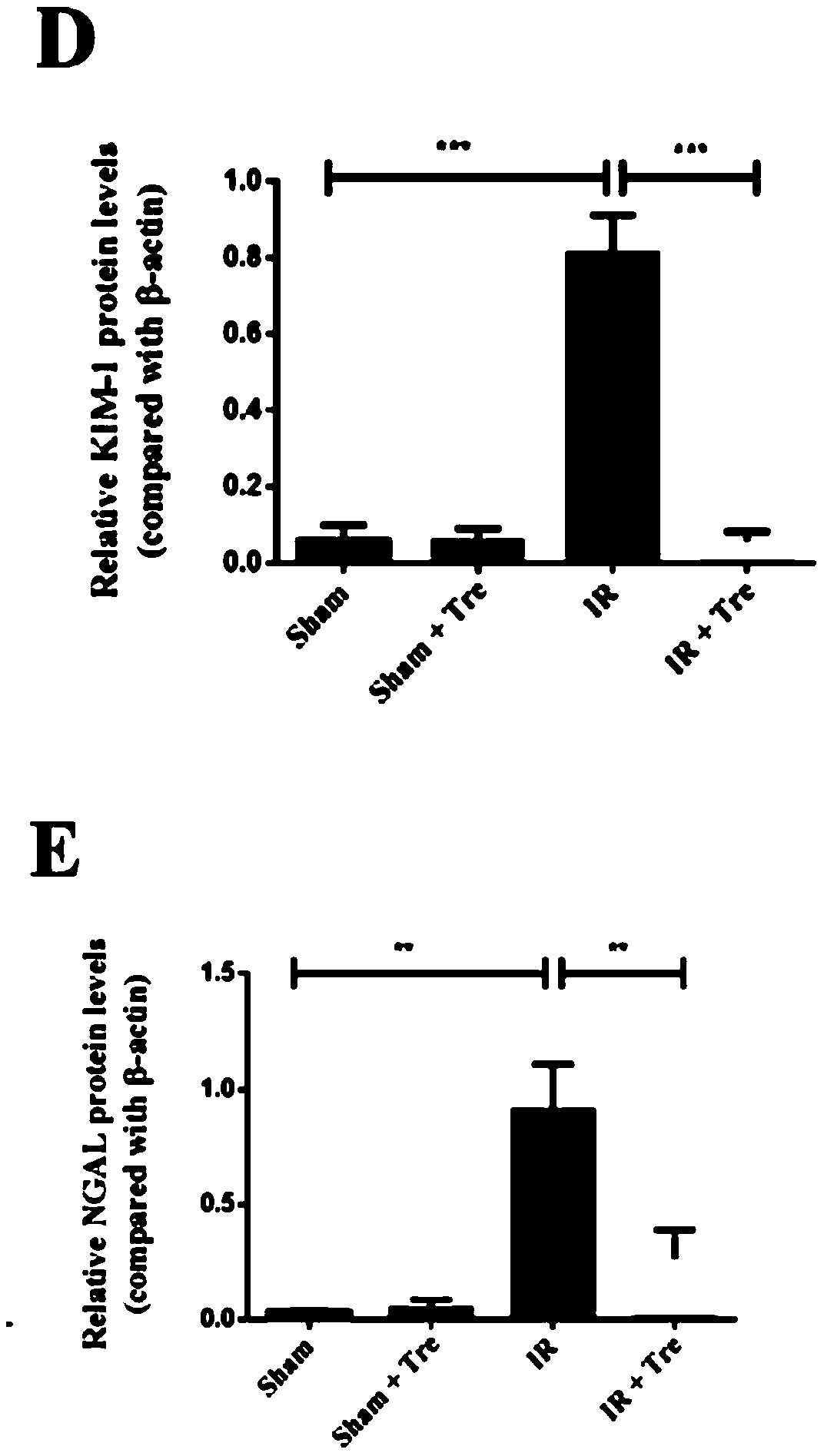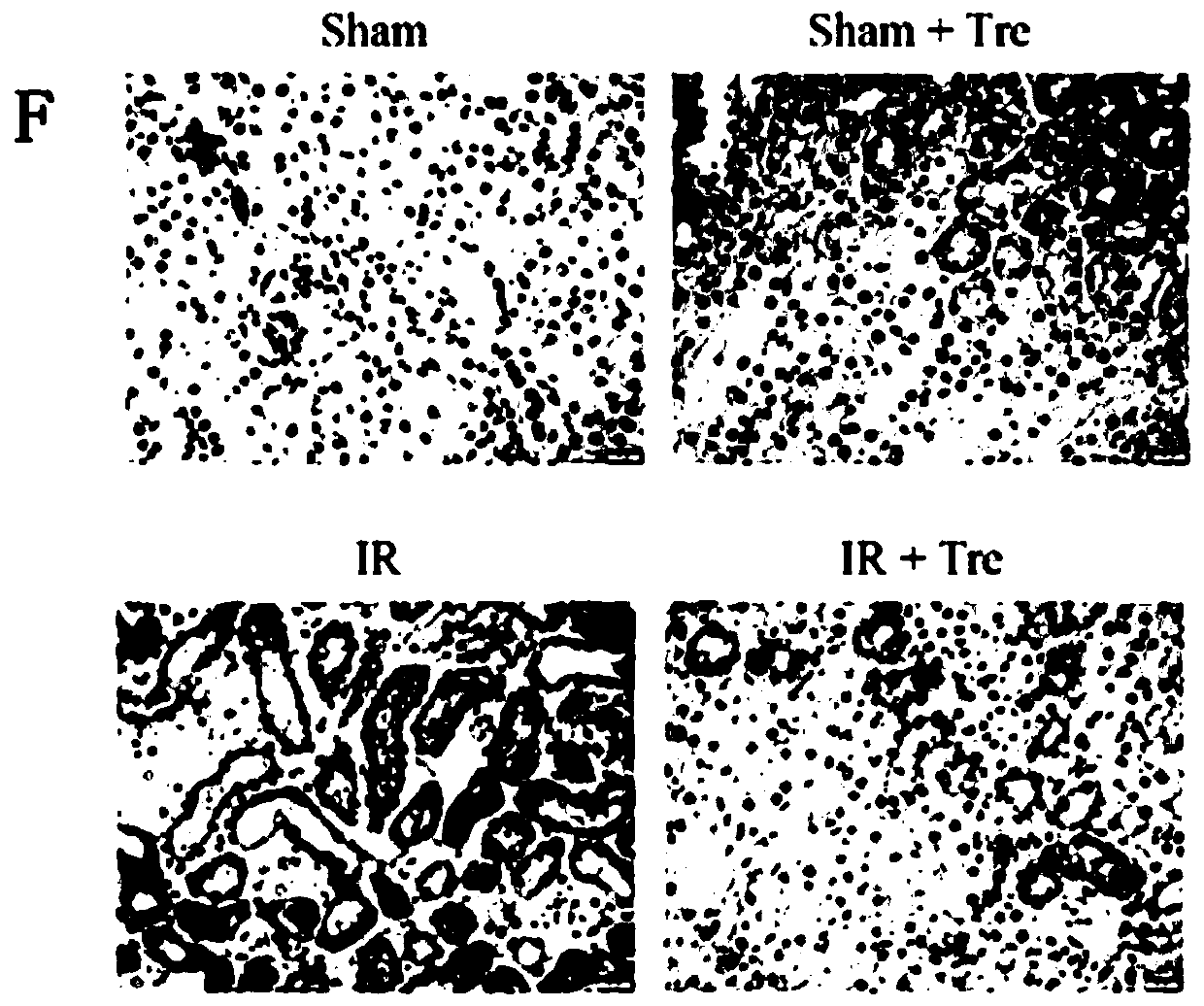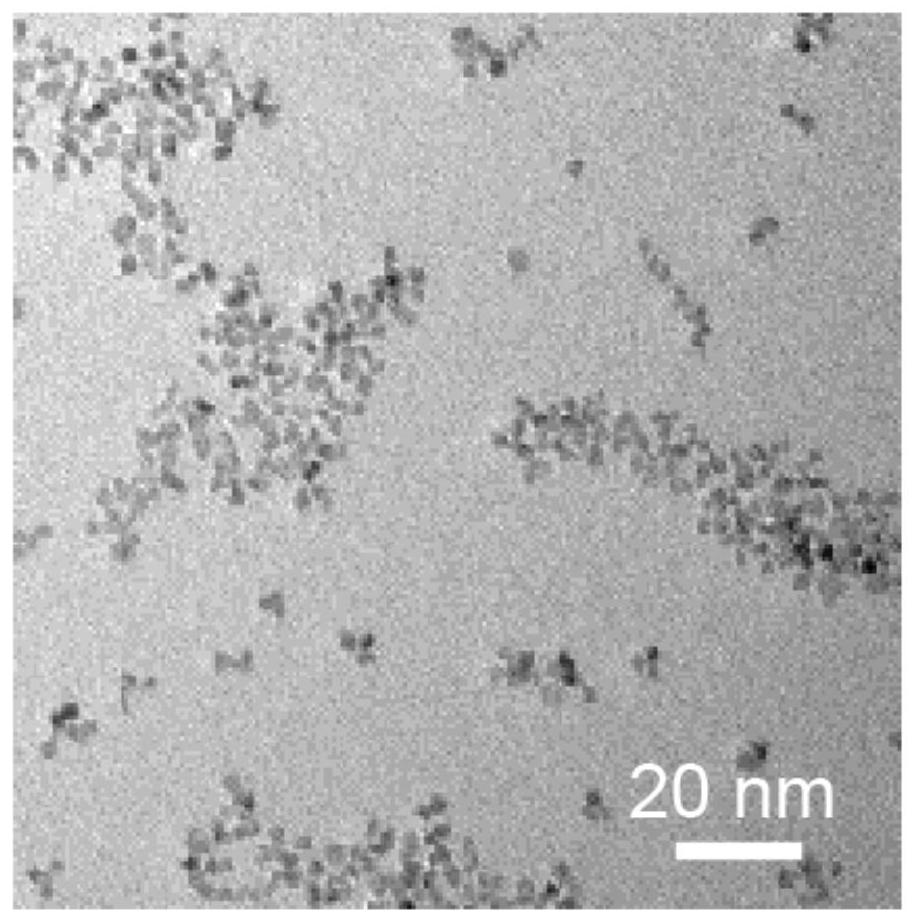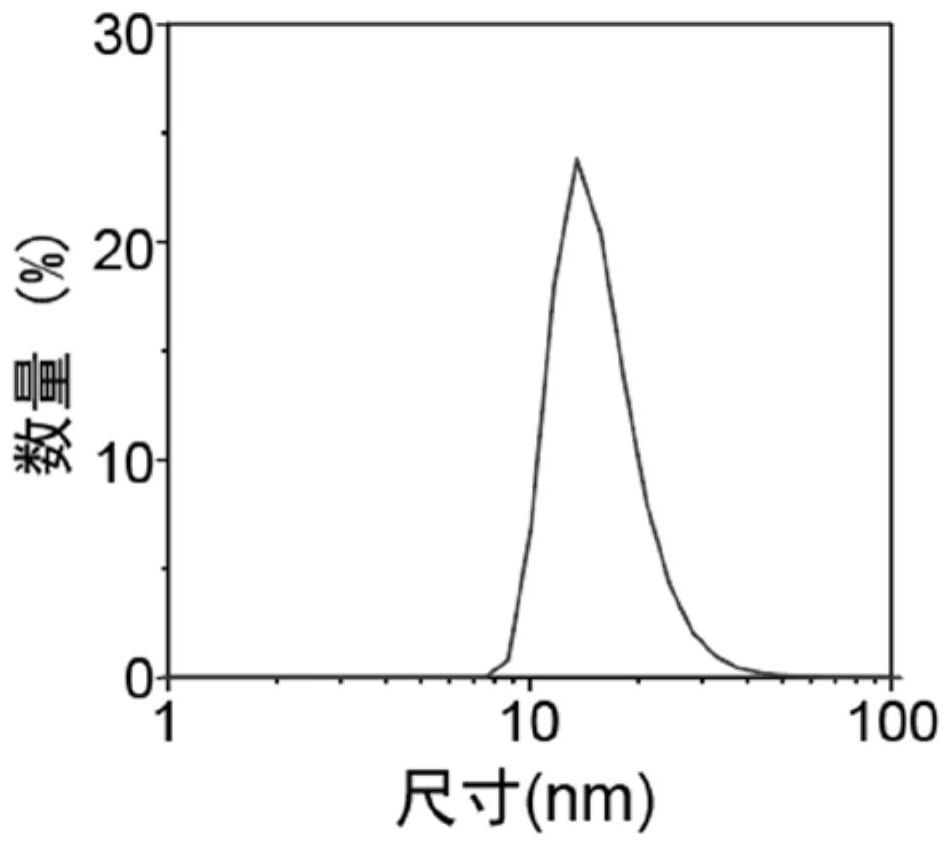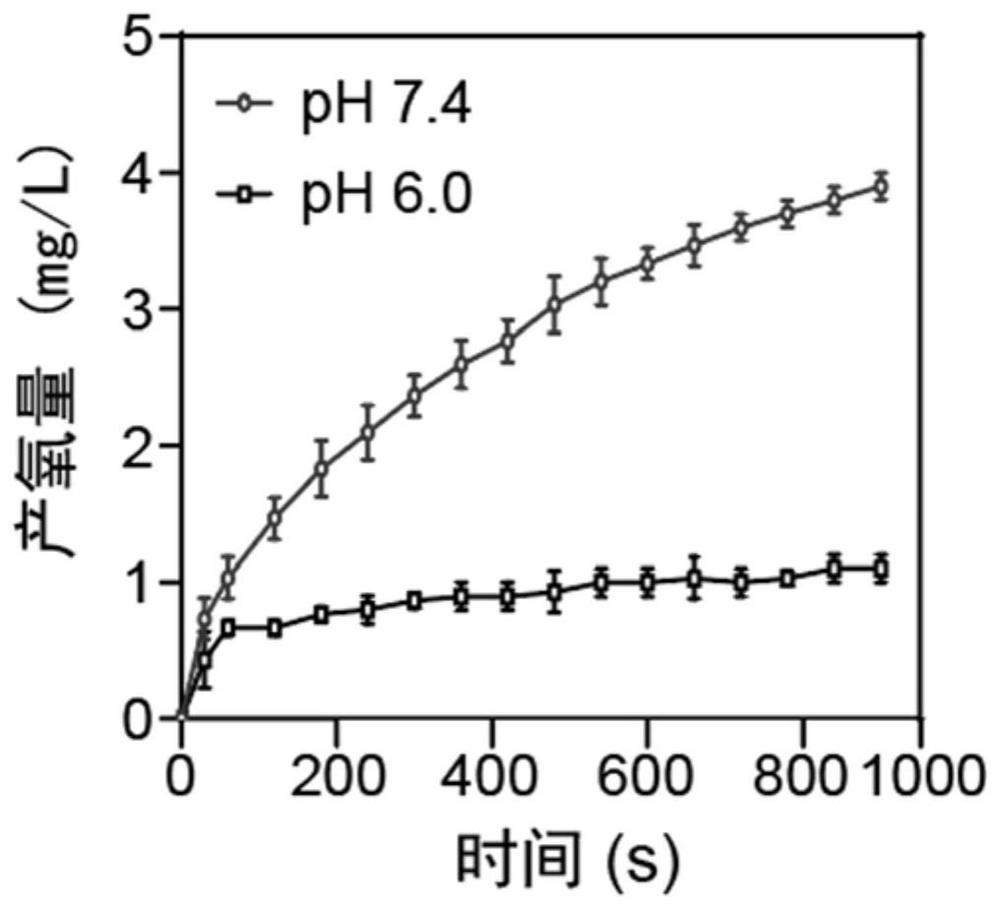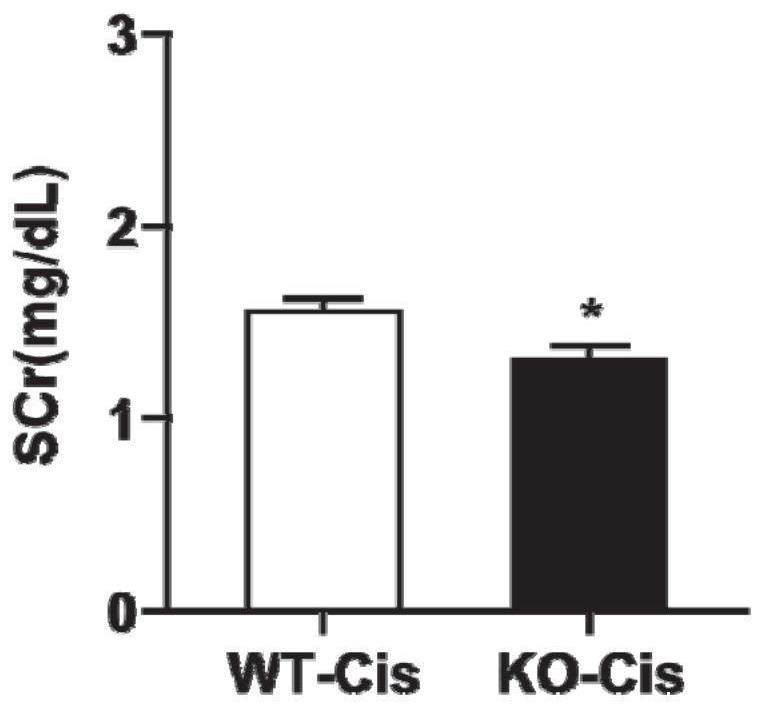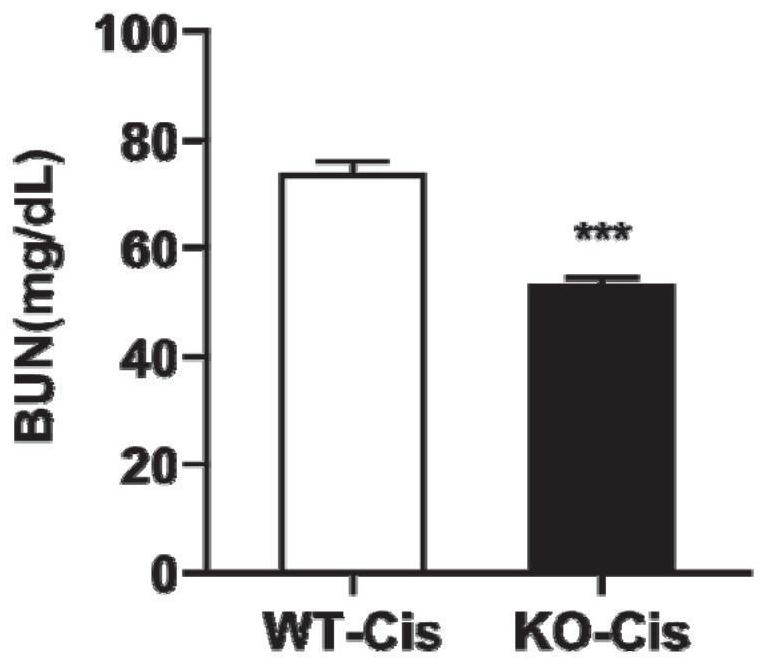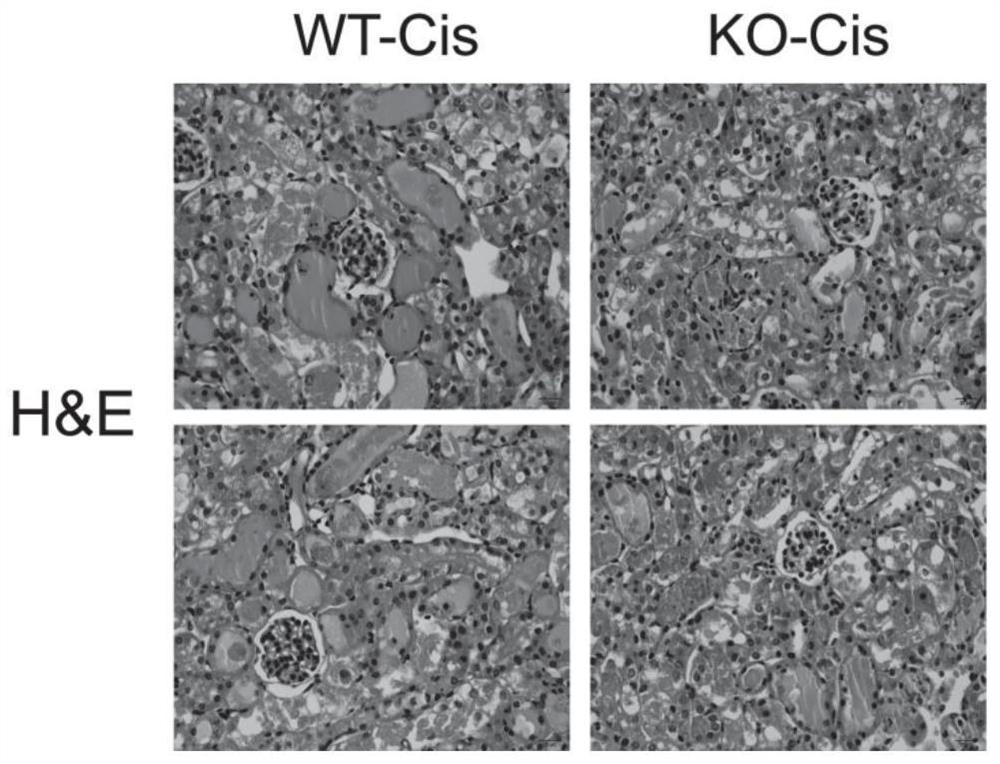Patents
Literature
195 results about "Acute Renal Injury" patented technology
Efficacy Topic
Property
Owner
Technical Advancement
Application Domain
Technology Topic
Technology Field Word
Patent Country/Region
Patent Type
Patent Status
Application Year
Inventor
Methods and compositions for diagnosis and prognosis of renal injury and renal failure
ActiveUS20110195429A1Eliminate needEasy to adaptDisease diagnosisBiological testingSoluble P-SelectinFactor ii
The present invention relates to methods and compositions for monitoring, diagnosis, prognosis, and determination of treatment regimens in subjects suffering from or suspected of having a renal injury. In particular, the invention relates to using assays that detect one or more markers selected from the group consisting of soluble p-selectin, protein NOV homolog, soluble epidermal growth factor receptor, netrin-4, haptoglobin, heat shock protein beta-1, alpha-1-antitrypsin, leukocyte elastase, soluble tumor necrosis factor receptor superfamily member 6, soluble tumor necrosis factor ligand superfamily member 6, soluble intercellular adhesion molecule 2, active caspase-3, and soluble platelet endothelial cell adhesion molecule as diagnostic and prognostic biomarkers in renal injuries.
Owner:ASTUTE MEDICAL
Acute renal injury
ActiveUS20090220526A1High risk of morbidityHigh risk of mortalityAnalysis using chemical indicatorsMicrobiological testing/measurementRenal ischemia reperfusionAcute Renal Injury
We disclose a new and useful biomarker for acute kidney injury (i.e., AKI), renal ischemia reperfusion injury (i.e., IRI), ischemic acute kidney injury, and / or ischemic acute tubular necrosis (i.e., ATN). The biomarker is GRO-alpha (i.e., CXCL1, chemokine C-X-C ligand 1, GRO1, GROa, MGSA, MGSA alpha, MGSA-a, NAP-3, SCYB1). We detected the biomarker using a QUANTIKINE® human GRO-alpha immunoassay (Cat. No. DGR00, R & D Systems, Minneapolis, Minn.). In addition, we disclose a method of treating lung damage.
Owner:THE JOHN HOPKINS UNIV SCHOOL OF MEDICINE
Urinary biomarkers for sensitive and specific detection of acute kidney injury in humans
InactiveUS20110287964A1Easy to distinguishIncrease concentrationMicrobiological testing/measurementLibrary screeningHigh concentrationBladder Infections
The present invention is directed to acute kidney injury biomarkers, and methods and kits comprising the use of agents directed against acute kidney injury biomarkers for facilitating and enhancing the diagnosis of AKI. The present invention is based on the discovery that specific biomarkers are present in urine at higher concentrations in subjects with acute kidney injury (AKI) as compared with subjects that have no symptoms of AKI. The invention is directed to methods for diagnosis of AKI by determining and monitoring the levels of at least one biomarker protein in a biological sample, such as urine. Further, the invention is directed to methods for facilitating the distinction of kidney infection from bladder infection in a subject.
Owner:THE BRIGHAM & WOMEN S HOSPITAL INC
Treatment systems and methods for renal-related diseases
InactiveUS20090306625A1Increase risk of injuryAccurate and reliableOrganic active ingredientsBalloon catheterDiseaseMain vessel
Systems and methods are provided for locally delivering specific prophylactic, regenerative, or therapeutic agents within the body of a patient. Systems and methods can involve direct delivery of prophylactic, regenerative, or therapeutic agents into branch blood vessels or body lumens from a main vessel or lumen, respectively, and in particular into renal arteries extending from an aorta in a patient. Drug infusion techniques encompass specific treatment and prevention regimes for renal diseases including, but not limited to, Acute Kidney Injury, Renal Cell Carcinoma, Polycystic Kidney Disease, and Chronic Kidney Disease.
Owner:ANGIODYNAMICS INC
Methods and compositions for diagnosis and prognosis of renal injury and renal failure
ActiveUS8778615B2Easy to adaptMicrobiological testing/measurementAntibody ingredientsInterleukin 10Soluble P-Selectin
The present invention relates to methods and compositions for monitoring, diagnosis, prognosis, and determination of treatment regimens in subjects suffering from or suspected of having a renal injury. In particular, the invention relates to using assays that detect one or more markers selected from the group consisting of Cytoplasmic aspartate aminotransferase, soluble Tumor necrosis factor receptor superfamily member 5, soluble CD40 Ligand, soluble C-X-C Motif chemokine 16, S100-A12, Eotaxin, soluble E-selectin, Fibronectin, Granulocyte colony-stimulating factor, Granulocyte-macrophage colony-stimulating factor, Heparin-binding growth factor 2, soluble Hepatocyte growth factor receptor, Interleukin-1 receptor antagonist, Interleukin-1 beta, Interleukin-10, Interleukin-15, Interleukin-3, Myeloperoxidase, Nidogen-1, soluble Oxidized low-density lipoprotein receptor 1, Pappalysin-1, soluble P-selectin glycoprotein ligand 1, Antileukoproteinase, soluble Kit ligand, Tissue inhibitor of metalloproteinase 1, Tissue inhibitor of metalloproteinase 2, soluble Tumor necrosis factor, soluble Vascular cell adhesion molecule 1, and Vascular endothelial growth factor A as diagnostic and prognostic biomarkers in renal injuries.
Owner:ASTUTE MEDICAL
Methods, Devices and Kits for Detecting or Monitoring Acute Kidney Injury
ActiveUS20110287455A1High sensitivityEasy to detectPeptide librariesChemiluminescene/bioluminescenceEpitopeGelatinase
Methods for detecting acute kidney injury in an individual comprise (a) contacting a body fluid sample from the individual with an assay device including neutrophil gelatinase-associated lipocalin (NGAL) antibody and a detectable label, to allow complexing of NGAL protein in the sample with NGAL antibody, and determining an amount of complex formed between NGAL protein from the sample and NGAL antibody in the assay device using the detectable label, wherein NGAL antibody in the device has binding capacity with more than two NGAL protein epitopes, and wherein the amount of the formed complex represents a level of acute kidney injury. Methods for determining an origin of NGAL protein in a sample from an individual include the step of determining relative amounts of monomeric, dimeric and heterodimeric forms of NGAL protein in the sample and allow improved diagnosis and therefore better targeted treatment.
Owner:FUTURE MEDICAL DIAGNOSTICS CO LTD
Prediction and recognition of acute kidney injury after surgery
Systems, kits, and methods for predicting the risk of an adverse event related to acute kidney injury AKI as a consequence of a surgical intervention in a subject. Embodiments of the system and methods include means and steps for determining an amount of liver-type fatty acid binding protein (L-FABP) in a sample, such as a urine-sample of a subject; comparing the amounts of the L-FABP with a reference amount, and predicting the risk of an adverse event related to acute kidney injury as a consequence of surgical intervention in the subject.
Owner:CMIC HLDG
Method for estimating risk of acute kidney injury
InactiveUS20110059537A1Reduce the possibilityReduce riskDisease diagnosisBiological testingCvd riskPathology
Methods and products for identifying subjects at risk of acute kidney injury (AKI) are provided according to the invention. Included, for instance, are diagnostic kits and methods involving the use of at least two AKI associated markers.
Owner:STEWARD RES & SPECIALTY PROJECTS
Methods and compositions for diagnosis and prognosis of renal injury and renal failure
InactiveUS20160146832A1Improve assessmentIncrease urine flowOrganic active ingredientsLibrary screeningRenal tubular functionRenal Failures
It is an object of the present invention to provide a combination of a functional assessment of renal function together with biomarker results in order to improve assessment of patient at risk of or having, an acute kidney injury. A loop diuretic such as furosemide inhibits luminal active chloride transport throughout the thick ascending limb of Henle, thereby preventing sodium reabsorption and resulting in natriuresis and increased urine flow. Loop diuretic-induced increases in urine output might be a method to assess the integrity of the renal tubular function in the setting of early AKI, and so a kidney's response, or lack thereof, to a diuretic challenge as a clinical assessment of tubular function can identify patients with severe tubular injury before it is clinically apparent (e.g. a rise in creatinine).
Owner:ASTUTE MEDICAL
Injection for curing acute lung injury and acute respirotary distress syndrome
The injection preparation for treating acute lung injury and acute respiratory distress syndrome is bacteria-free freeze dried powder for injection with Sivelestat as active component, stuffing frame agent, co-solvent and pH regulator. It has improved water solubility of Sivelestat and improved medicine stability.
Owner:HONGYI SCI & TECH CO LTD NANCHANG
Methods and compositions for assigning likelihood of acute kidney injury progression
InactiveUS20140315734A1Raise the possibilityImprovement of biomarker levelBioreactor/fermenter combinationsBiological substance pretreatmentsObject basedCore domain
The invention encompasses diagnosis and prognosis in the context of heart or renal failure, particularly in subjects who exhibit a normal body fluid level of a natriuretic peptide. The invention also relates to methods of assigning an increased likelihood that a subject having AKI is susceptible to AKI progression. The invention relates in part to assigning a diagnosis of heart and / or renal failure, and / or an outcome risk (e.g., worsening cardiac and / or renal function or a mortality risk) to a subject based, at least in part, on the result(s) obtained from an assay that detects WAP four-disulfide core domain protein 2 performed on a body fluid sample obtained from a subject.
Owner:ALERE SAN DIEGO INC
Method for building animal model with PHF 14 gene knockout-based acute kidney injury and renal fibrosis after injury
ActiveCN105664179ANot lethalGuaranteed interferenceCompounds screening/testingUrinary disorderAdult stageLiver and kidney
The invention relates to the technical field of animal models and concretely, relates to a method for building an animal model with PHF 14 gene knockout-based acute kidney injury and renal fibrosis after injury. The invention builds a model of renal fibrosis after kidney injury under the genetic background of PHF 14 gene knockout under adult conditions and provides essential conditions for researching a use of a PHF 14 gene in fibrotic diseases. Compared with the existing PHF 14 knockout model, the PHF 14 gene knockout provided by the invention does not cause embryonic lethal. A test on adult-stage tamoxifen induced knockout of PHF 14 proves that the PHF 14 gene knockout does not cause embryonic lethal. Compared with a group without knockout, the group subjected to knockout has no substantial pathology of lung, liver and kidney. The method prevents systemic disease state-caused interference on following-up acute kidney injury model making and realizes individual research on use of the gene defect in renal fibrosis pathogenesis.
Owner:SECOND MILITARY MEDICAL UNIV OF THE PEOPLES LIBERATION ARMY
Nano-enzyme diagnosis and treatment agent for acute kidney injury as well as preparation method and application of nano-enzyme diagnosis and treatment agent
PendingCN112263686ASmall sizeGood treatment effectHeavy metal active ingredientsEchographic/ultrasound-imaging preparationsGlycerolTherapeutic effect
The invention discloses a nano-enzyme diagnosis and treatment agent for acute kidney injury as well as a preparation method and application of the nano-enzyme diagnosis and treatment agent. The nano-enzyme diagnosis and treatment agent comprises noble metal nano-particles and surface ligands combined on the surfaces of the noble metal nano-particles. The nano-enzyme diagnosis and treatment agent comprises a surface ligand and noble metal nanoparticles protected by the surface ligand. The nano-enzyme diagnosis and treatment agent disclosed by the invention has an ultra-small size, can be effectively enriched in the kidney of a mouse, can remove a large amount of active oxygen or active nitrogen in a renal canaliculus to relieve and treat acute kidney injury induced by glycerol or cis-platinum, and can be used as a contrast agent for computed tomography and photoacoustic imaging technologies. In addition, the nano-enzyme diagnosis and treatment agent has a good treatment effect and alsohas excellent biocompatibility and biosafety.
Owner:SHENZHEN UNIV
Acute kidney injury patient death rate prediction method, server and storage medium
PendingCN111508604AImprove accuracyAvoid clinical definitionsMedical data miningCharacter and pattern recognitionMortality rateAcute Renal Injury
The embodiment of the invention discloses an acute kidney injury patient death rate prediction method and device, a server and a storage medium. The method comprises the steps of generating medical feature data of a specific structure according to clinical medical data of a to-be-tested patient; and selecting a corresponding pre-trained random forest model according to the survival state and survival days of the to-be-tested patient, inputting the medical feature data of the to-be-tested patient into the corresponding pre-trained random forest model, and outputting the death rate of the to-be-tested patient. According to the technical scheme of the embodiment of the invention, the death rate of the acute kidney injury patient is predicted through the random forest model, the structured clinical data is used for training, and the logistic regression algorithm is used to calibrate the model, so that fuzzy clinical definition and data acquisition deviation are effectively avoided, and theaccuracy of predicting the death rate of the acute kidney injury patient is improved.
Owner:SHENZHEN UNIV
Method for distinguishing between kidney dysfunctions
ActiveUS7977110B2Addressing Insufficient SensitivitySufficient specificityMicrobiological testing/measurementDisease diagnosisMammalNGAL Protein
A method for distinguishing between kidney dysfunctions in a mammal, including pre-renal azotemia, an acute renal injury that may progress to acute renal failure, and chronic kidney disease, using a urinary or circulating NGAL assay result that is compared to a predetermined NGAL cutoff level, and a single serum or plasma creatinine measurement. Typically the single creatinine measurement cannot distinguish acute renal injury from chronic kidney disease or pre-renal azotemia, a single measurement of urinary NGAL, combined with the single serum or plasma creatinine measurement, has sufficient sensitivity and specificity to distinguish acute renal injury from normal function, prerenal azotemia, and chronic kidney disease and predicts poor inpatient outcomes. Patients admitted to the emergency department of the hospital with any of acute kidney injury, prerenal azotemia, chronic kidney disease, or even normal kidney function, can be evaluated based on the single measurements of urinary or circulating NGAL, and serum or plasma creatinine. Urinary NGAL level is highly predictive of clinical outcomes, including nephrology consultation, dialysis, and admission to the intensive care unit.
Owner:CHILDRENS HOSPITAL MEDICAL CENT CINCINNATI +1
Nano-enzyme diagnosis and treatment agent for acute kidney injury and preparation method and use of nano-enzyme diagnosis and treatment agent
PendingCN112516336ASmall sizePromote circulationHeavy metal active ingredientsGeneral/multifunctional contrast agentsGlycerolTherapeutic effect
The invention discloses a nano-enzyme diagnosis and treatment agent for acute kidney injury and a preparation method and use of nano-enzyme diagnosis and treatment agent. The nano-enzyme diagnosis andtreatment agent comprises Prussian blue nano-particles and surface ligands combined on surfaces of the Prussian blue nano-particles. The nano-enzyme diagnosis and treatment agent comprises the surface ligands (CS) and the Prussian blue nanoparticles (PB NZs) protected by the surface ligands. The nano-enzyme diagnosis and treatment agent has an ultra-small size, can be effectively enriched in thekidney of a mouse, can remove a large amount of active oxygen or active nitrogen in kidney tubules to relieve and treat acute kidney injury induced by glycerol or cis-platinum, and can be used as a contrast agent for nuclear magnetic resonance imaging and photoacoustic imaging technologies. In addition, the nano-enzyme diagnosis and treatment agent has a good treatment effect and also has excellent biocompatibility and biosafety.
Owner:SHENZHEN UNIV
Diagnostic use of individual molecular forms of a biomarker
InactiveUS20100304413A1Strong specificityDisease diagnosisImmunoglobulinsAcute Renal InjuryNGAL Protein
Methods are provided of diagnosing, monitoring or determining the severity of disease or injury by measuring individual molecular forms of neutrophil gelatinase-associated lipocalin (NGAL) in bodily fluids, including the diagnosis and monitoring of acute renal injury leading to acute renal failure in a human or mammalian subject by determining the concentration of the free monomer form of NGAL.
Owner:BIOPORTO DIAGNOSTICS AS
Method for distinguishing between kidney dysfunctions
ActiveUS20090298047A1Creatinine level is lowMicrobiological testing/measurementDisease diagnosisMammalNormal renal function
A method for distinguishing between kidney dysfunctions in a mammal, including pre-renal azotemia, an acute renal injury that may progress to acute renal failure, and chronic kidney disease, using a urinary or circulating NGAL assay result that is compared to a predetermined NGAL cutoff level, and a single serum or plasma creatinine measurement. Typically the single creatinine measurement cannot distinguish acute renal injury from chronic kidney disease or pre-renal azotemia, a single measurement of urinary NGAL, combined with the single serum or plasma creatinine measurement, has sufficient sensitivity and specificity to distinguish acute renal injury from normal function, prerenal azotemia, and chronic kidney disease and predicts poor inpatient outcomes. Patients admitted to the emergency department of the hospital with any of acute kidney injury, prerenal azotemia, chronic kidney disease, or even normal kidney function, can be evaluated based on the single measurements of urinary or circulating NGAL, and serum or plasma creatinine. Urinary NGAL level is highly predictive of clinical outcomes, including nephrology consultation, dialysis, and admission to the intensive care unit.
Owner:CHILDRENS HOSPITAL MEDICAL CENT CINCINNATI +1
Compositions and methods to prevent and repair acute kidney injury
ActiveCN107405381APeptide/protein ingredientsImmunoglobulins against animals/humansAcute Renal InjuryCell membrane
Disclosed herein are compositions and methods for repairing cell membranes. In particular, the description provides compositions and methods comprising MG53, a member of the TRIM-family of proteins, in the repair of kidney injury and its therapeutic use in the prevention and treatment of kidney injury.
Owner:RUTGERS THE STATE UNIV +1
Method for monitoring, diagnosis and/or prognosis of acute kidney injury in early stage
InactiveCN103917869APeptide/protein ingredientsMicrobiological testing/measurementAcute Renal InjuryExosome
The present invention relates to a method and a kit for monitoring, diagnosis, prognosis of acute kidney injury in early stage and determination of treatment in subjects suffering thereof. The method comprises the steps of a) providing a urine sample; b) enriching the urine sample in exosomes present in the urine sample using at least one step of immunopurification; c) detecting an acute kidney injury (AKI) marker in the exosome.
Owner:UNIV DE LOS ANDES
Novel application of condonpsis lanceolata extract in preparation of medicine and healthcare products for preventing renal injuries
InactiveCN106074661AEasy to getEasy to operateAntipyreticAnalgesicsInflammatory factorsCreatinine rise
The invention discloses application of condonpsis lanceolata extract in preparation of medicine for preventing cisplatin induced acute renal injuries and belongs to the field of medicine product research and development. The animal experiment research shows that compared with a model set, the condonpsis lanceolata extract can effectively reduce the content of creatinine (CRE), urea nitrogen (BUN), inflammatory factors (TNF-alpha) and interleukin 1beta (IL-1beta) in serum and malonaldehyde (MDA) in nephridial tissue; in addition, histopathology shows that the condonpsis lanceolata extract can reduce lesions of the nephridial tissue and reduce apoptosis of nephridial tissue cells; immunohistochemistry shows that the condonpsis lanceolata extract can effectively reduce expression of Bax and increase expression of Bcl-2. Thus, the condonpsis lanceolata extract and effective ingredients containing the extract can be prepared into the medicine or healthcare products for preventing acute renal injuries, the forms of the medicine or the healthcare products can be existing any dosage forms such as tablets, capsules, pills, soft capsules, granules and patches.
Owner:JILIN AGRICULTURAL UNIV
Use of NSC228155 in preparation of medicine for preventing and treating acute kidney injury
The invention discloses use of NSC228155 in the preparation of a medicine for preventing and treating acute kidney injury, and particularly relates to application of NSC228155 for treating acute renalinjury by protecting renal tubular epithelial cells. NSC228155 can improve the renal function of a cis-platinum-induced acute kidney injury mouse model, improve the pathological changes of acute renal tubular injury, reduce the apoptosis of mouse kidney tissue, reduce the inflammatory response of kidney tissue, and improve the cis-platinum-induced mitochondrial function and oxidative stress status of the mouse renal cortex tissues and renal tubular epithelial cells and protect renal tubular epithelial cells.
Owner:JIANGSU CANCER HOSPITAL
Acute kidney injury
The present invention relates to a method of predicting the severity of acute kidney injury following cardiac surgery.
Owner:NOVARTIS AG
Acute renal injury
ActiveUS7833732B2High riskLessen lung damageAnalysis using chemical indicatorsMicrobiological testing/measurementRenal ischemia reperfusionAcute Renal Injury
We disclose a new and useful biomarker for acute kidney injury (i.e., AKI), renal ischemia reperfusion injury (i.e., IRI), ischemic acute kidney injury, and / or ischemic acute tubular necrosis (i.e., ATN). The biomarker is GRO-alpha (i.e., CXCL1, chemokine C-X-C ligand 1, GRO1, GROa, MGSA, MGSA alpha, MGSA-a, NAP-3, SCYB1). We detected the biomarker using a QUANTIKINE® human GRO-alpha immunoassay (Cat. No. DGR00, R & D Systems, Minneapolis, Minn.). In addition, we disclose a method of treating lung damage.
Owner:THE JOHN HOPKINS UNIV SCHOOL OF MEDICINE
Application of benzenesulfonamide compound in preparation of medicine for treating acute kidney injury
ActiveCN113413381ALower levelReduce morphological damageOrganic active ingredientsUrinary disorderCisplatinRenal tissue
The invention discloses application of a benzenesulfonamide compound in preparation of a medicine for treating and / or preventing acute kidney injury. The structural formula of the benzenesulfonamide compound is shown in the specification. The acute kidney injury is cisplatin or kidney ischemia reperfusion induced acute kidney injury. Experiments show that through administration of the benzenesulfonamide compound, the levels of BUN and SCr in serum of a mouse with acute kidney injury can be remarkably reduced, and the renal tissue form injury of the mouse with acute kidney injury can be remarkably relieved. The benzenesulfonamide compound has very important value for clinical prevention and treatment of acute kidney injury.
Owner:XUZHOU MEDICAL UNIV
Early warning method and system for acute kidney injury after extracorporeal circulation cardiac surgery
InactiveCN113178243AFew influencing factorsGuaranteed specificityMedical simulationMechanical/radiation/invasive therapiesExtracorporeal circulationCirculation heart
The invention discloses an early warning method and system for acute kidney injury after extracorporeal circulation cardiac surgery. The early warning method comprises the steps: acquiring the preoperative age, the preoperative height, the urea nitrogen level value on the day of surgery and the urine ATF3 level value 12 hours after the surgery of a patient suffering from the extracorporeal circulation cardiac surgery; carrying out dimension normalization on the age before operation, the height before operation, the urea nitrogen level value on the day of operation and the urine ATF3 level value 12 hours after operation; taking the normalized preoperative age, the normalized preoperative height, the normalized urea nitrogen level value on the day of the operation and the normalized urine ATF3 level value 12 hours after the operation as variables, and establishing a disease prediction model of the cardiac postoperative acute kidney injury; and calculating and outputting the incidence prediction probability of the cardiac postoperative acute kidney injury. Independent risk factors (preoperative age, preoperative height, urea nitrogen level value on the day of operation and urine ATF3 level value of 12 hours after operation) of AKI are used as variables to construct an early warning model of acute kidney injury, and the prediction accuracy is high.
Owner:NANJING MEDICAL UNIV
Use of cardiotrophin-1 for the treatment of kidney diseases
The present invention relates to the use of cardiotrophin-1 (CT-1) for the prevention and / or treatment of acute renal injury, specially of acute kidney injury induced by nephrotoxic agents, such as contrast agents, antibiotics, immunosuppressive agents or antineoplastic agents. The invention is also related to compositions comprising said nephrotoxic agents and cardiotrophin-1.
Owner:DIGNA BIOTECH +1
Use of trehalose in preparation of medicament for alleviating ischemia-reperfusion-induced acute kidney injury-related disorders
InactiveCN111494407APromote apoptosisPromote infiltrationOrganic active ingredientsUrinary disorderDiseaseTrehalose
The invention provides application of trehalose in preparation of a medicine for relieving renal ischemia-reperfusion injury, and belongs to the field of biological medicines. The application proves that trehalose can alleviate ischemia-reperfusion induced acute kidney injury related diseases, including acute kidney injury renal function, oxidative stress, renal tubular cell apoptosis, renal inflammatory cell infiltration and the like, by enhancing autophagy, thereby providing a theoretical basis for widening the possible application range of trehalose. As trehalose has been approved to be a safe food component by American Food and Drug Administration at present and has been applied to food preservation and other work, it is found that effective clinical drugs are extremely likely to be provided for prevention and treatment of AKI.
Owner:NANJING CHILDRENS HOSPITAL
Application of phospholipid polyethylene glycol modified subminiature cerium oxide nano-enzyme in preparation of medicine for treating acute kidney injury
InactiveCN112274634AHigh biosecurityExtend systemic circulation timePeptide/protein ingredientsInorganic active ingredientsPolythylene glycolApoptosis
The invention discloses application of a phospholipid polyethylene glycol modified subminiature cerium oxide nano-enzyme in preparation of a medicine for treating acute kidney injury. The acute kidneyinjury is induced by cis-platinum when cis-platinum is used for treating solid cancer. The phospholipid polyethylene glycol modified subminiature cerium oxide nano-enzyme provided by the invention can present activities of various antioxidant mimic enzymes, can play an efficient catalase activity in a physiological environment, effectively reduces the ROS level by acting on an Nrf2 / Keap1 pathway,inhibits cell apoptosis, exerts important protection and treatment effects on acute kidney injury caused by cis-platinum, and is a more promising nanomaterial for low-toxicity anti-tumor applicationand development cis-platinum in clinical practice.
Owner:ZHEJIANG UNIV
Application of mPGES-2 as drug target for preventing and/or treating kidney diseases
ActiveCN113549687ALower levelReduce morphological damageMicrobiological testing/measurementOxidoreductasesDiseaseRenal tissue
The invention discloses an application of mPGES-2 as a drug target for preventing and / or treating kidney diseases. The invention proposes that the mPGES-2 is the cis-platinum-induced acute kidney injury drug target for the first time. Experiments show that mPGES-2 knockout can significantly reduce the levels of urea nitrogen and creatinine in the serum of a mouse with cis-platinum-induced acute kidney injury, significantly reduce the renal tissue form injury of the mouse with the cis-platinum-induced acute kidney injury and significantly improve the mitochondrial function in the kidneys of the mouse with acute kidney injury and reduce cell apoptosis. The results show that the cis-platinum-induced acute kidney injury can be reduced by mPGES-2 knockout, so that the mPGES-2 can be used as the target for preventing and / or treating the cis-platinum-induced acute kidney injury, and the mPGES-2 has very important significance on drug development and prevention and / or treatment of the diseases in the future.
Owner:XUZHOU MEDICAL UNIV
Features
- R&D
- Intellectual Property
- Life Sciences
- Materials
- Tech Scout
Why Patsnap Eureka
- Unparalleled Data Quality
- Higher Quality Content
- 60% Fewer Hallucinations
Social media
Patsnap Eureka Blog
Learn More Browse by: Latest US Patents, China's latest patents, Technical Efficacy Thesaurus, Application Domain, Technology Topic, Popular Technical Reports.
© 2025 PatSnap. All rights reserved.Legal|Privacy policy|Modern Slavery Act Transparency Statement|Sitemap|About US| Contact US: help@patsnap.com



